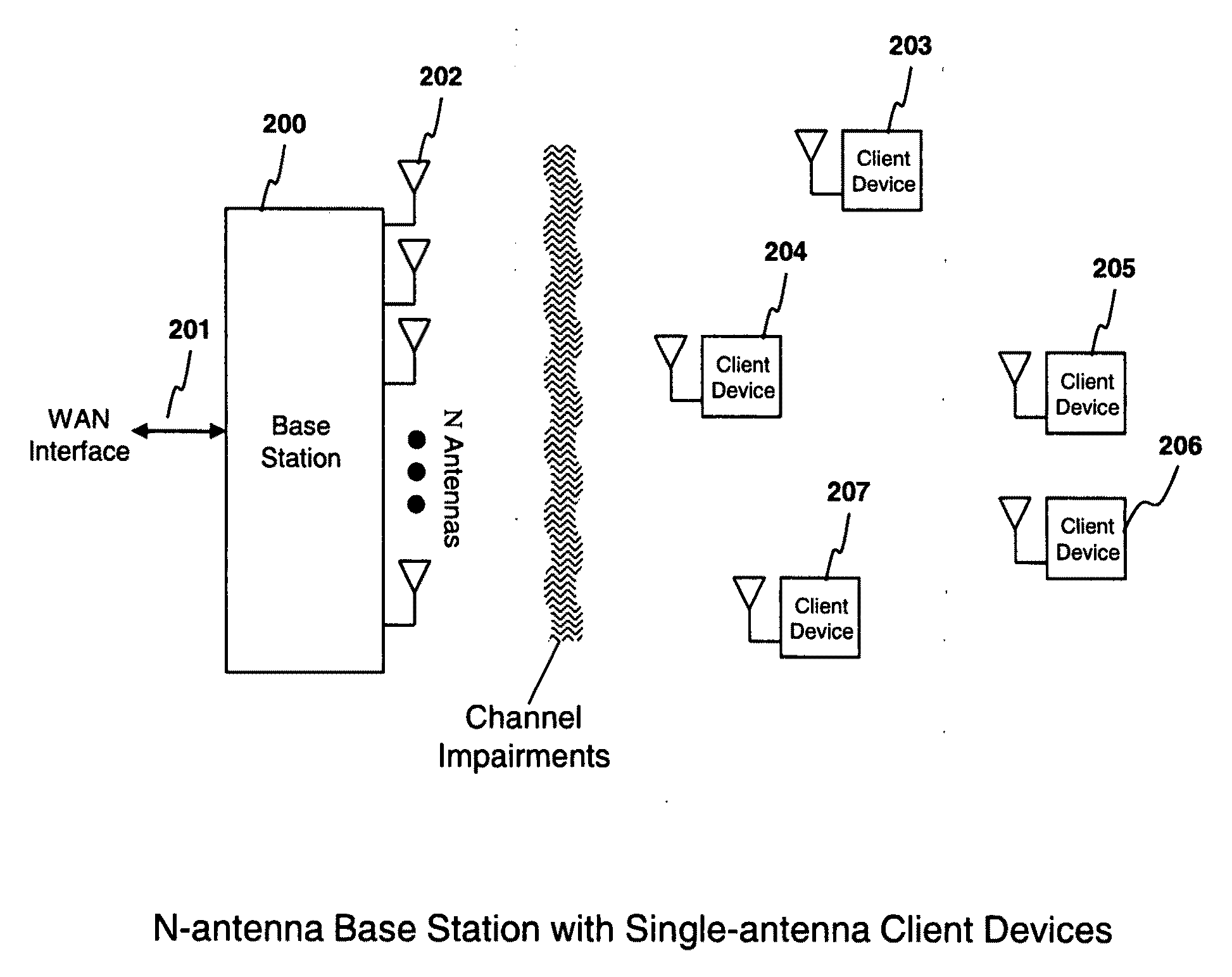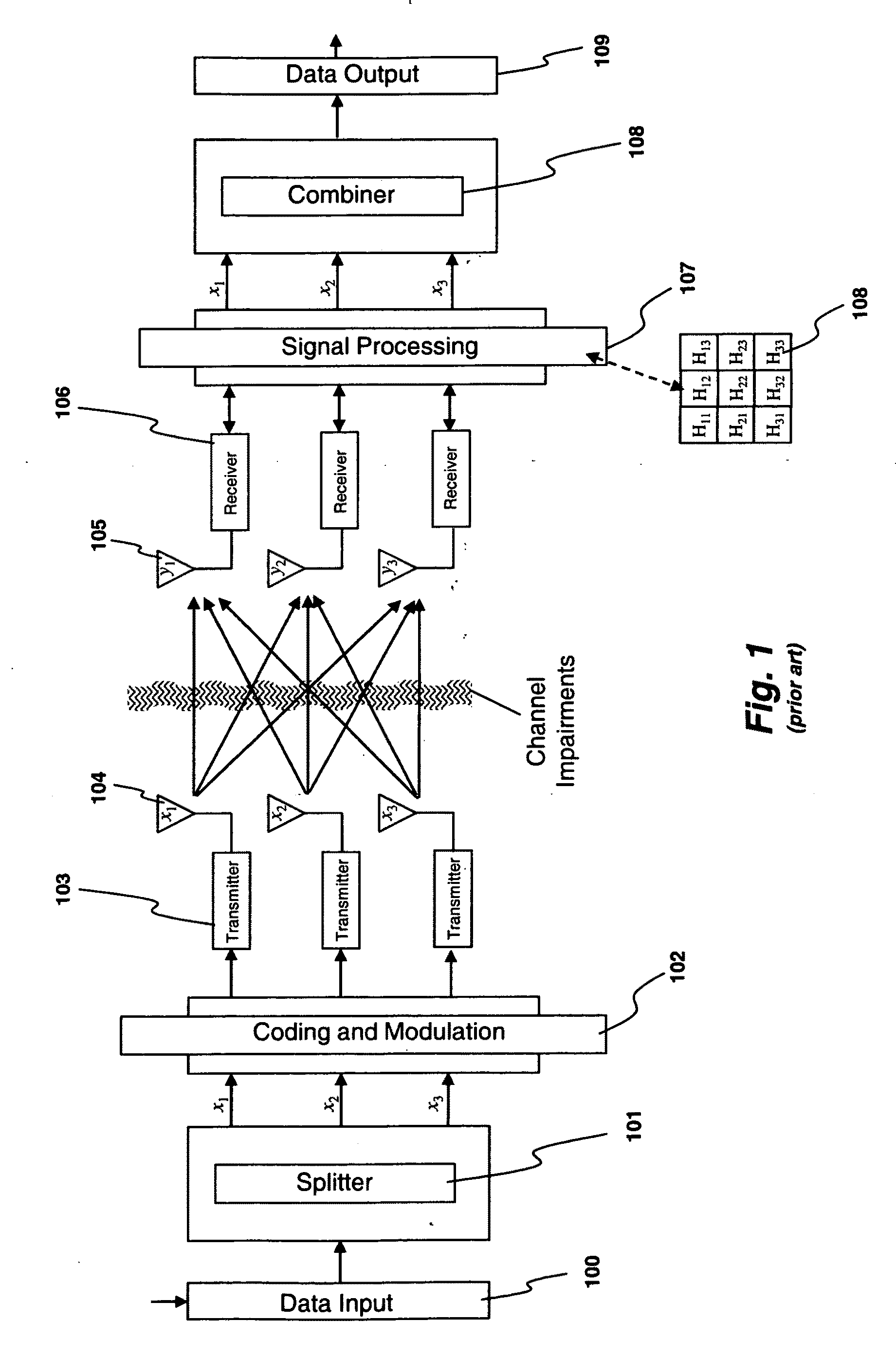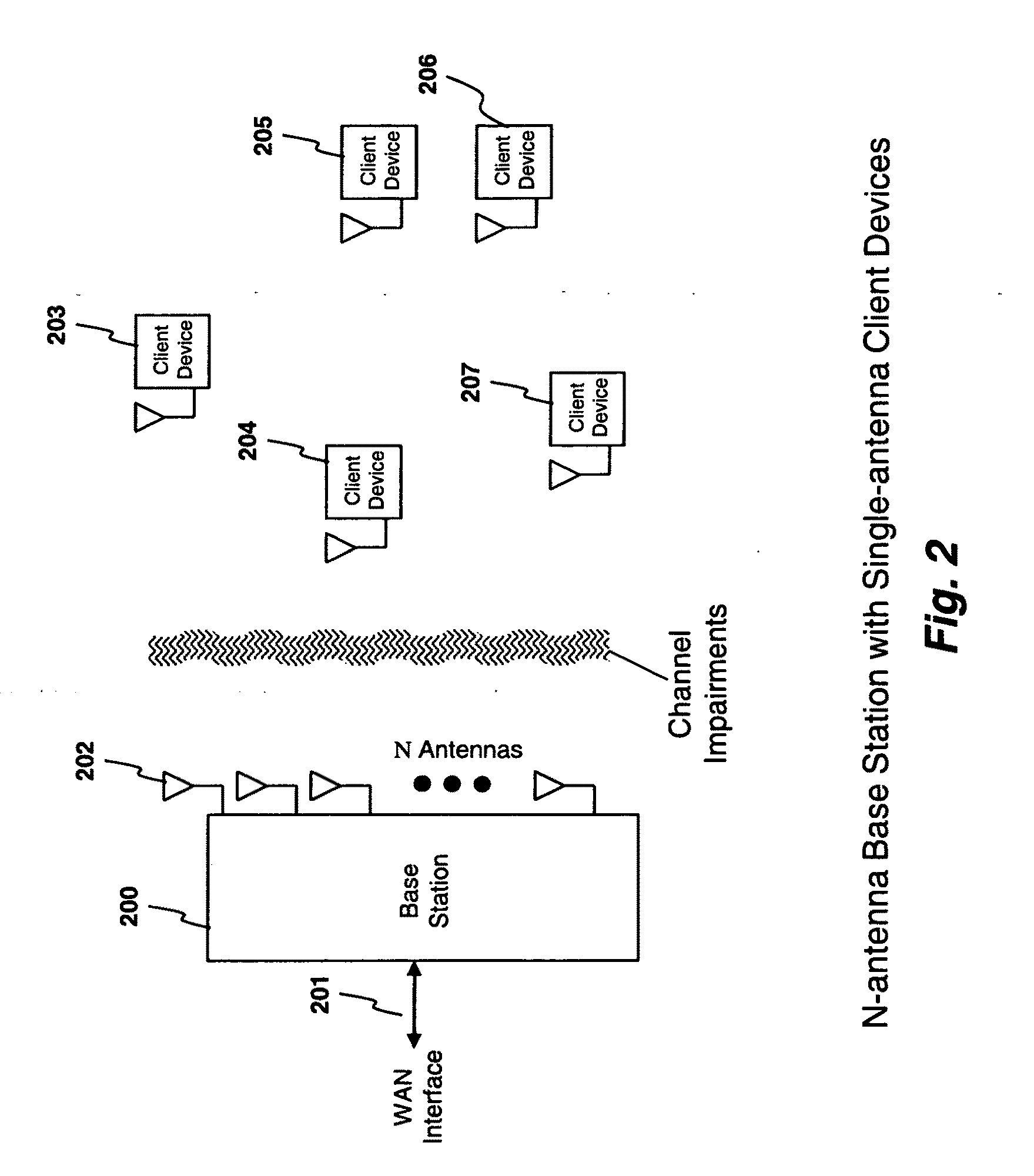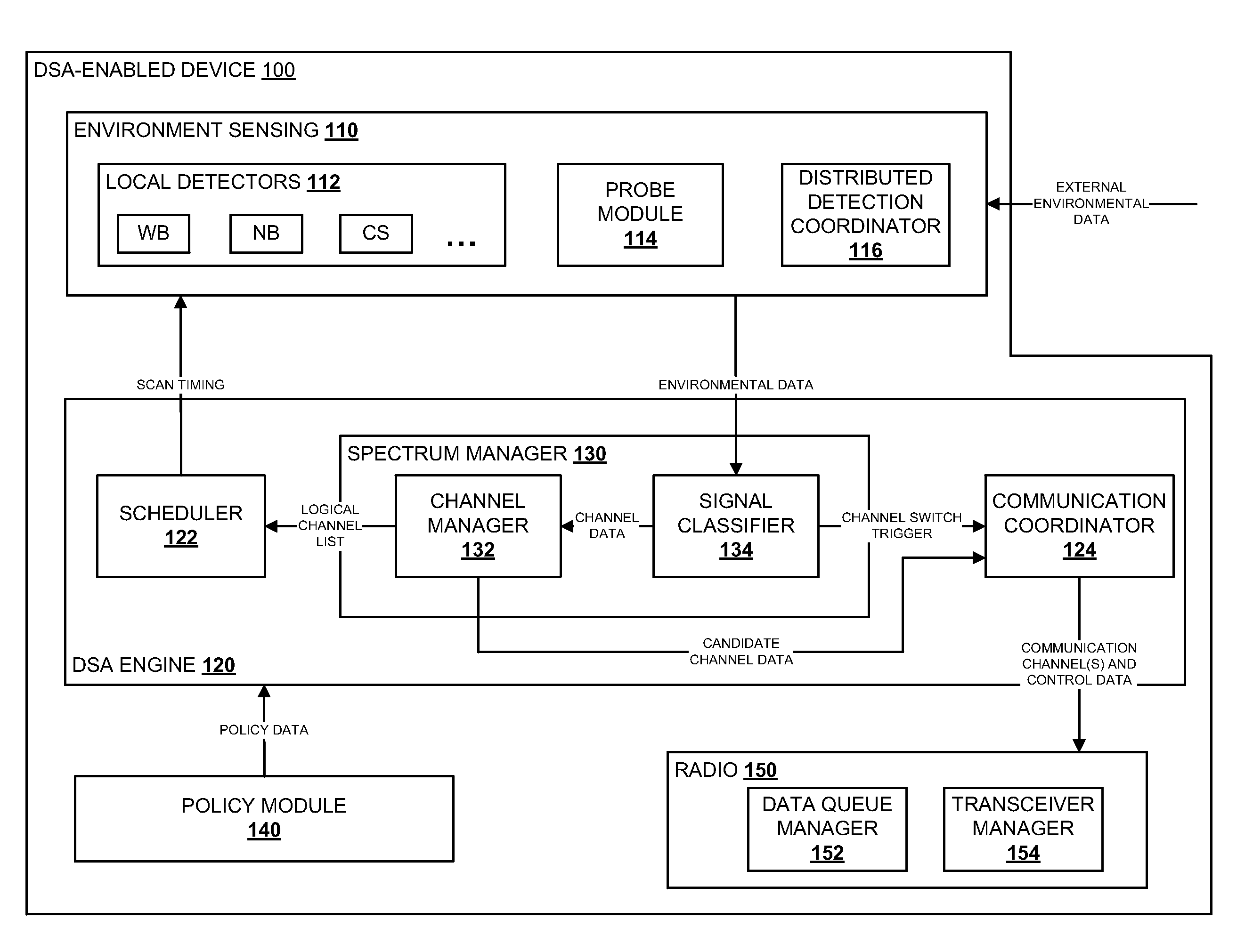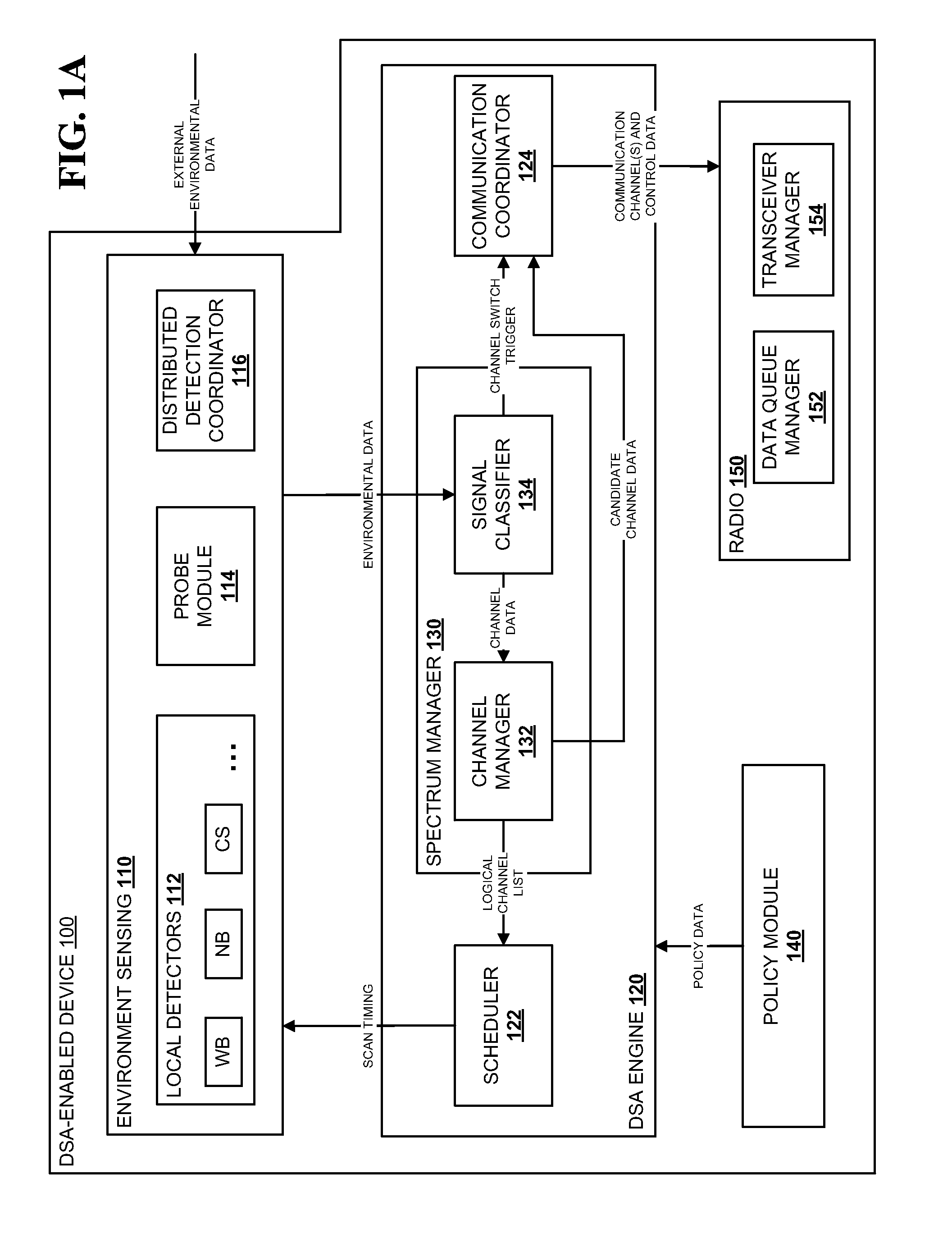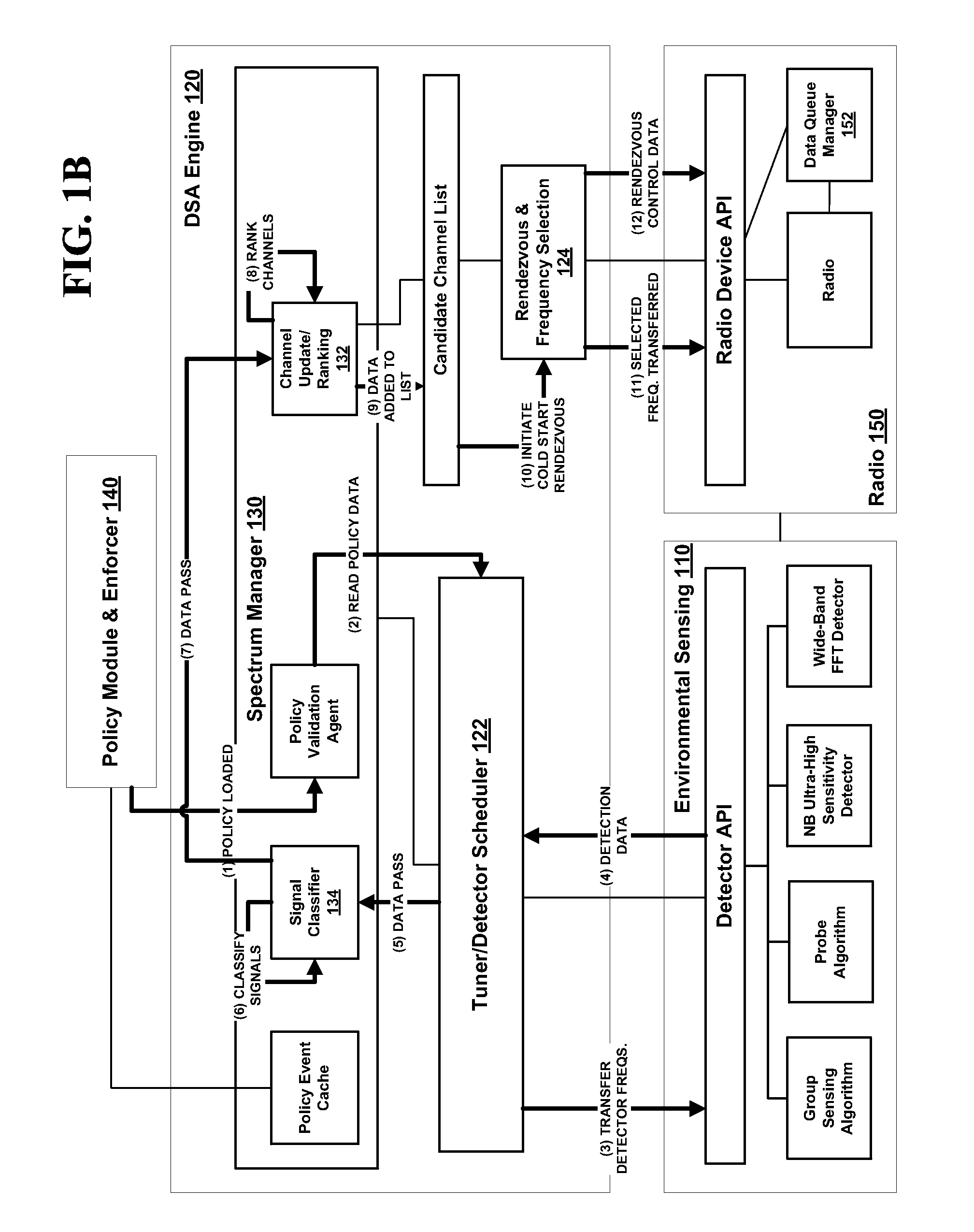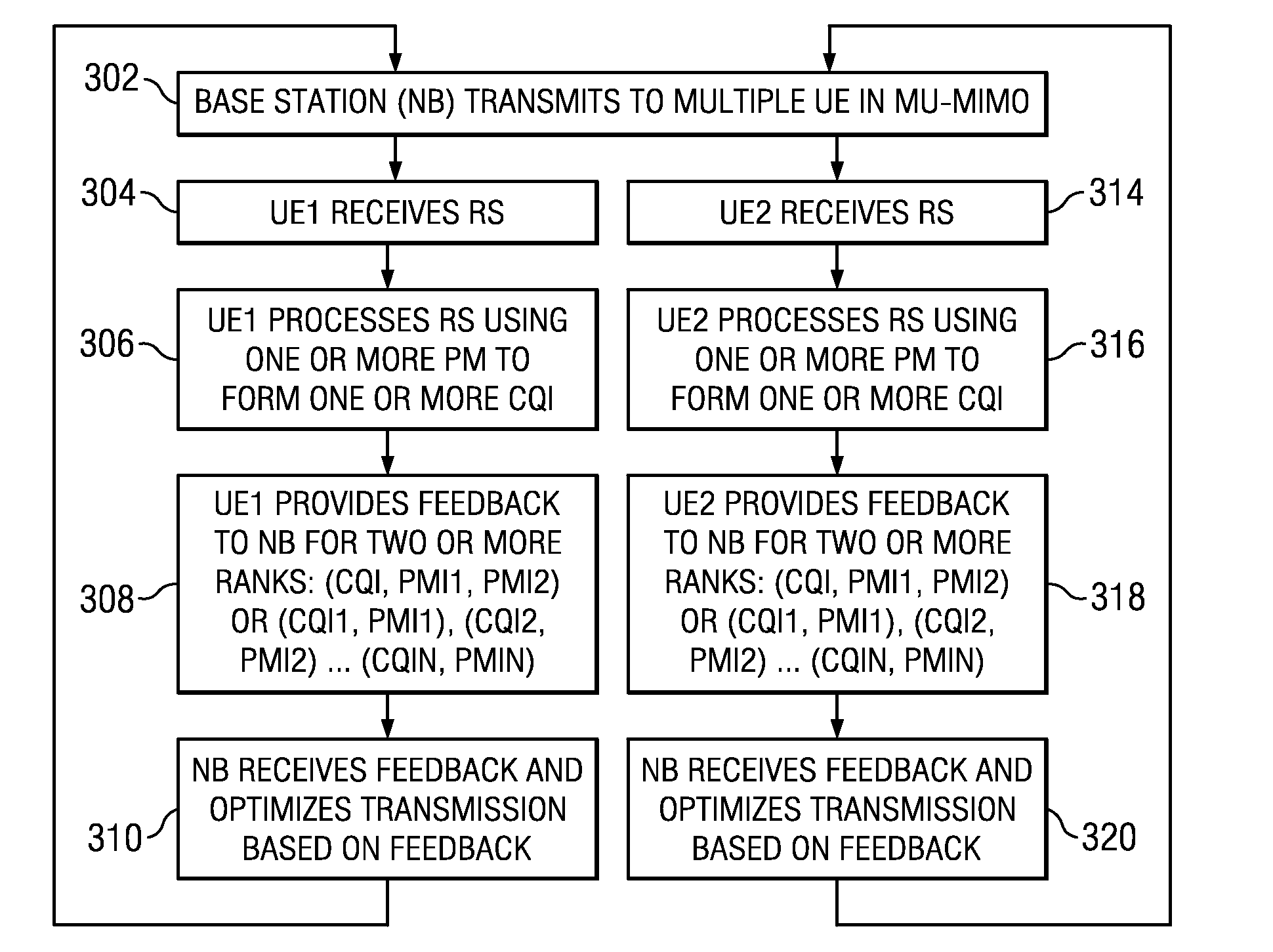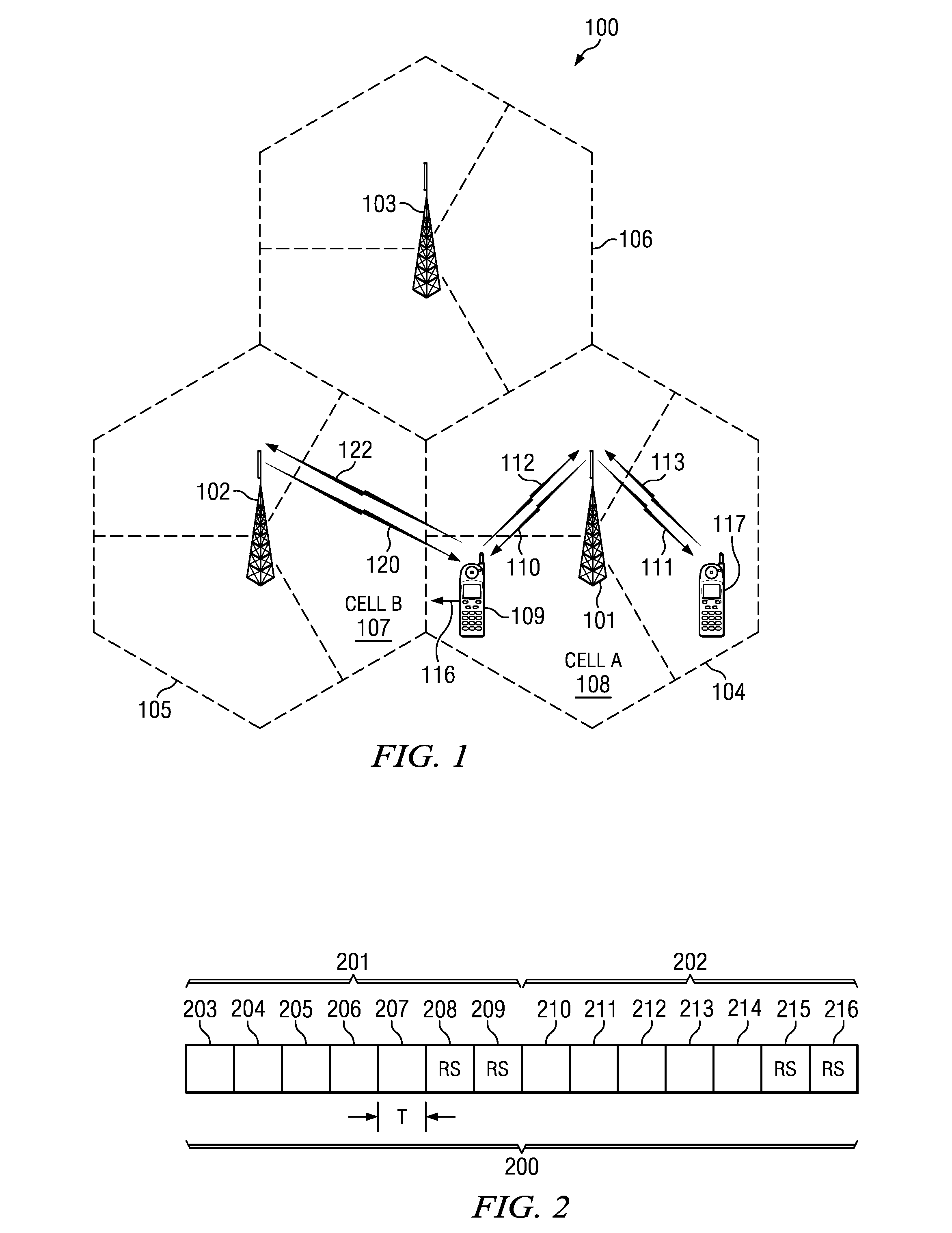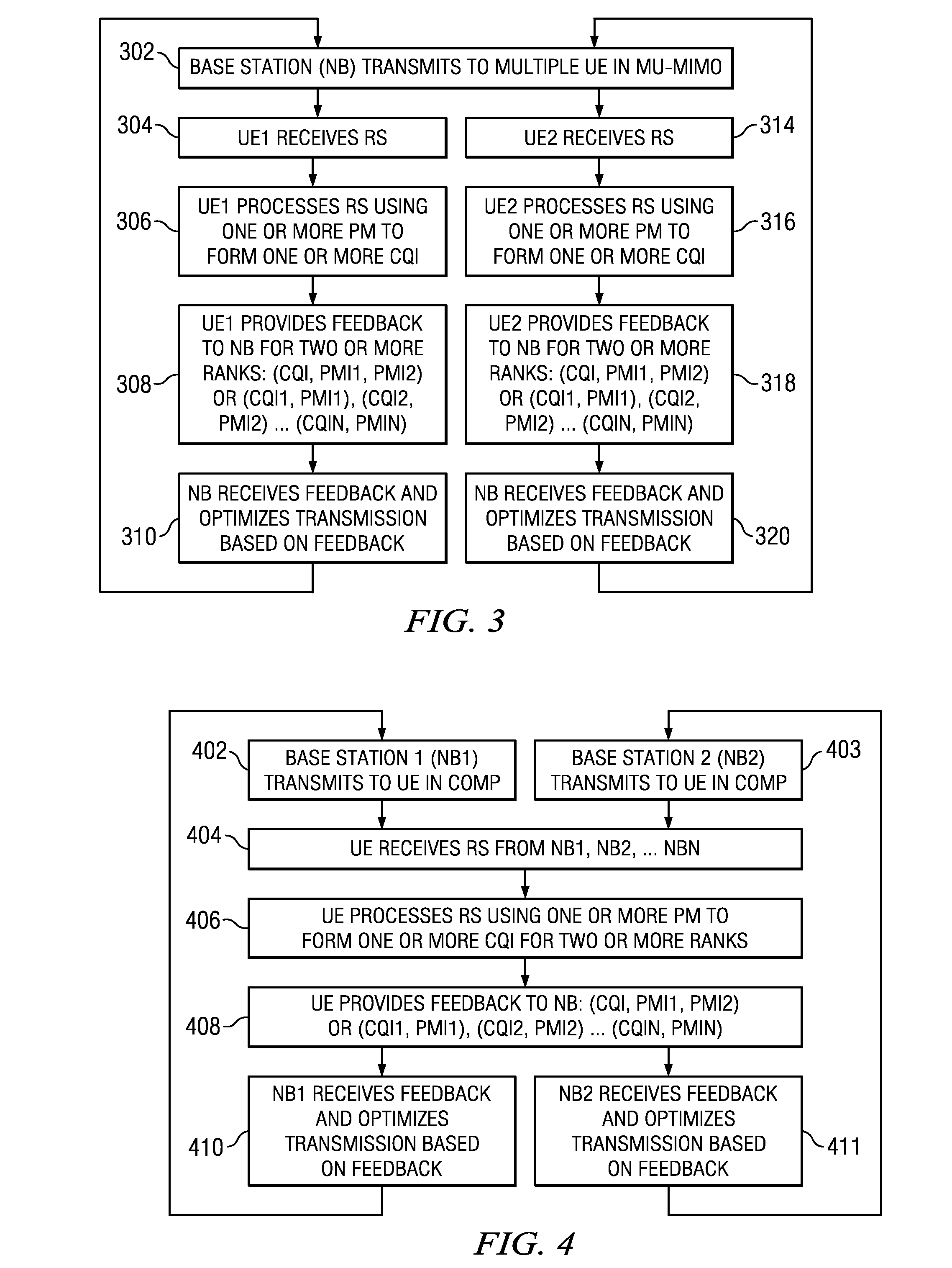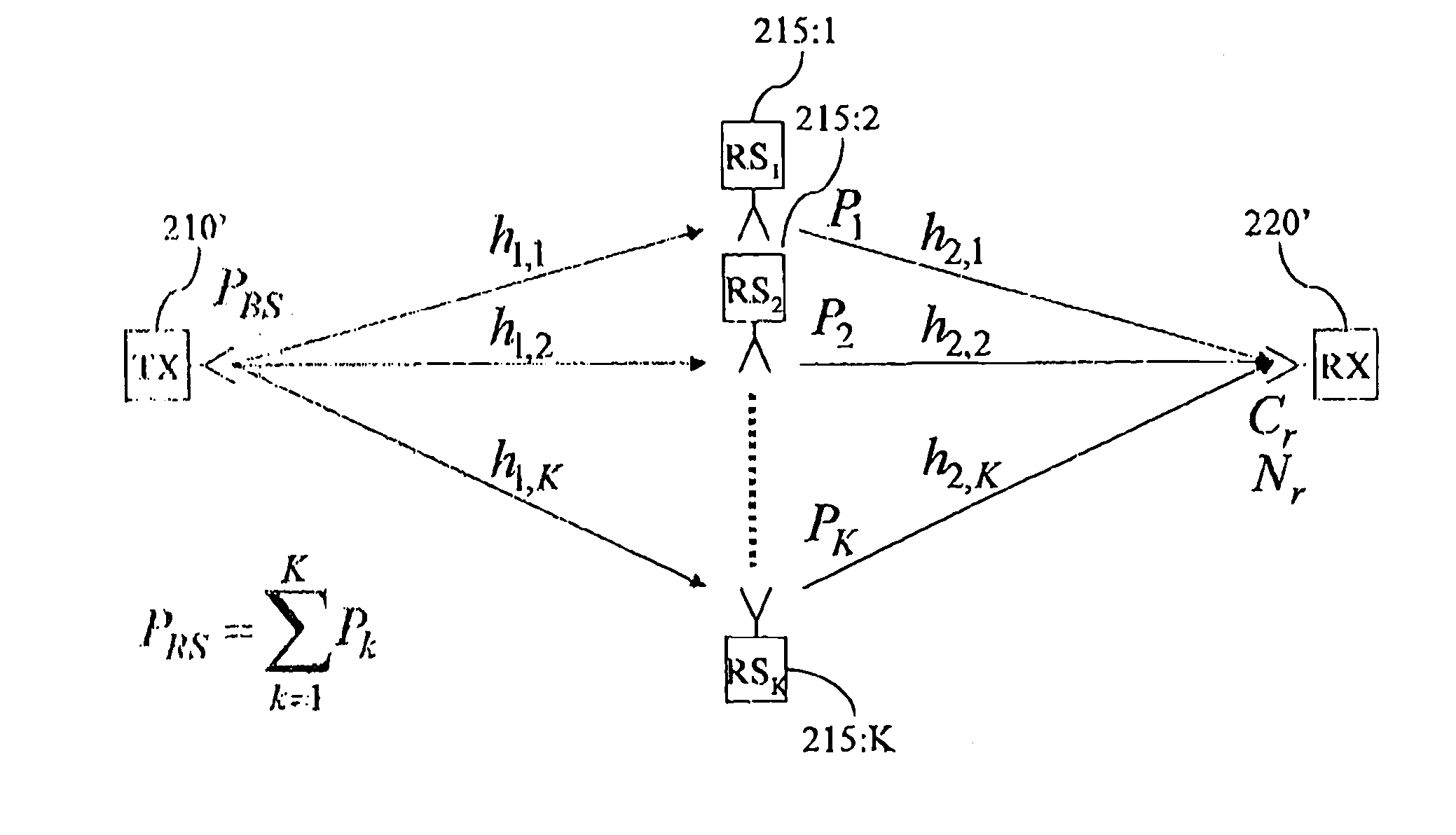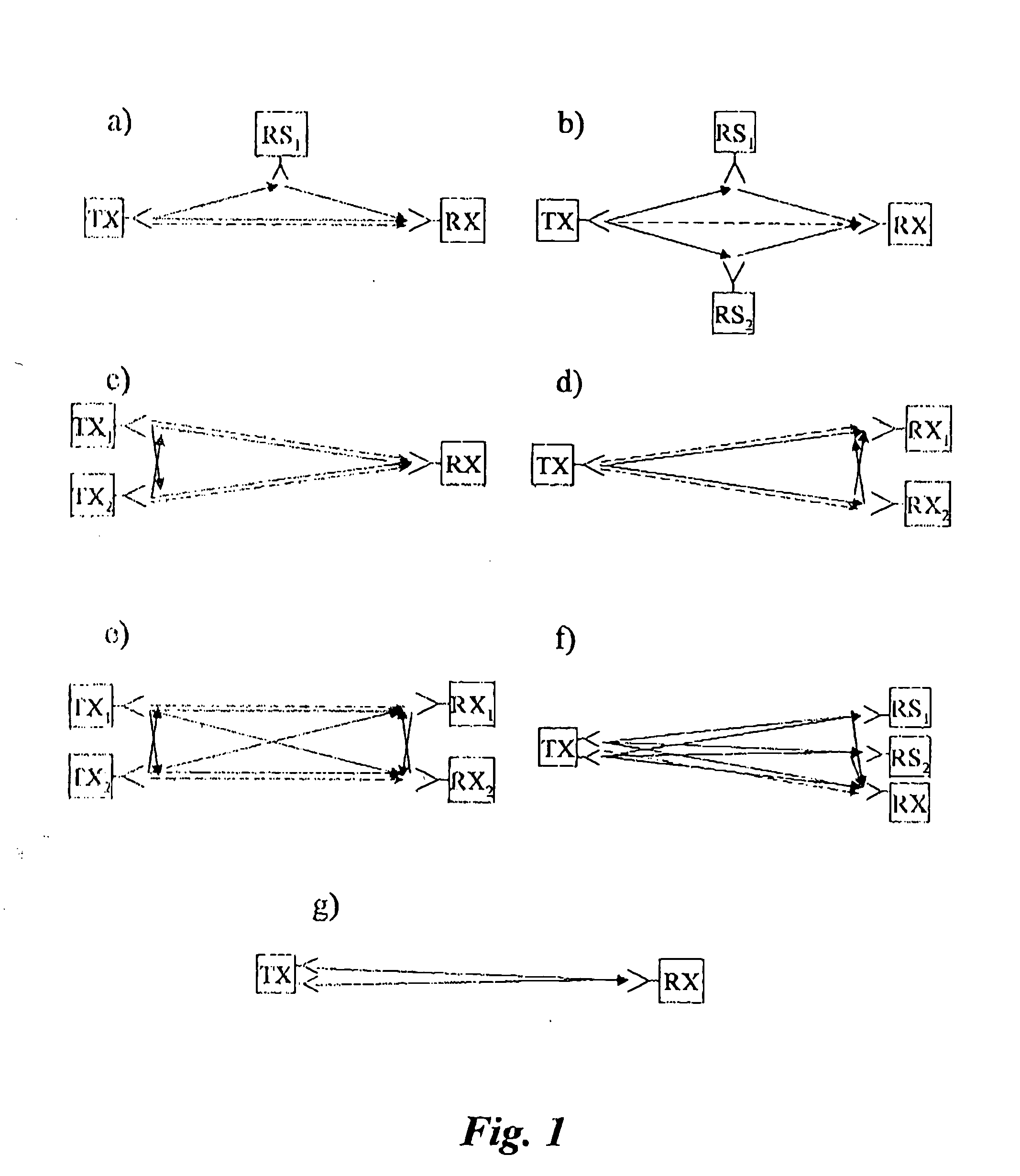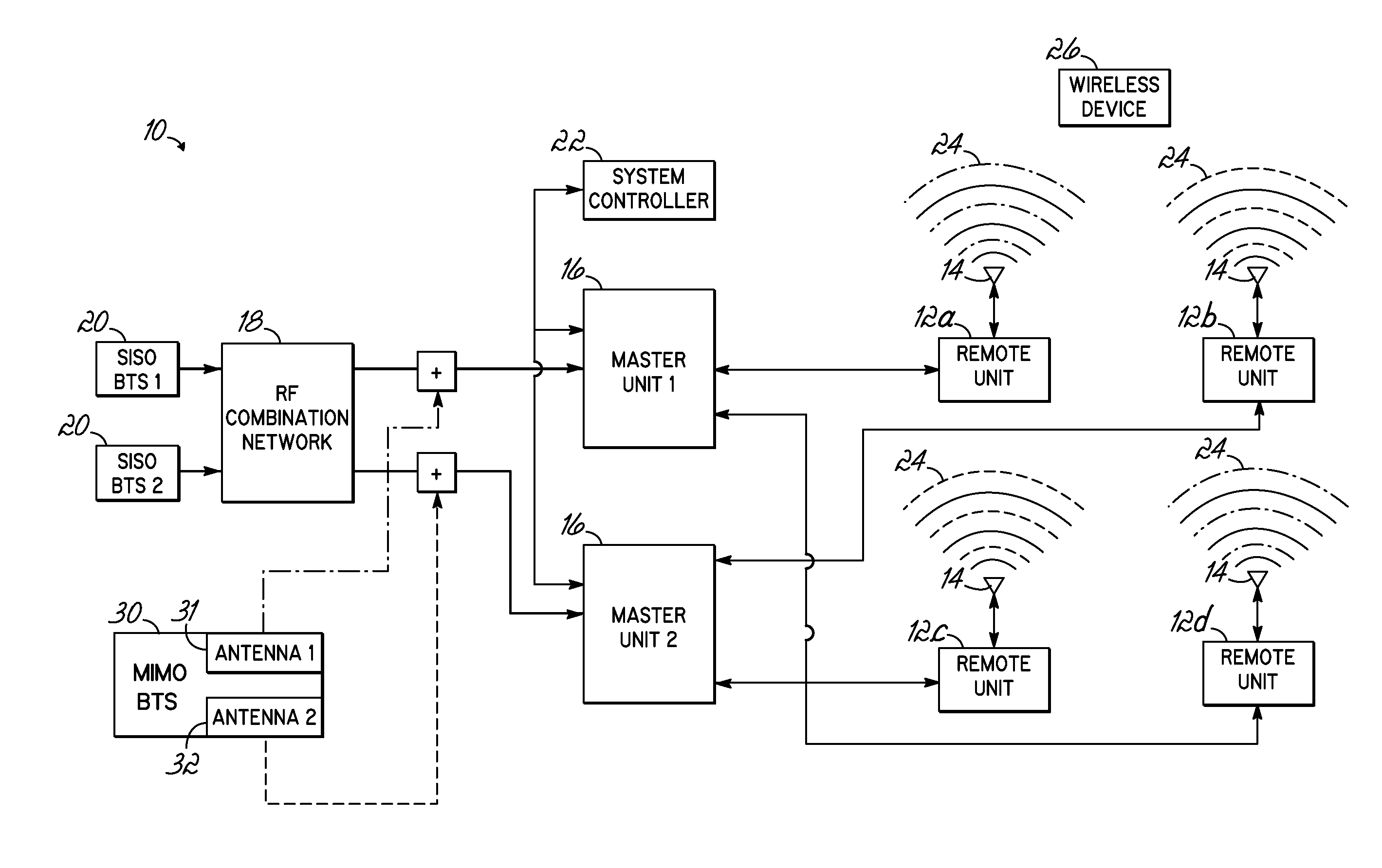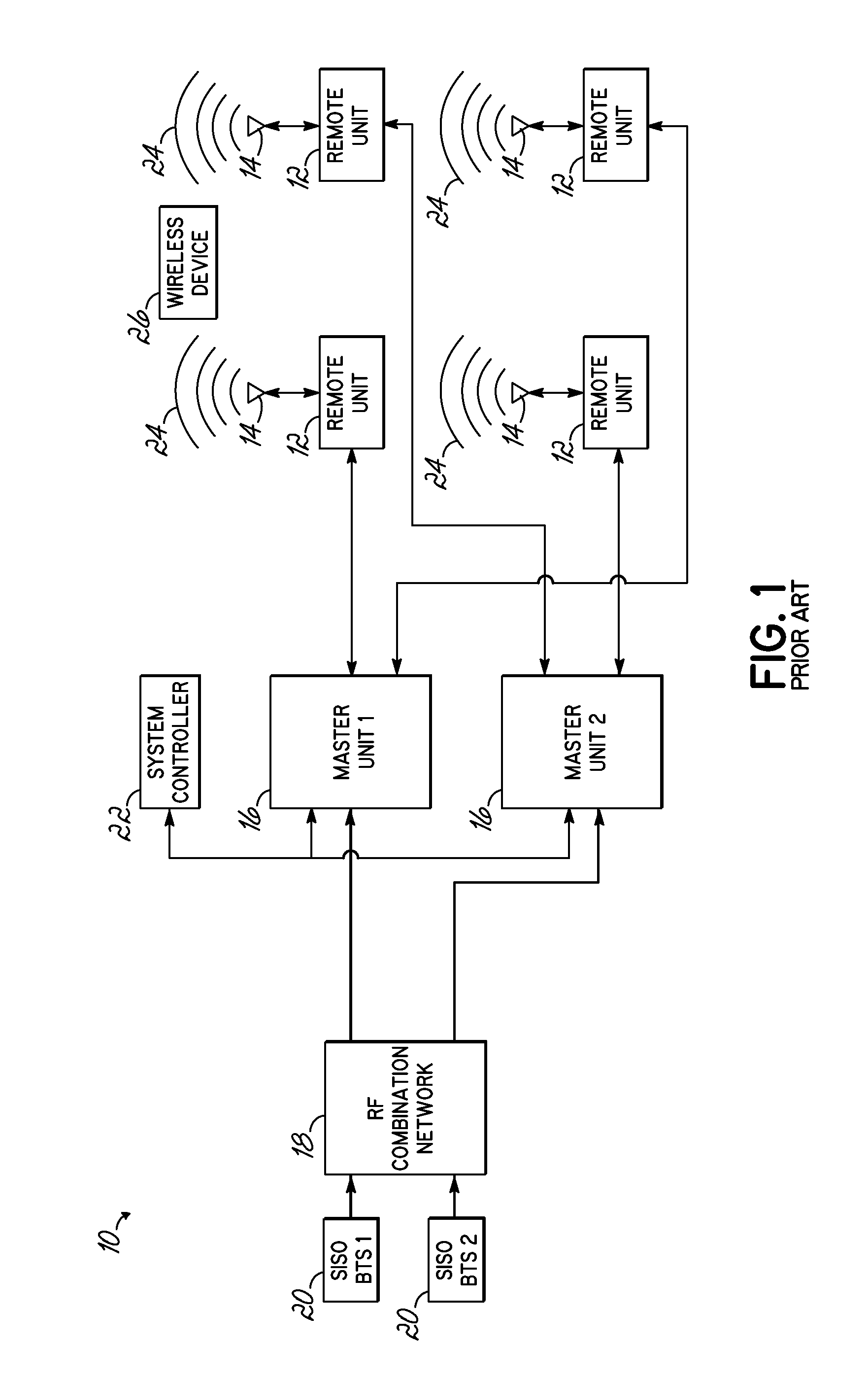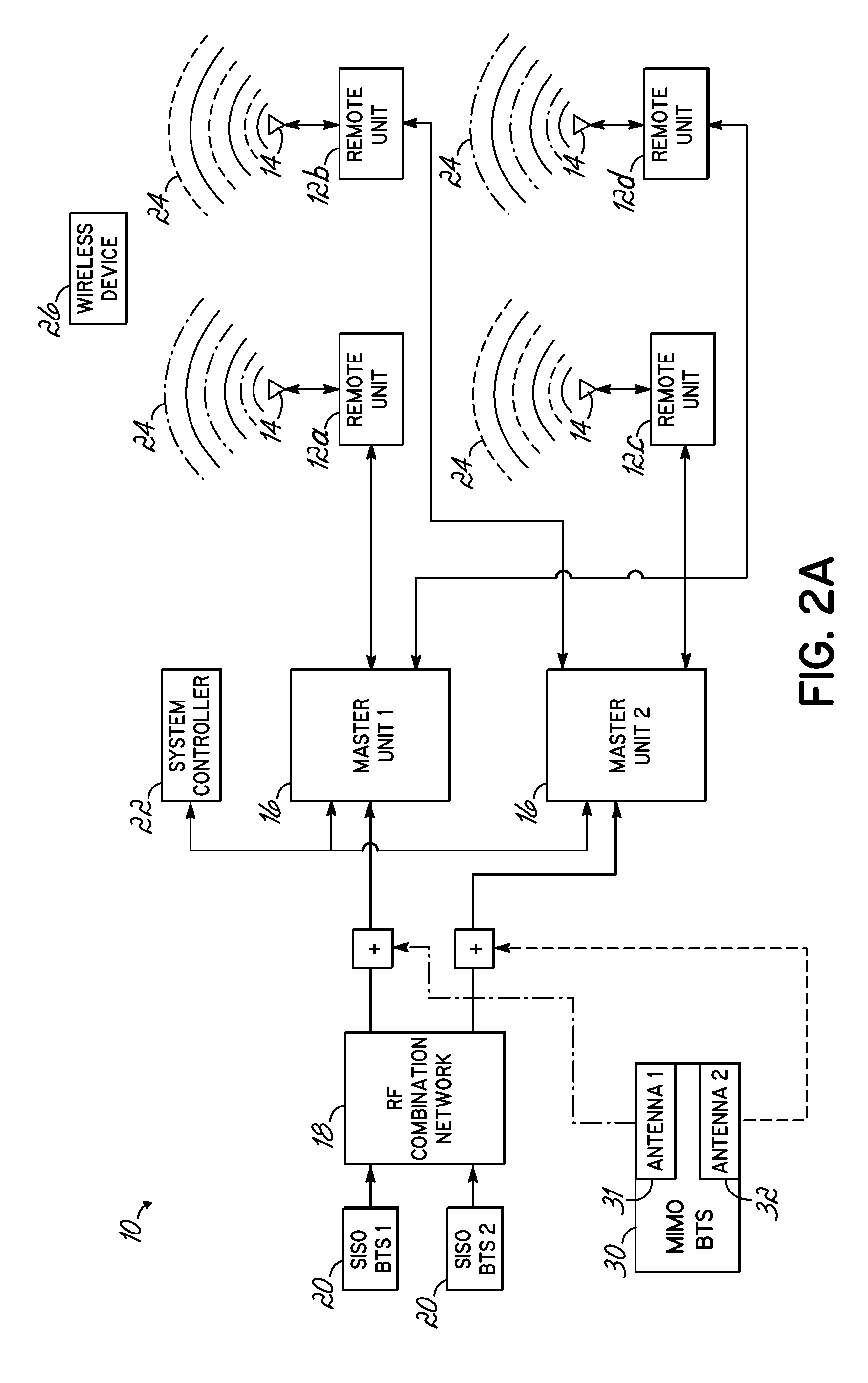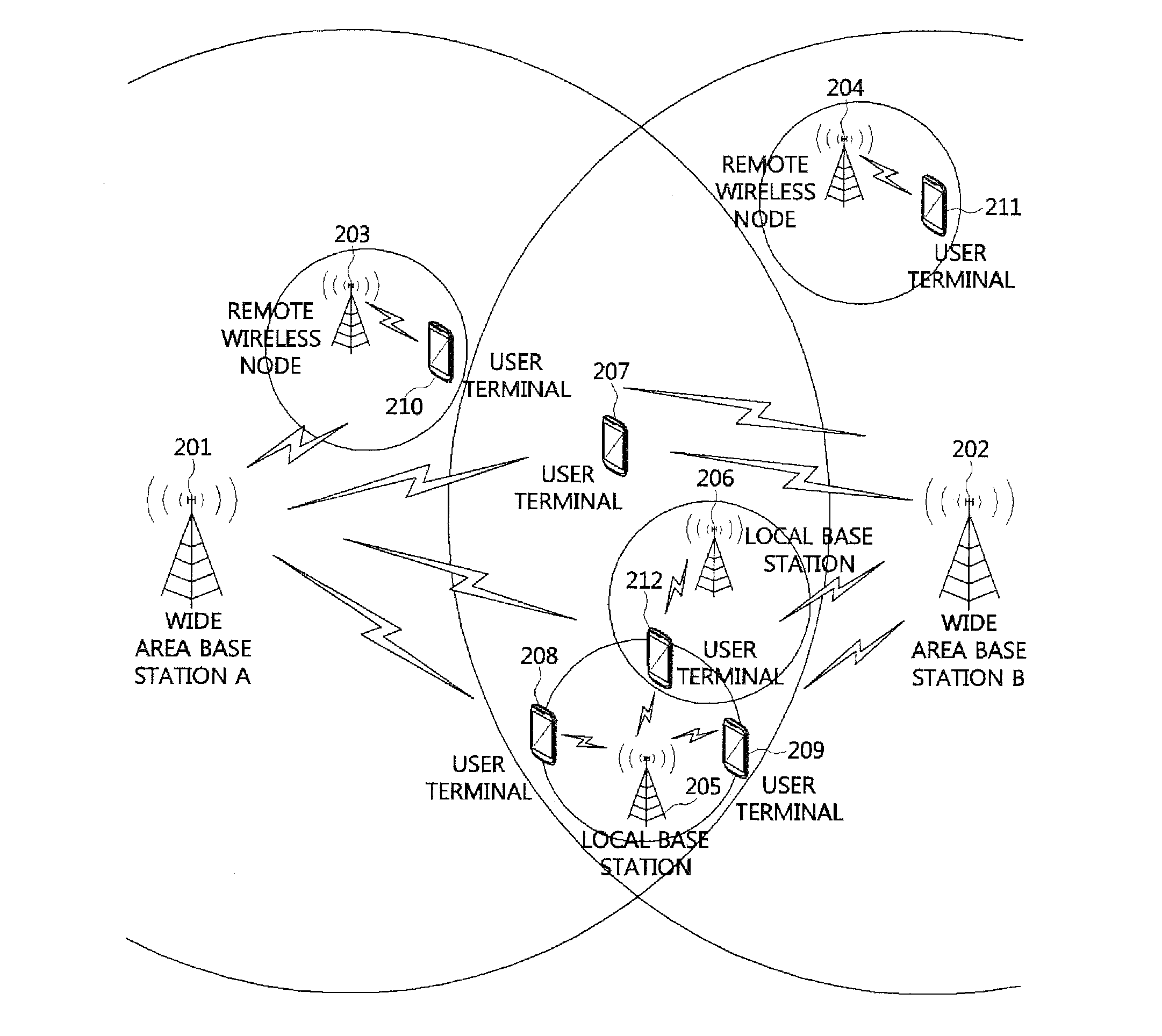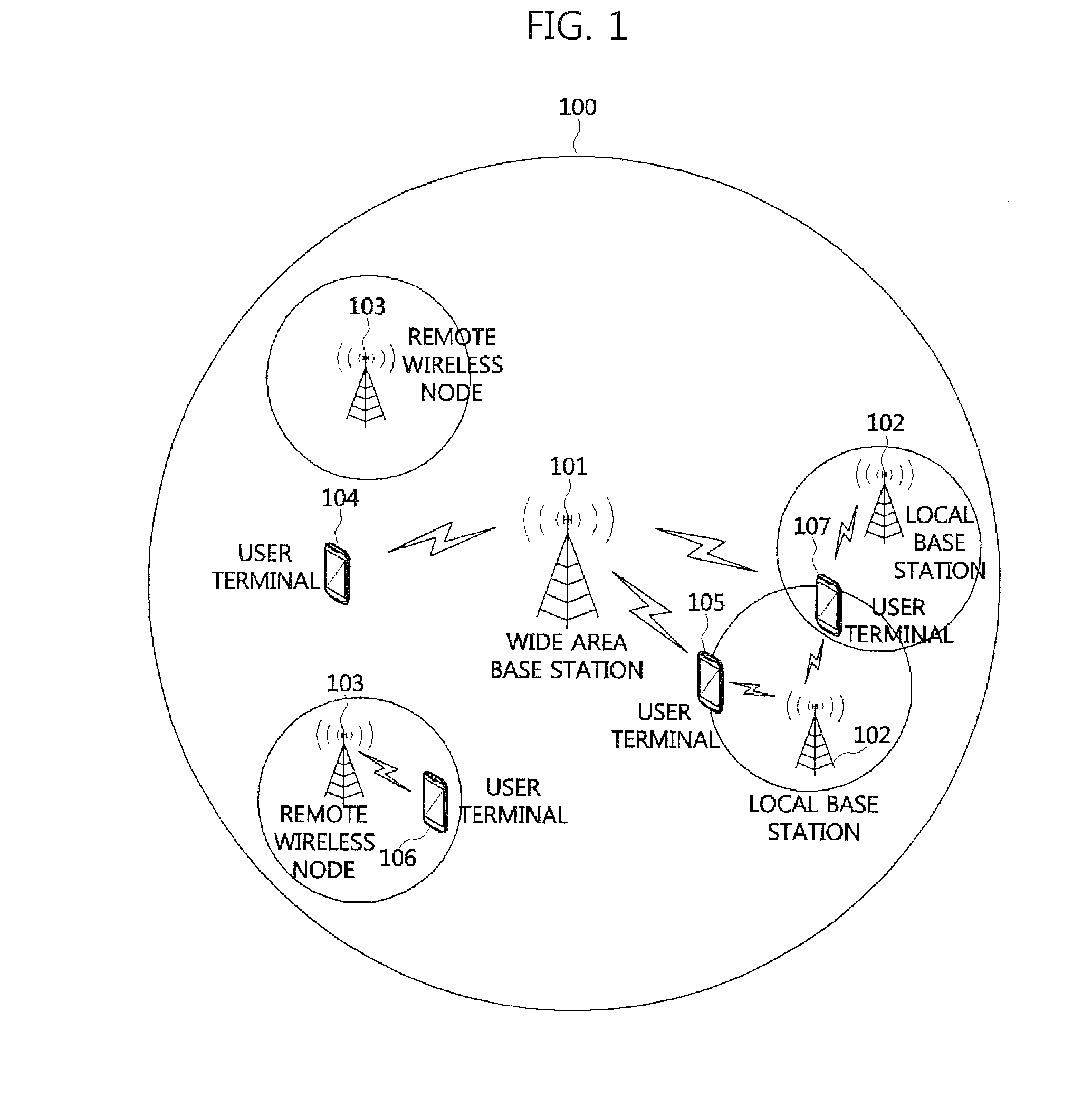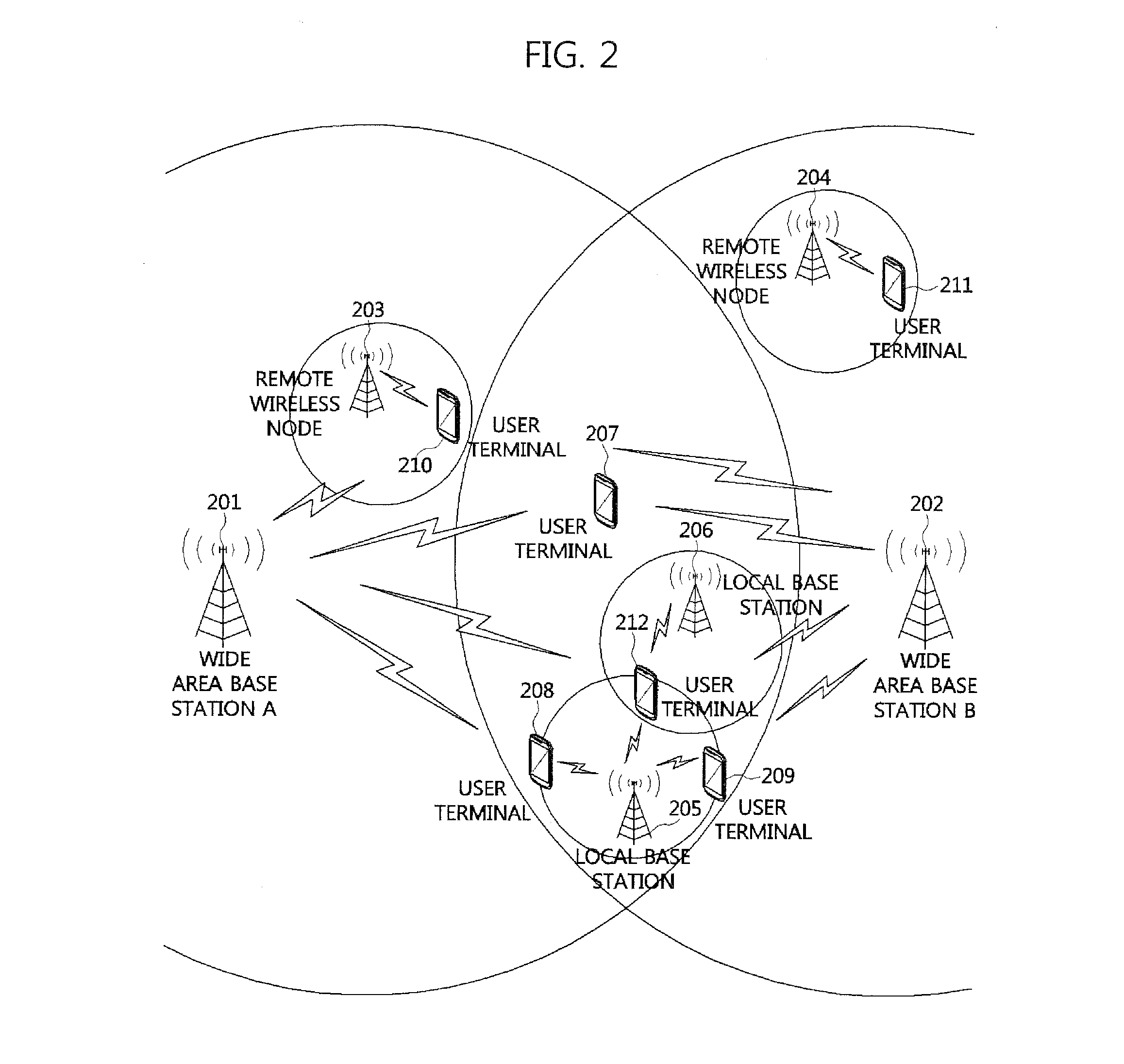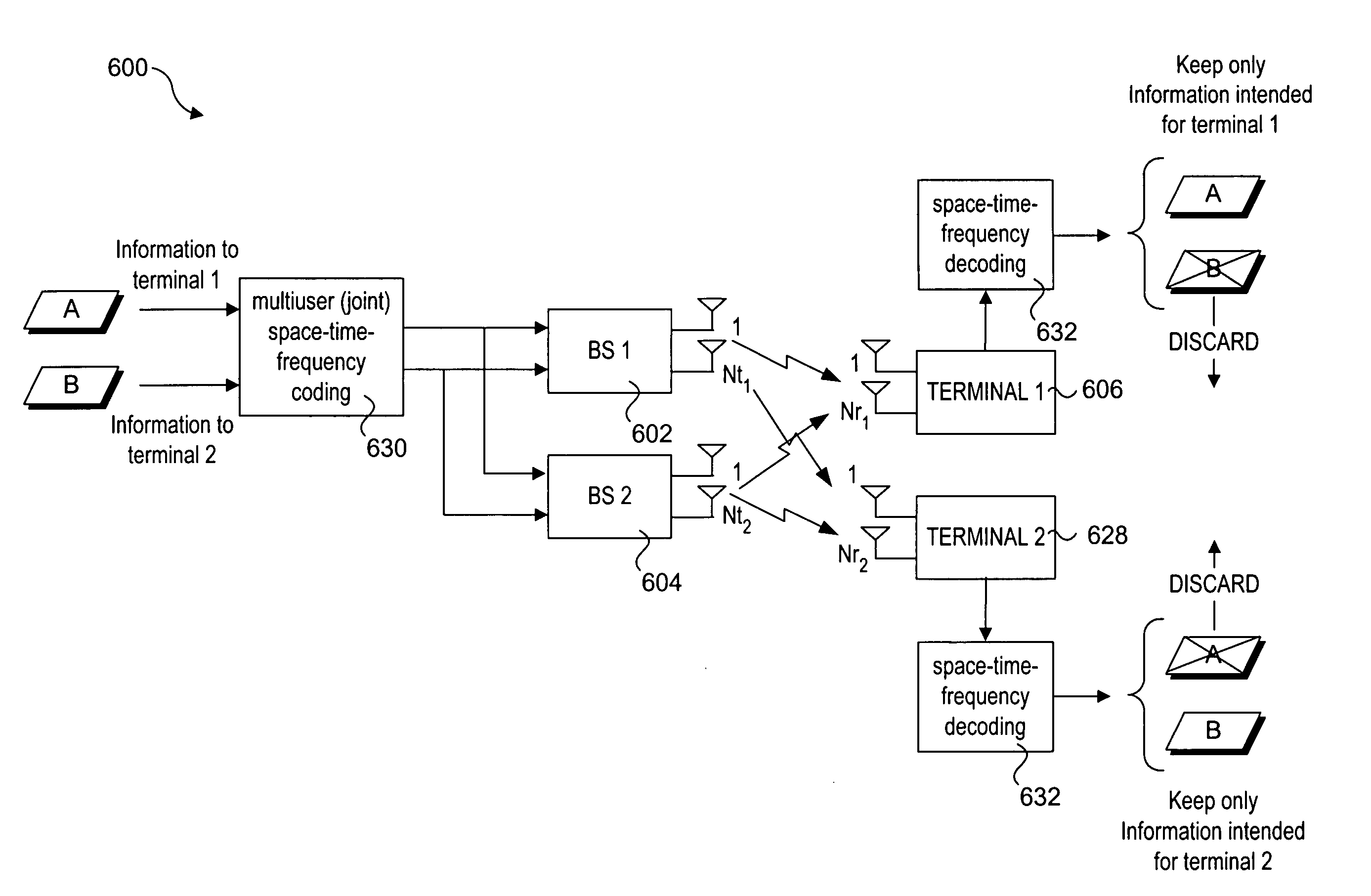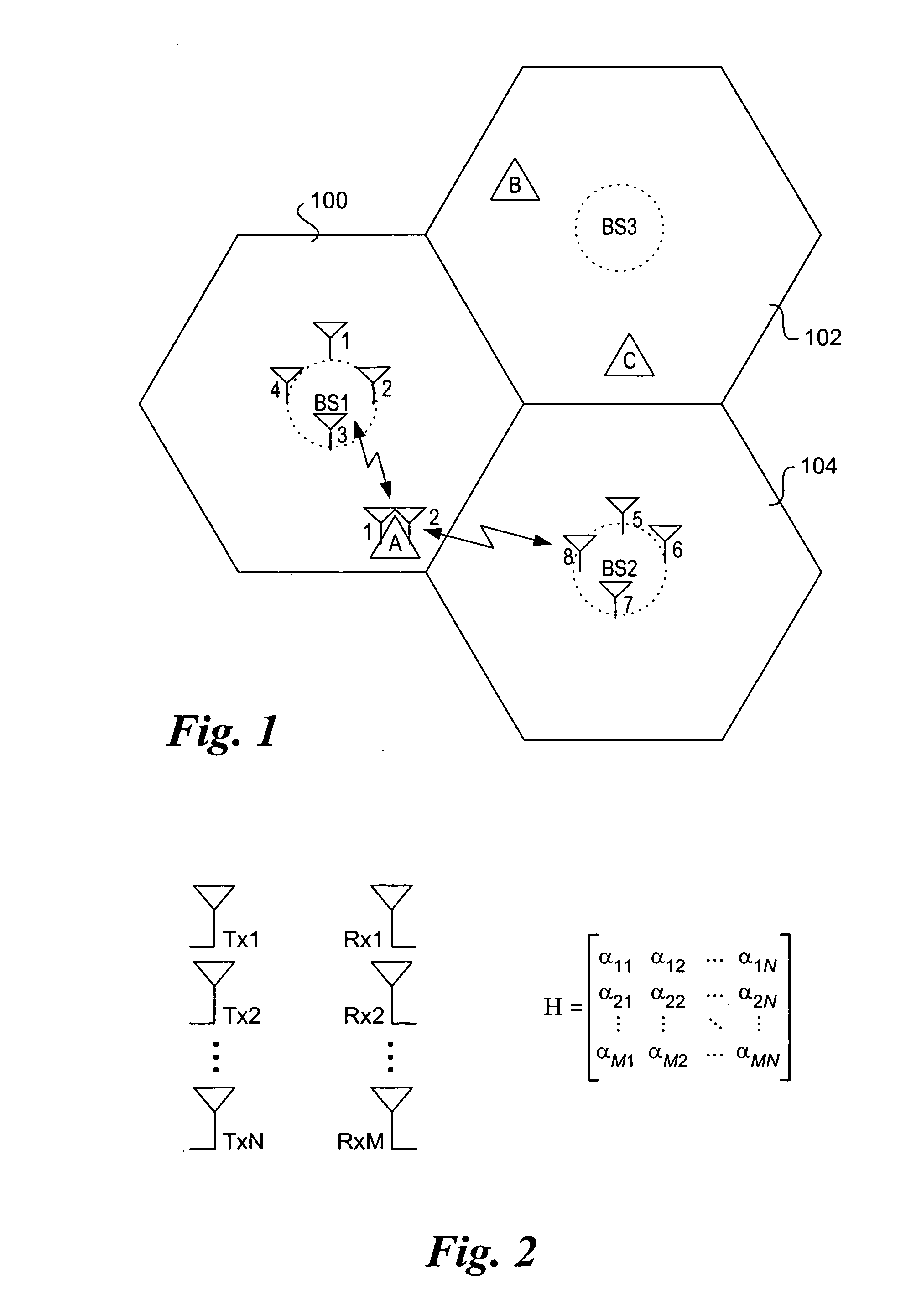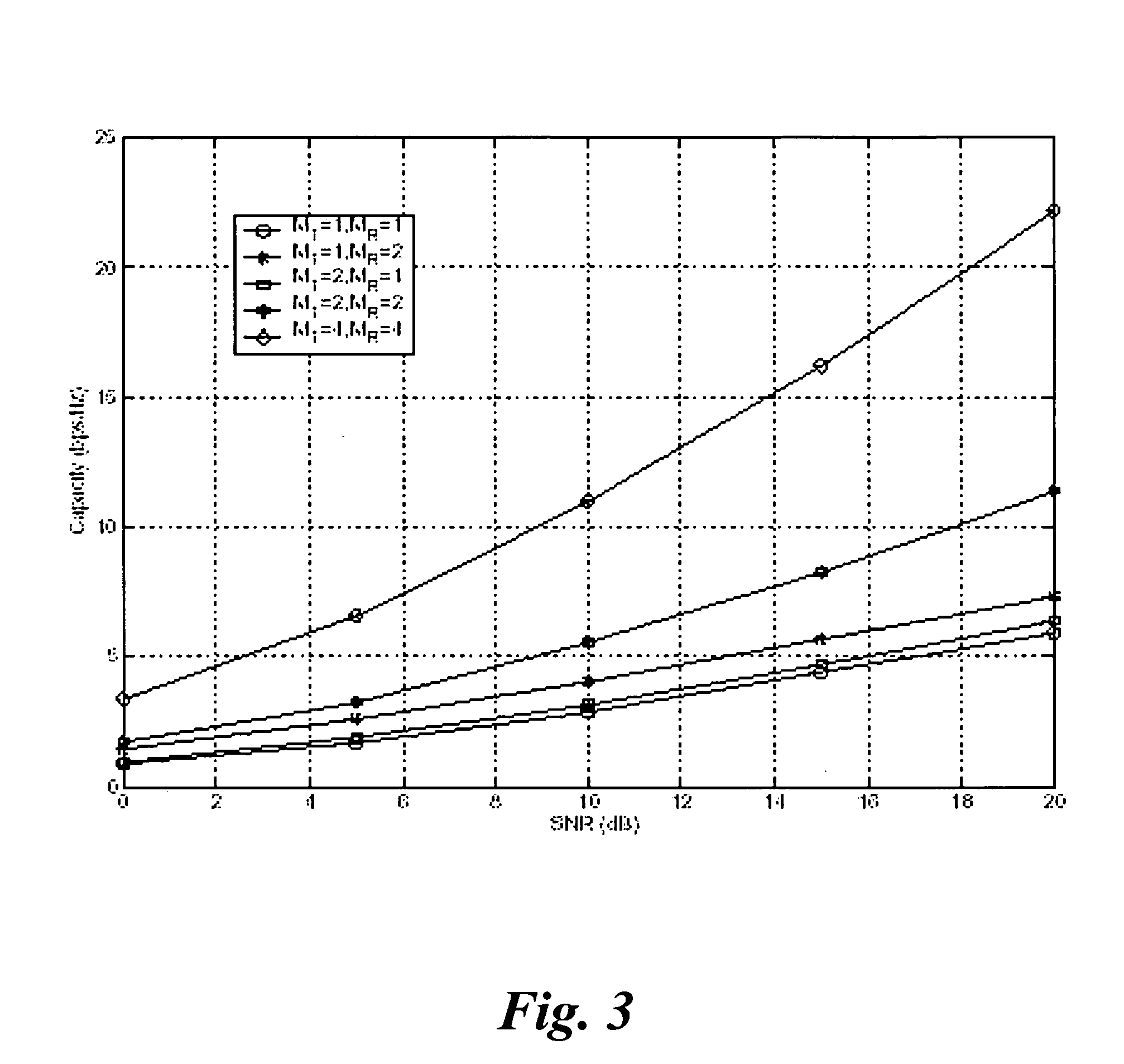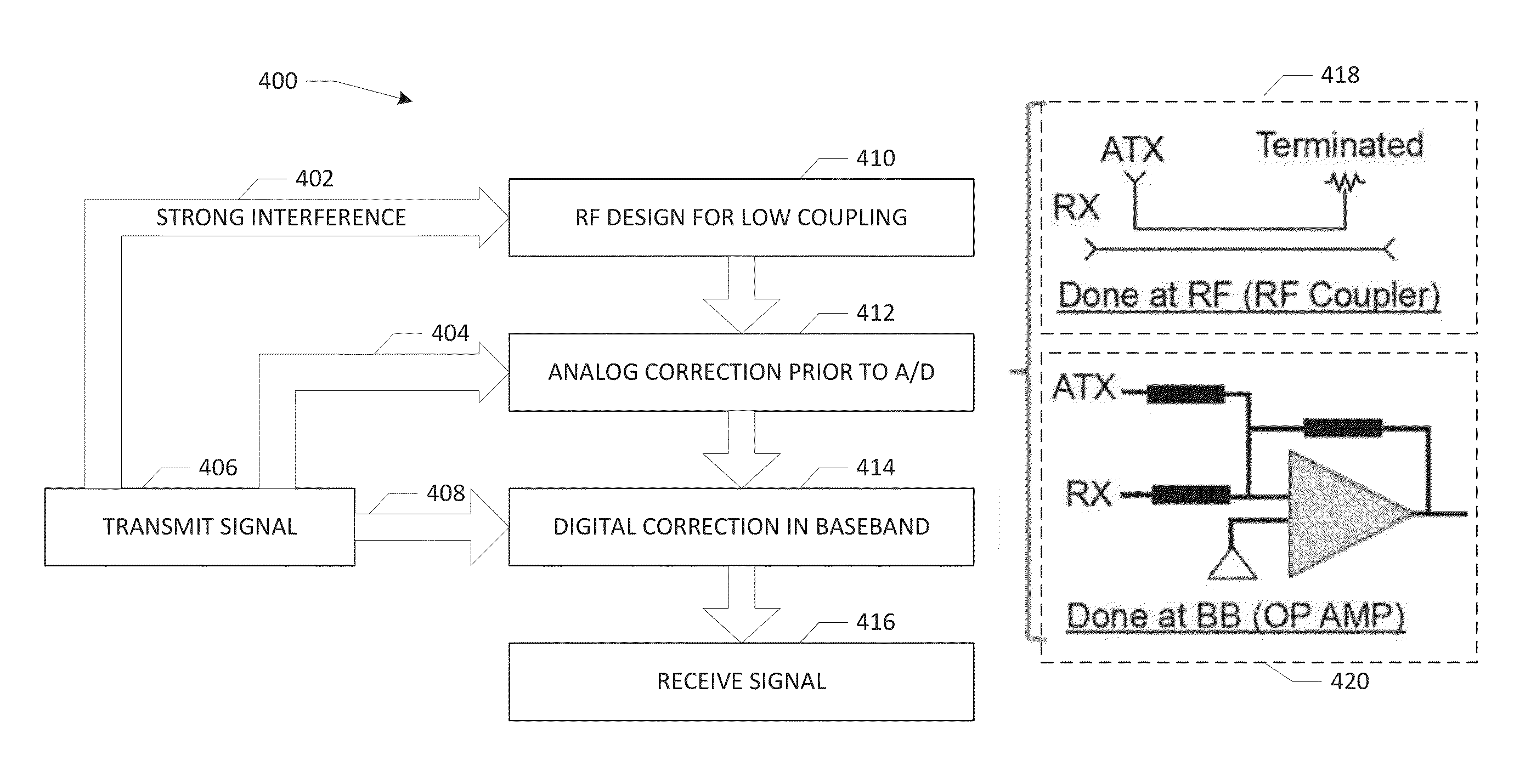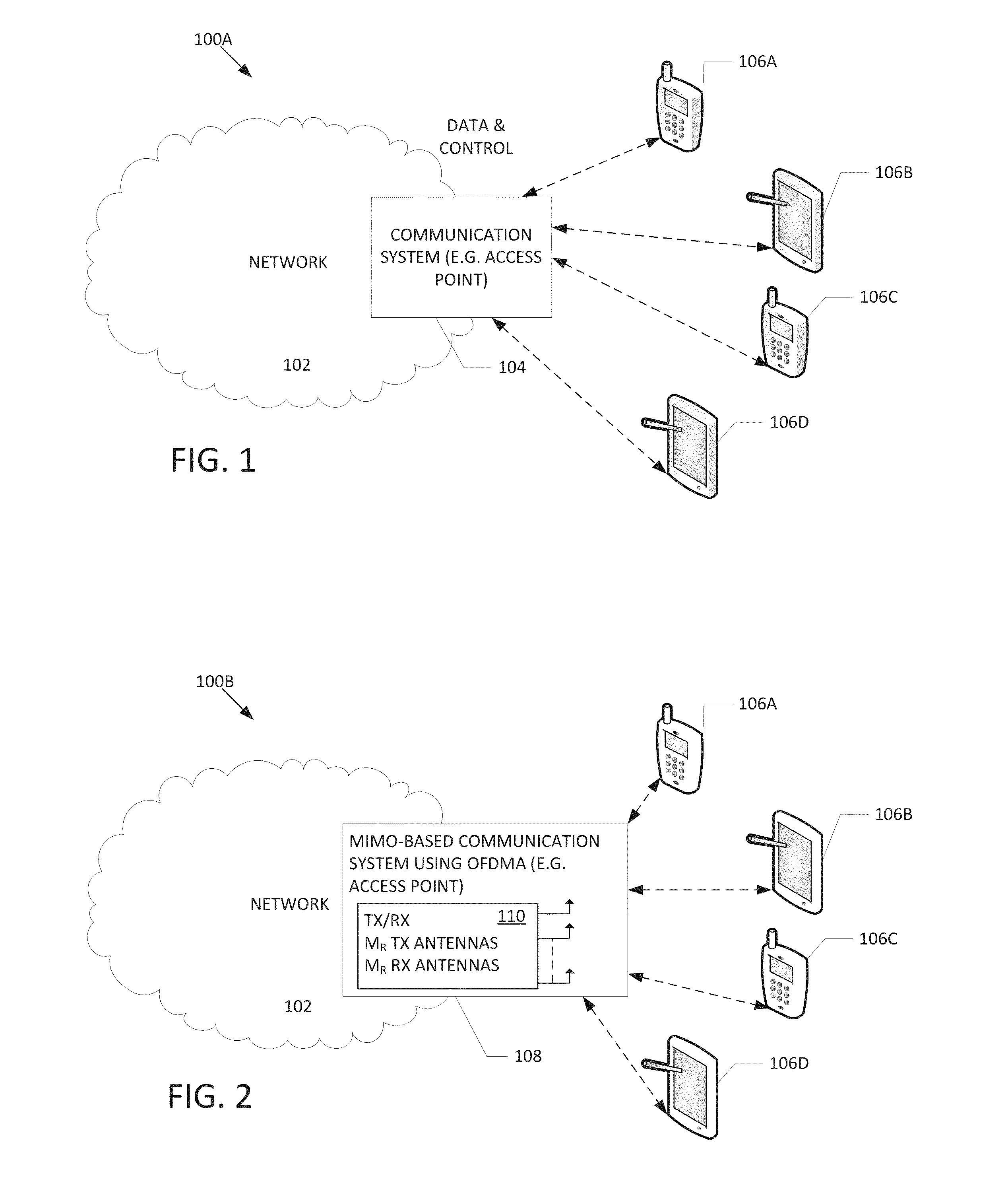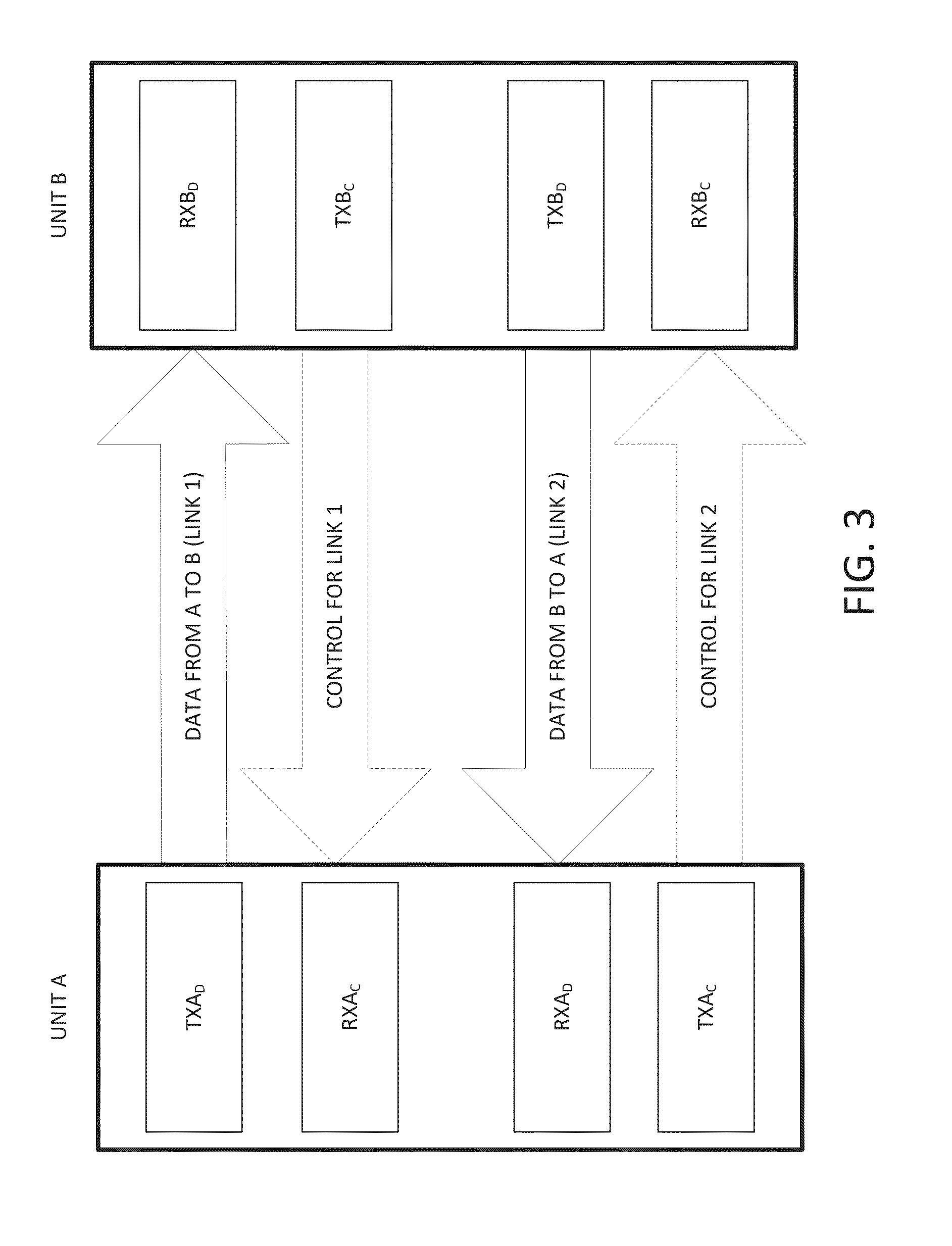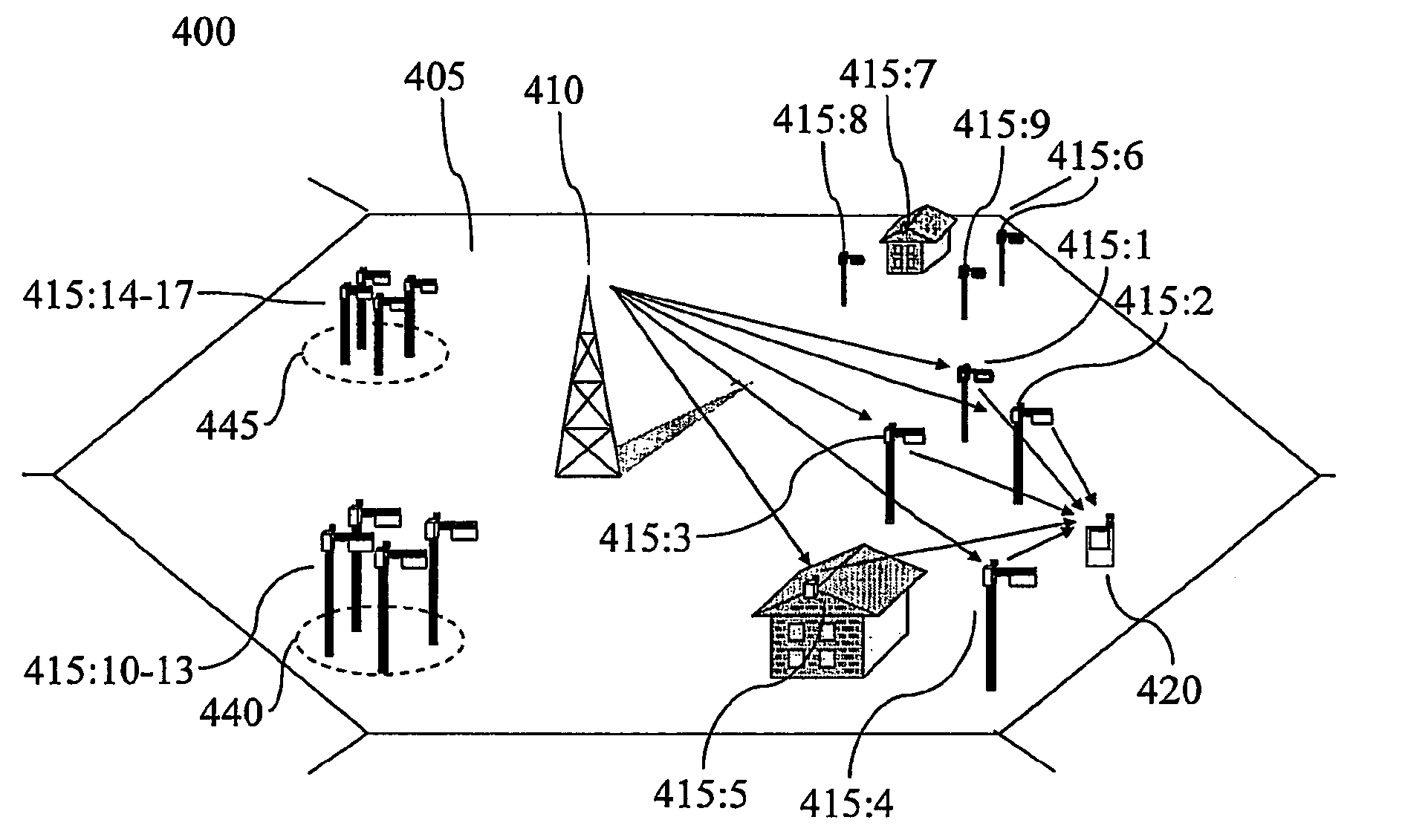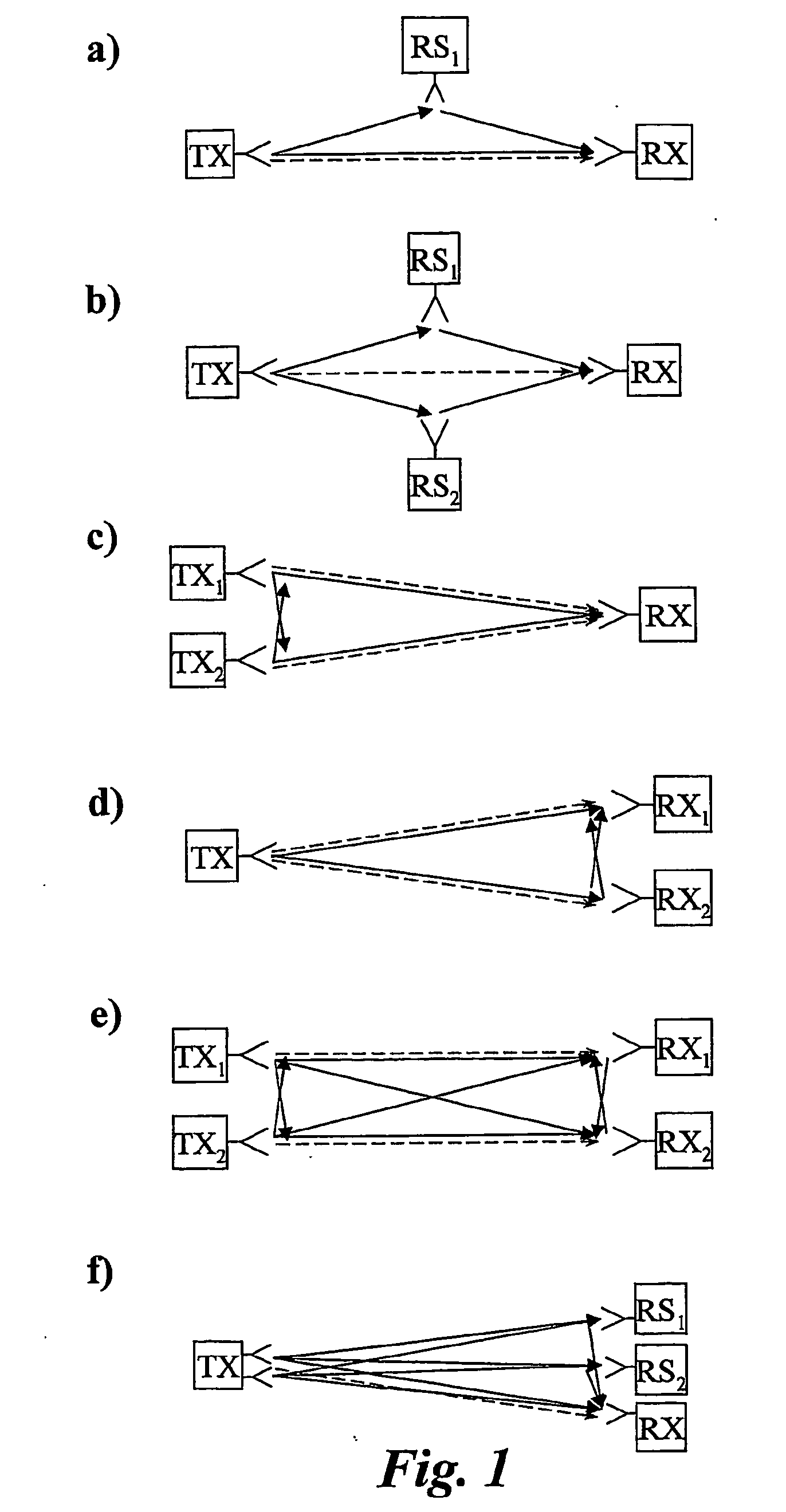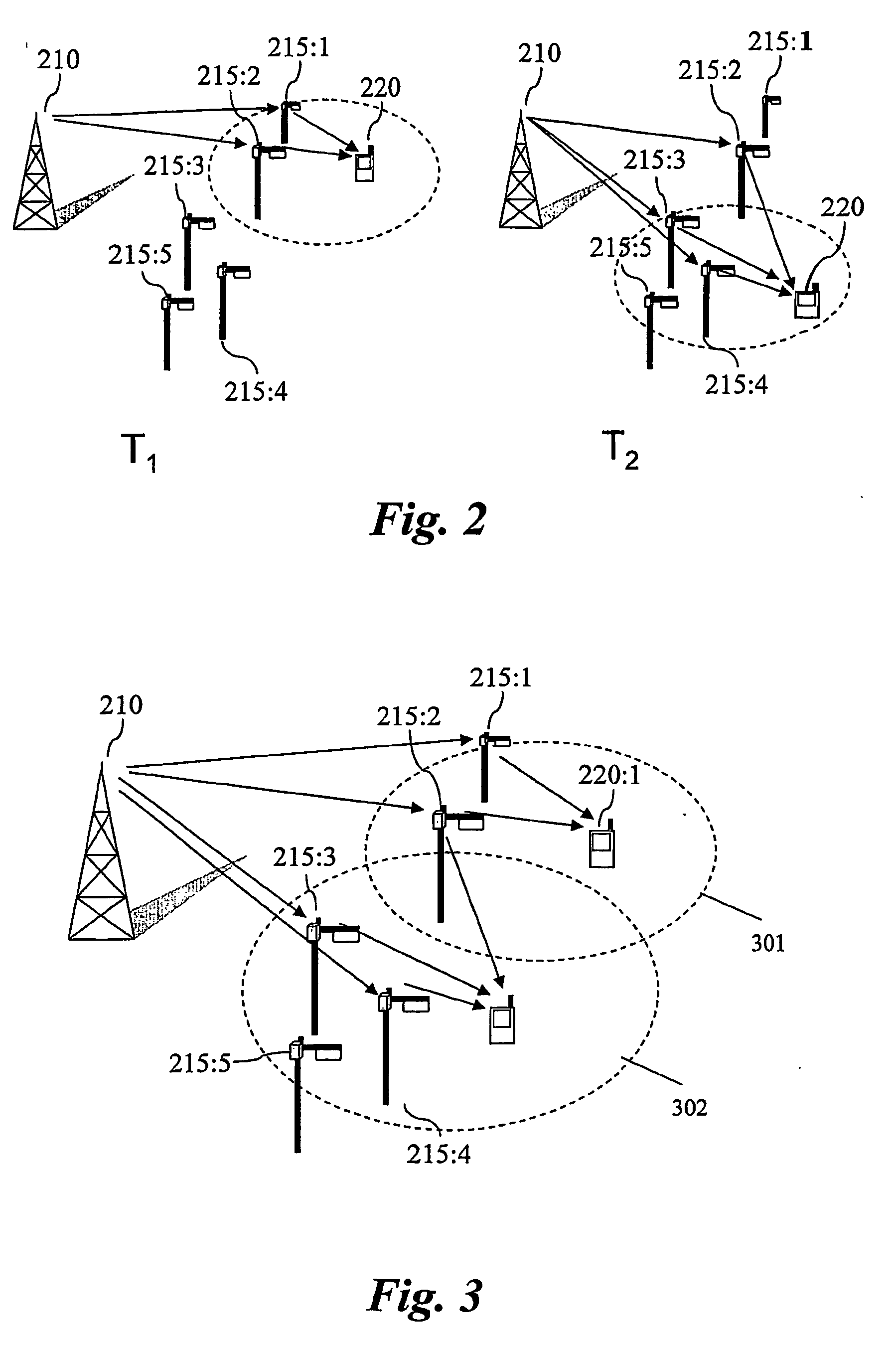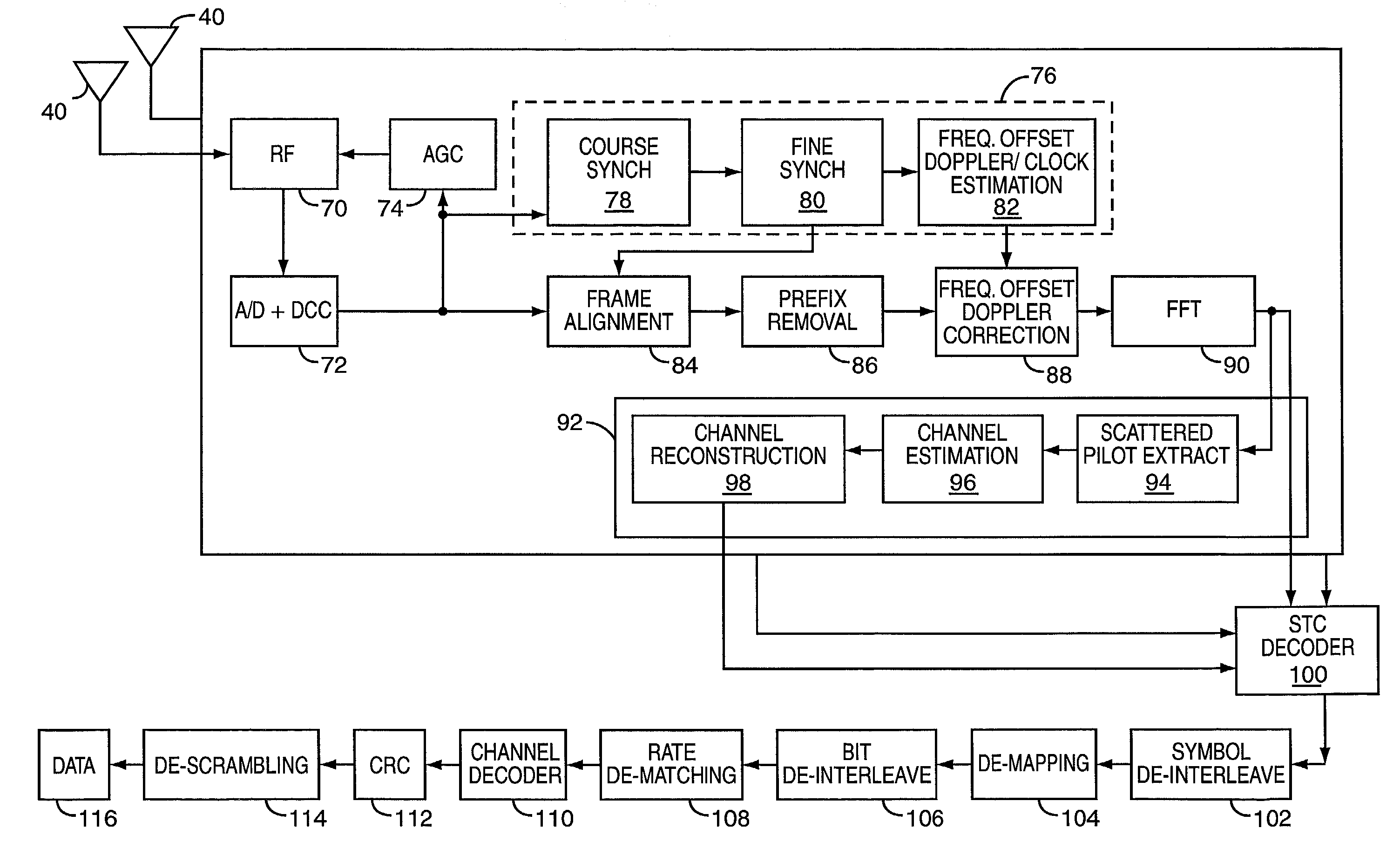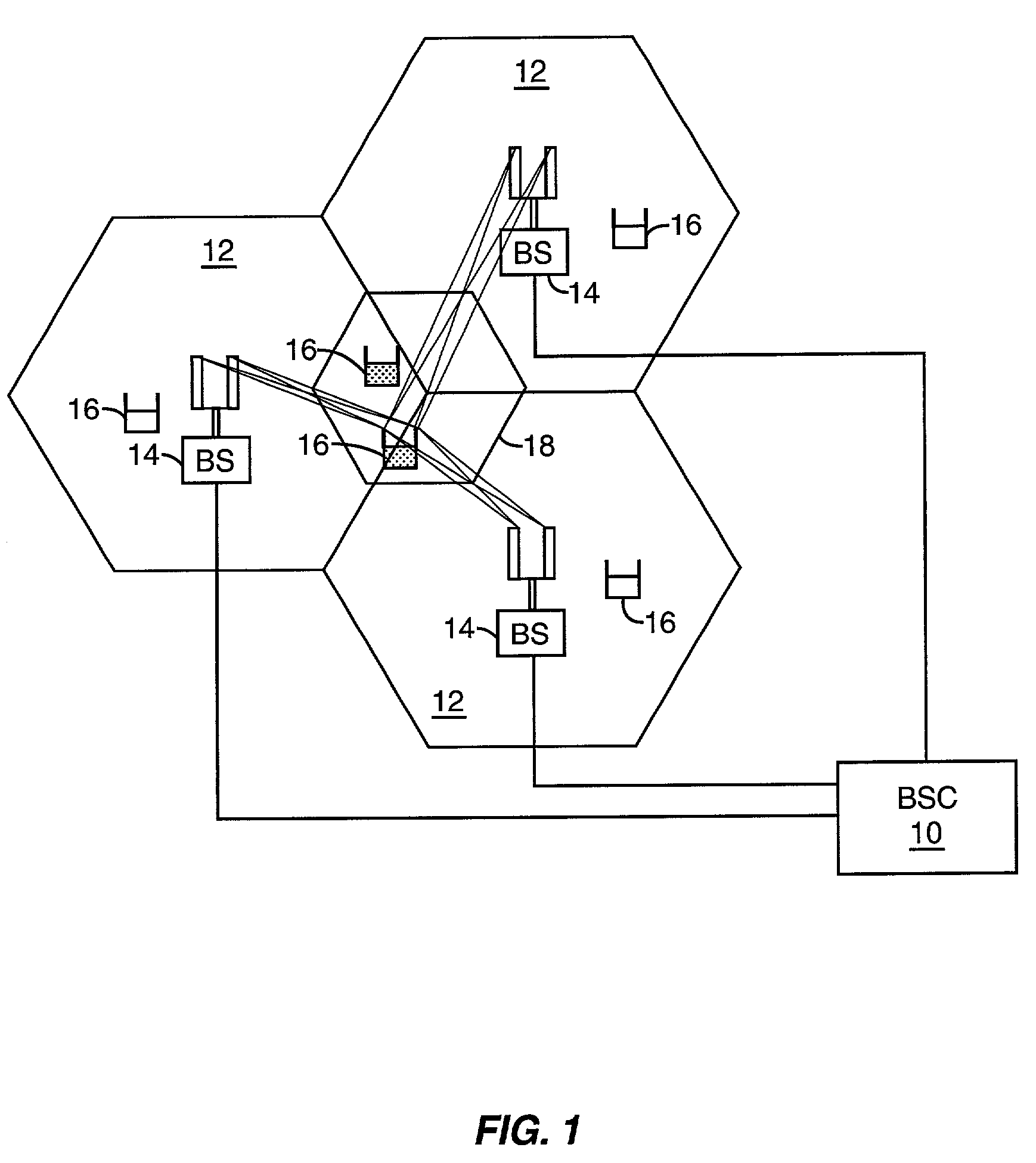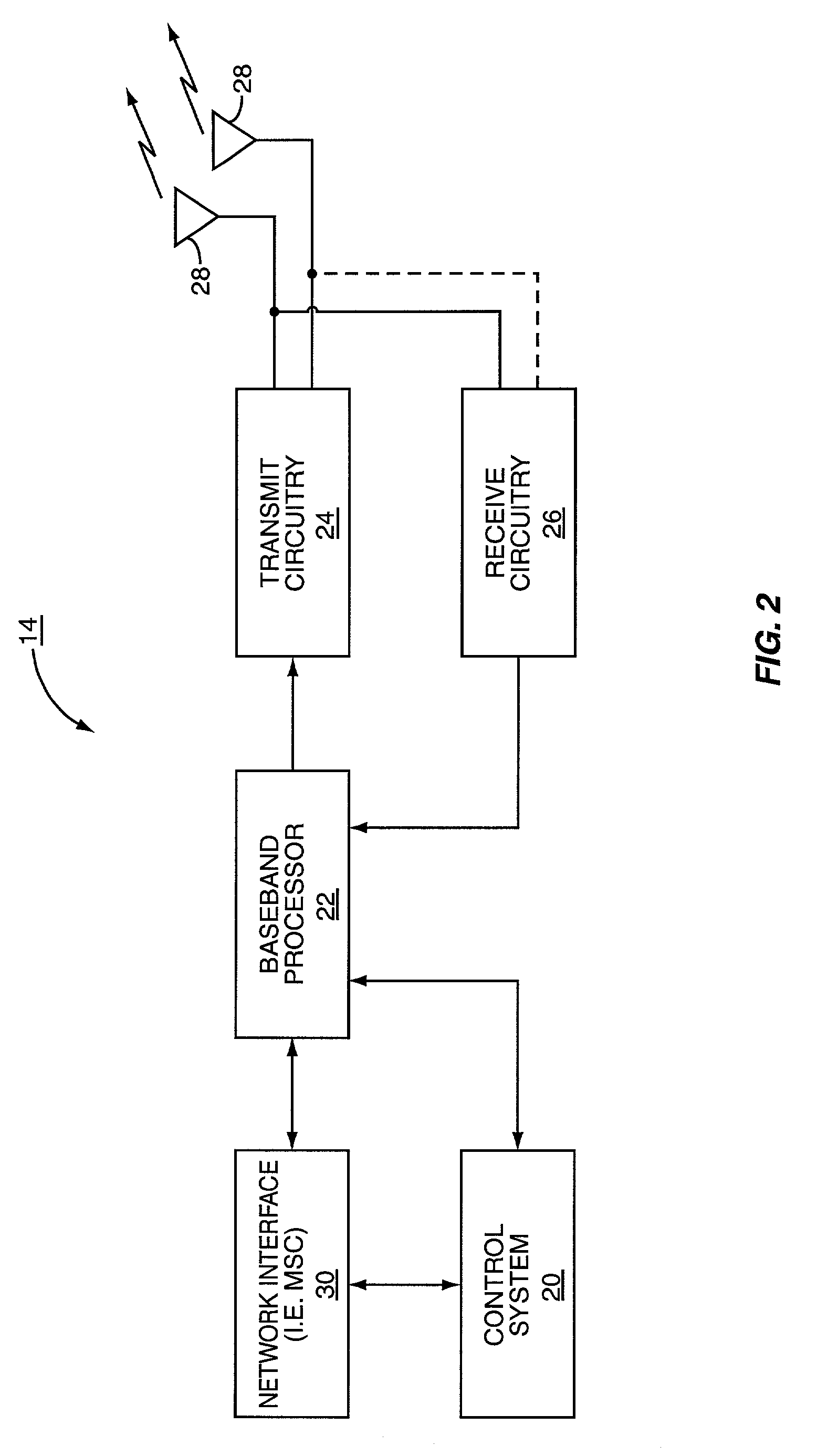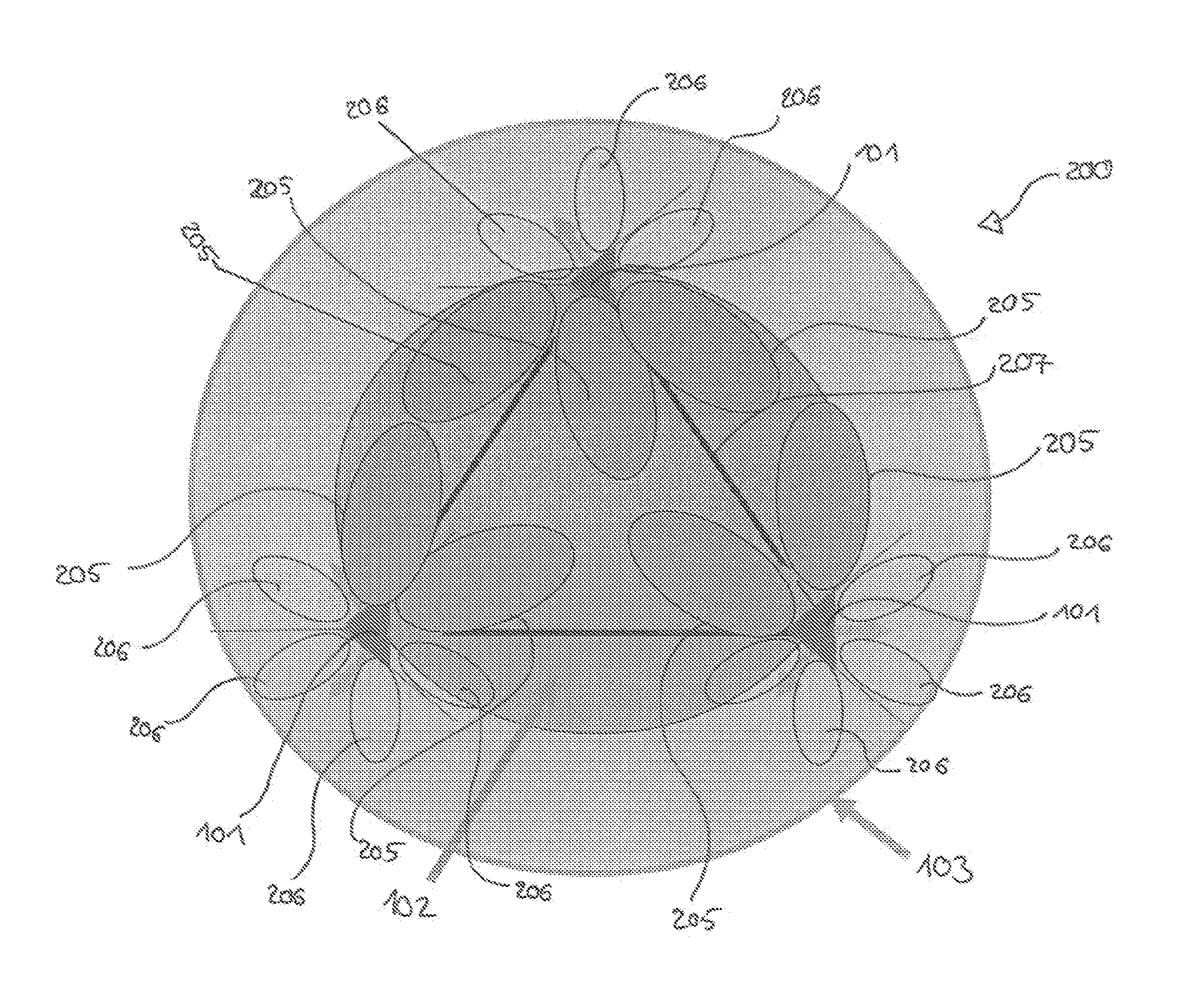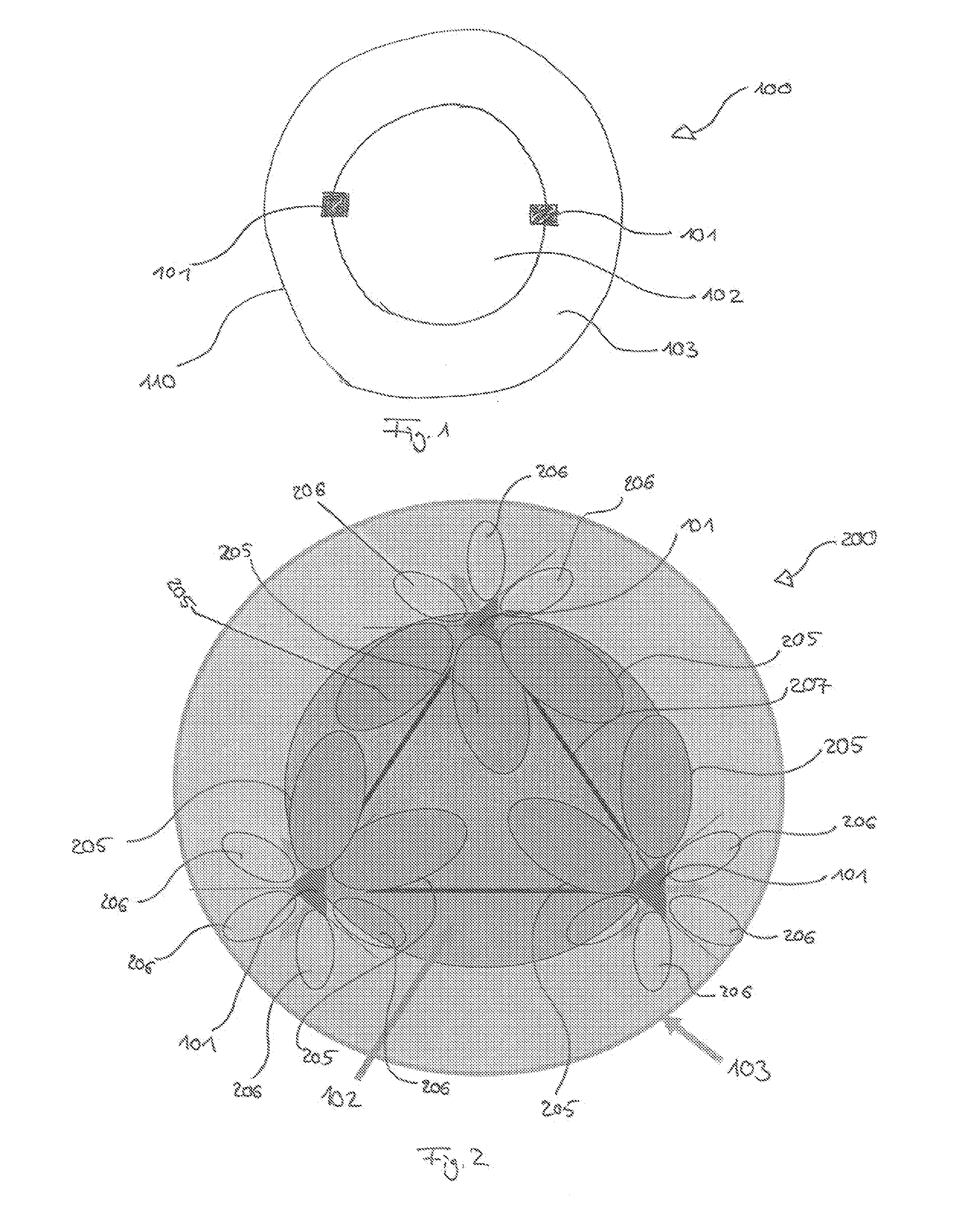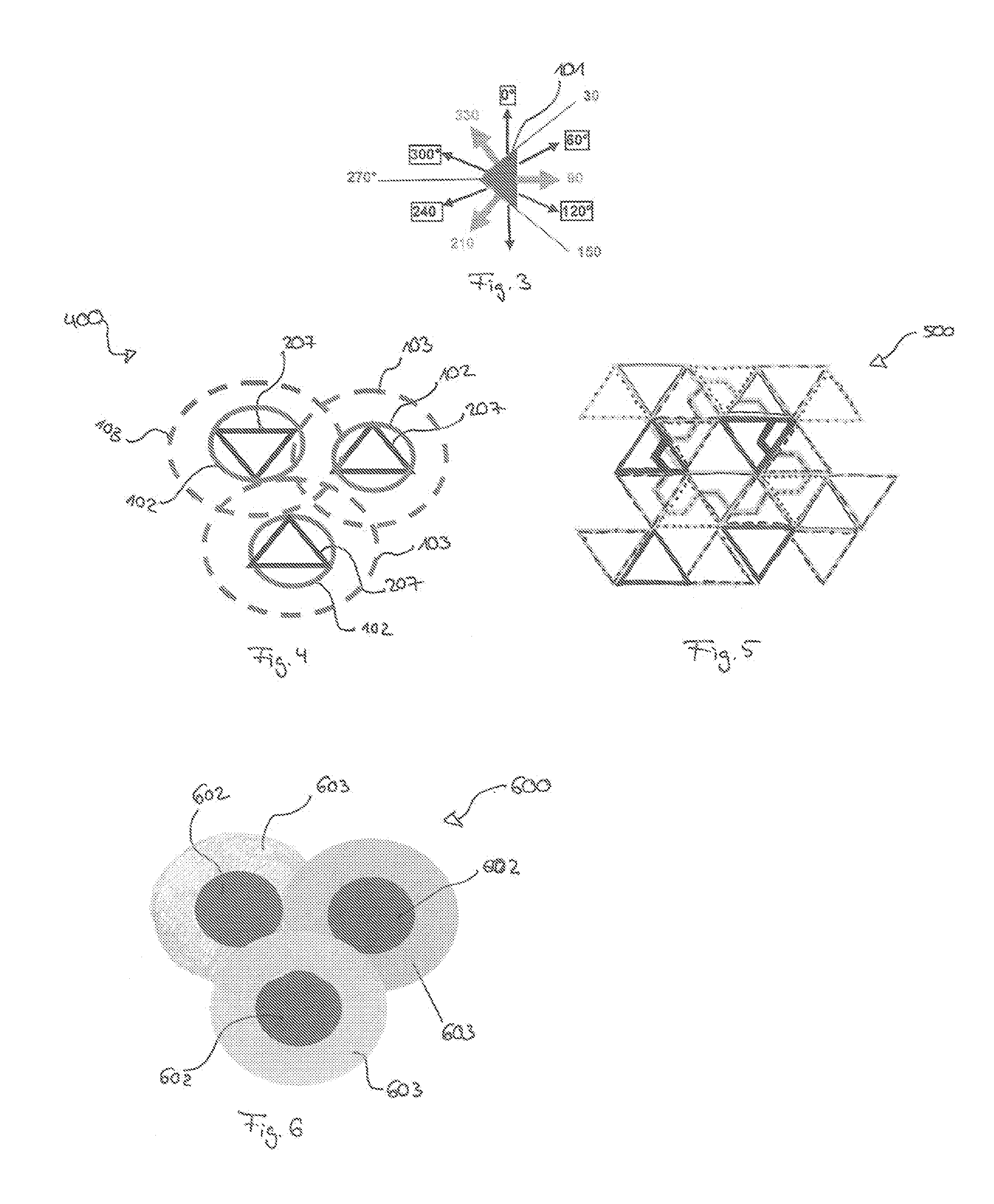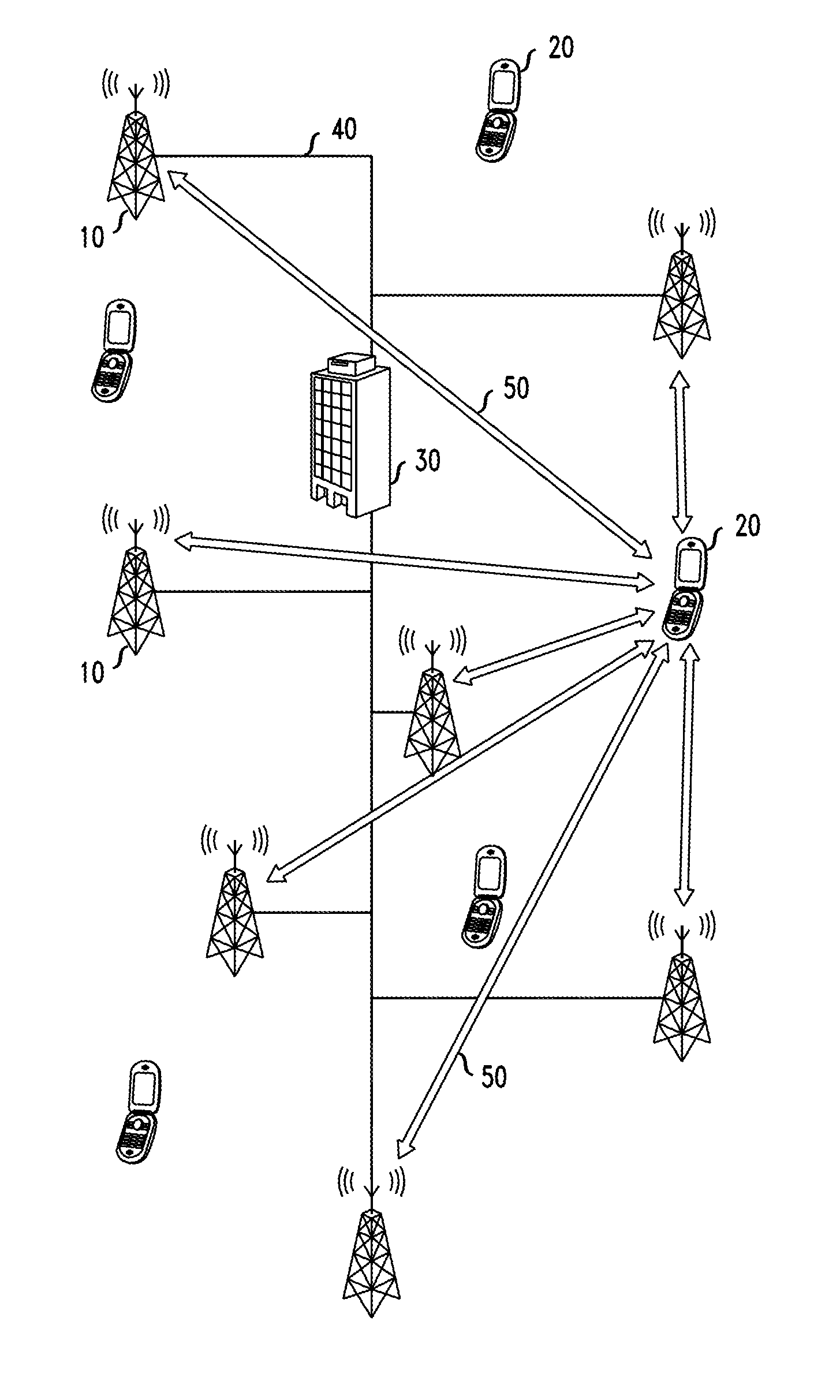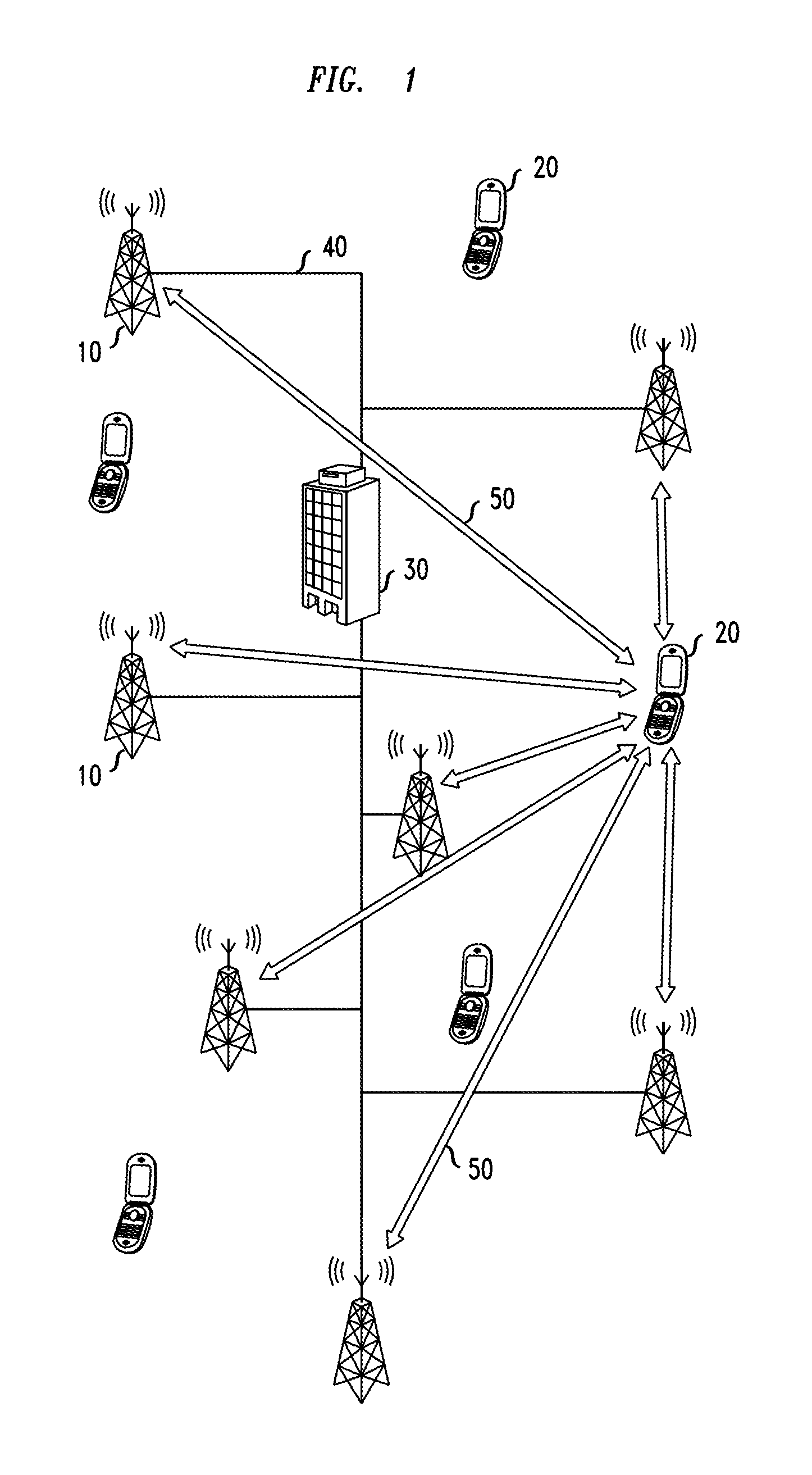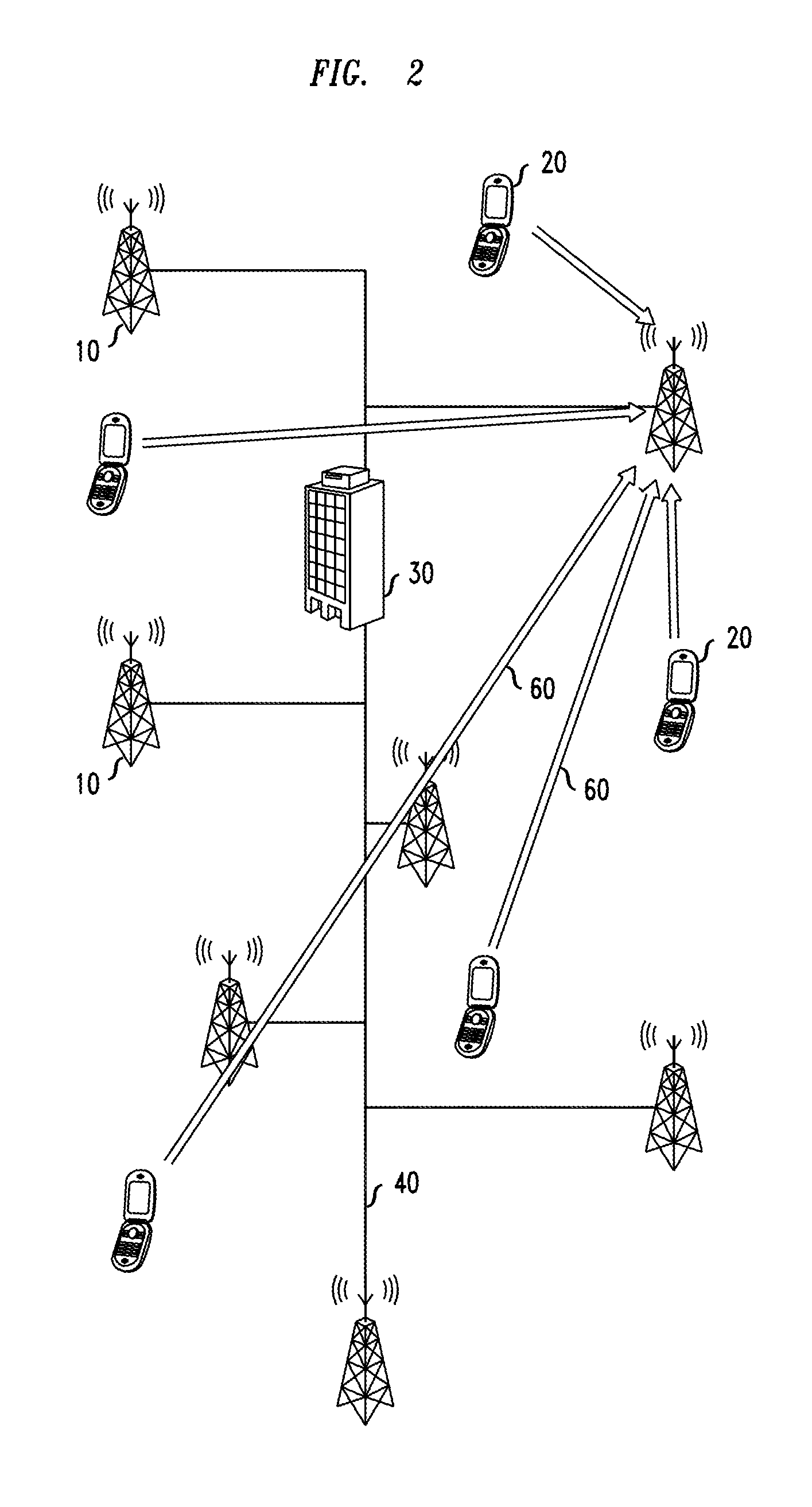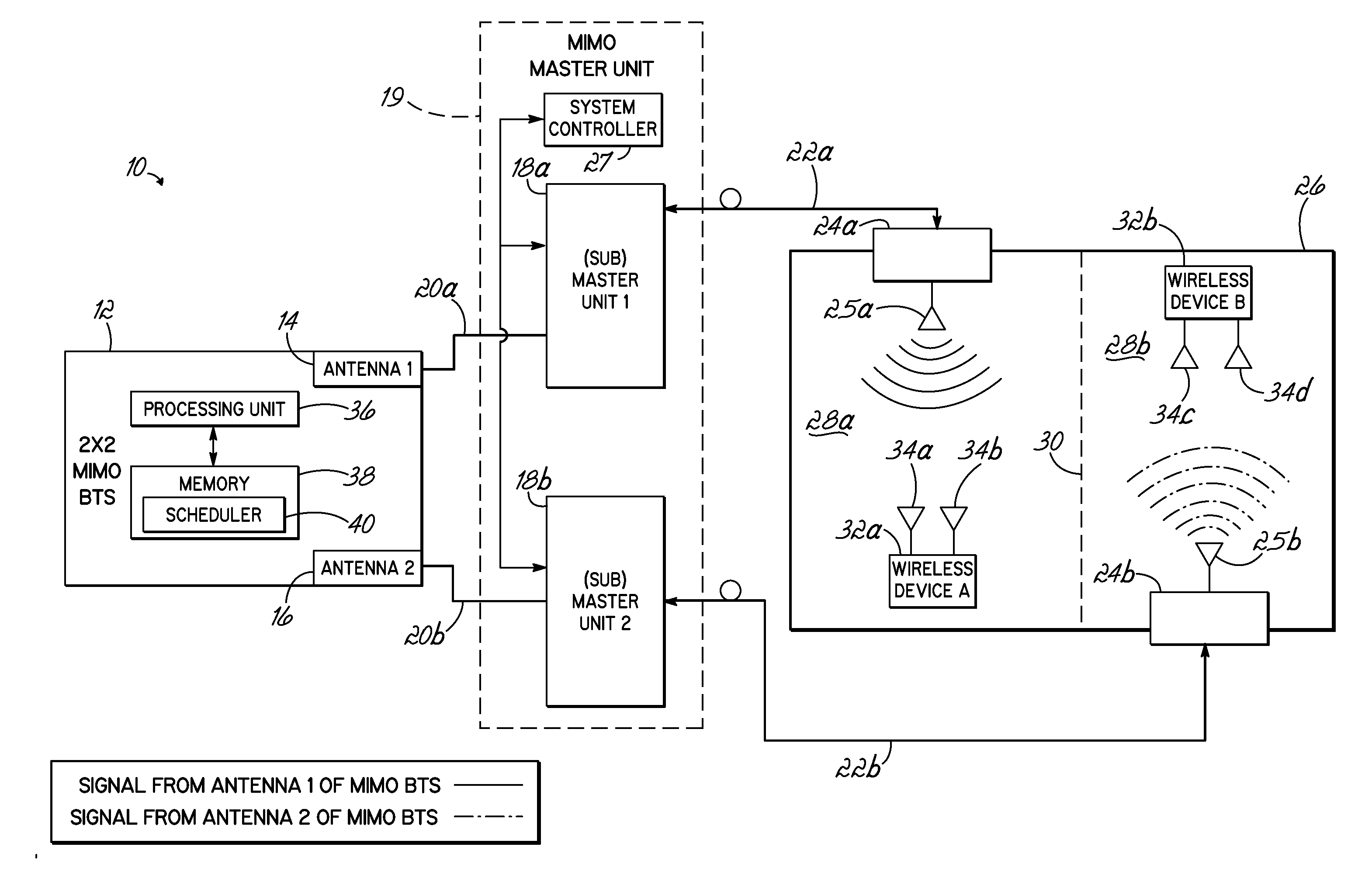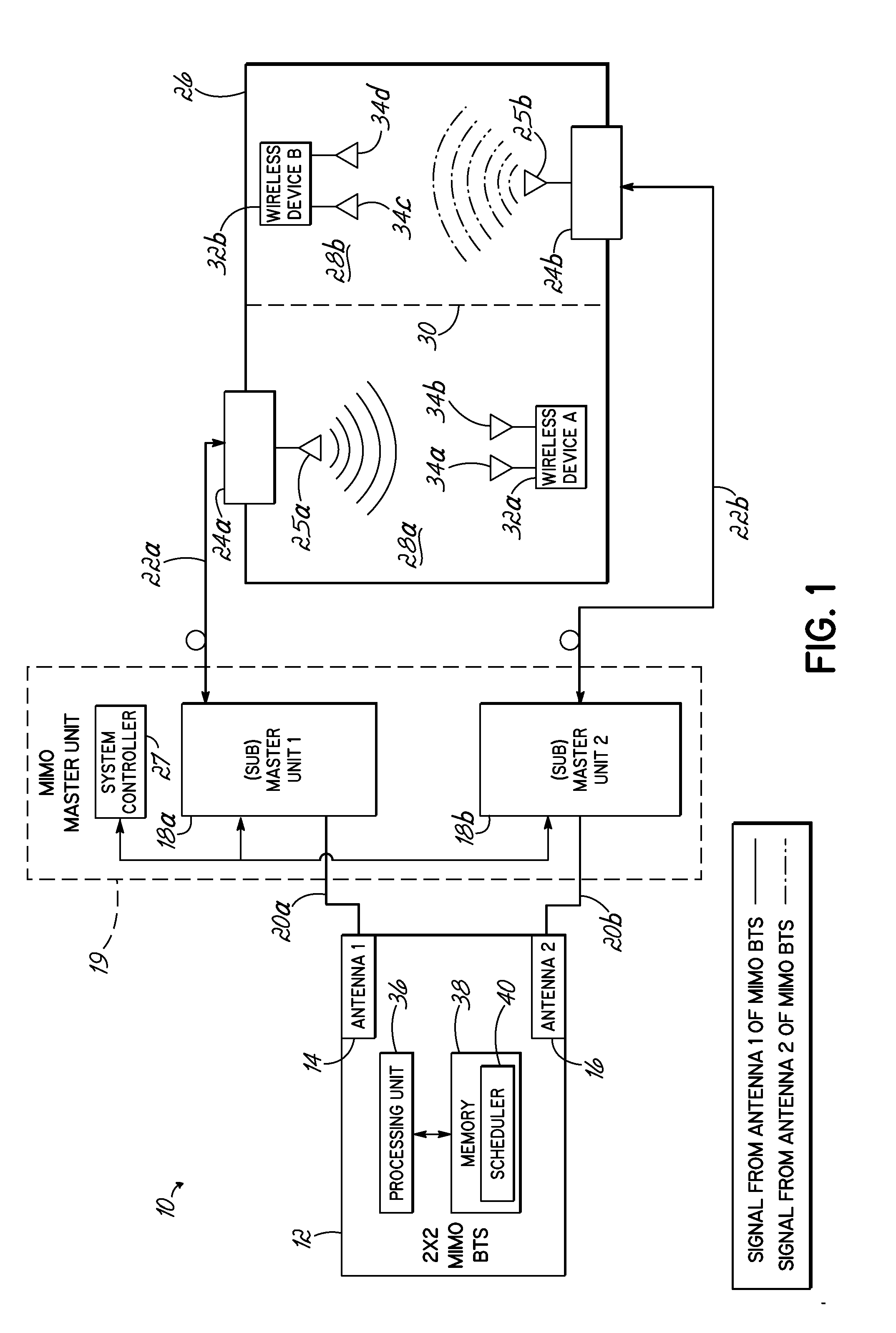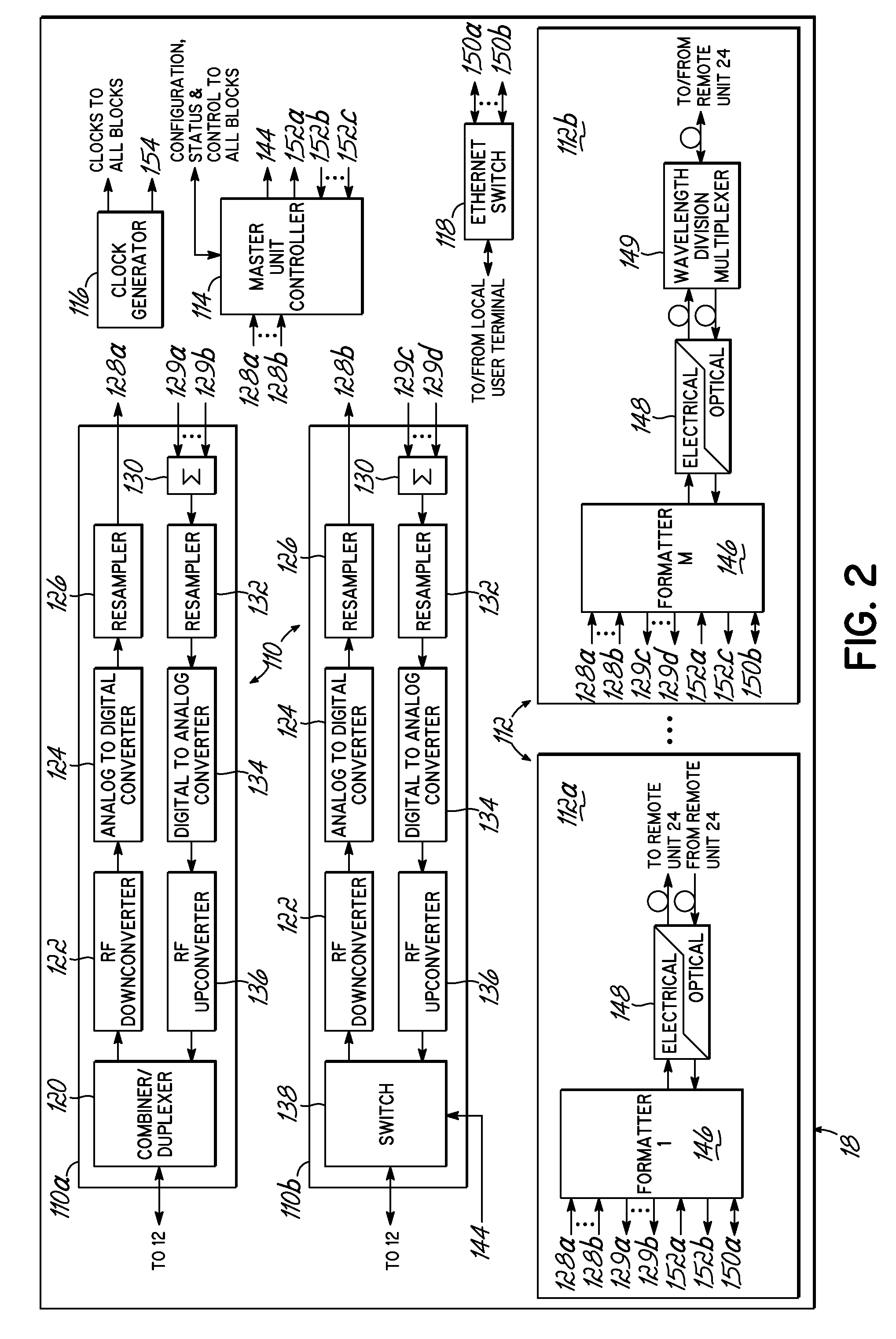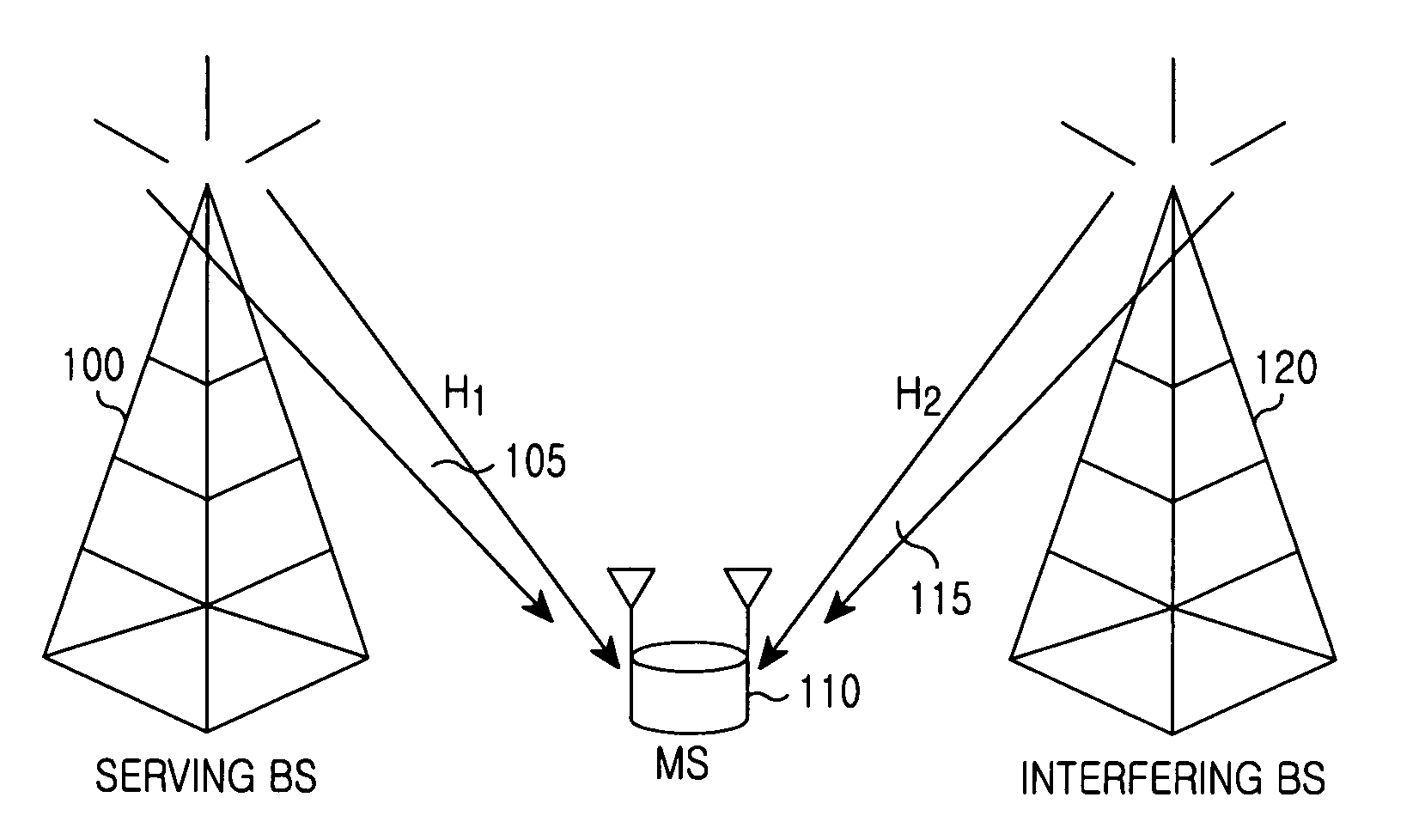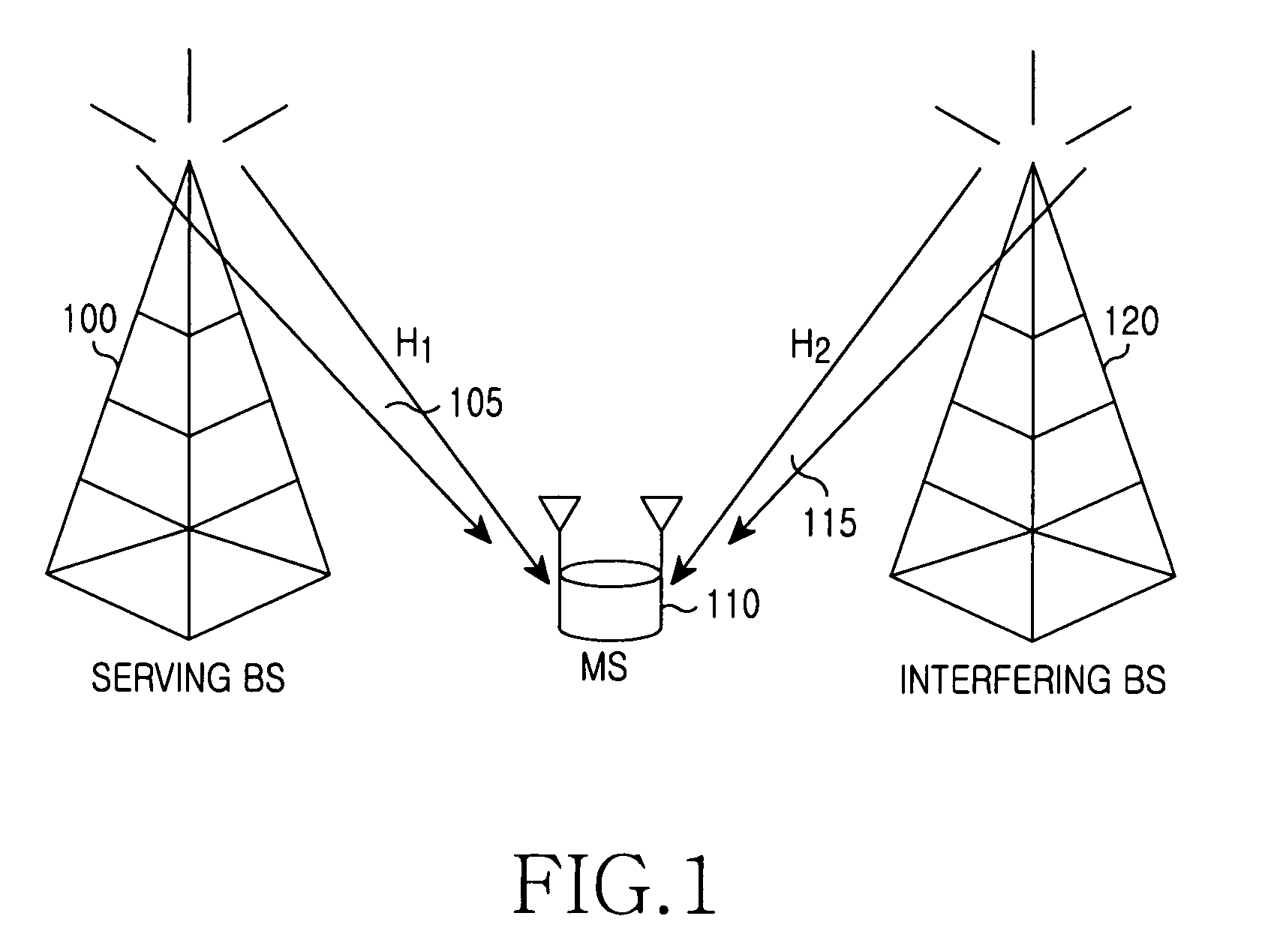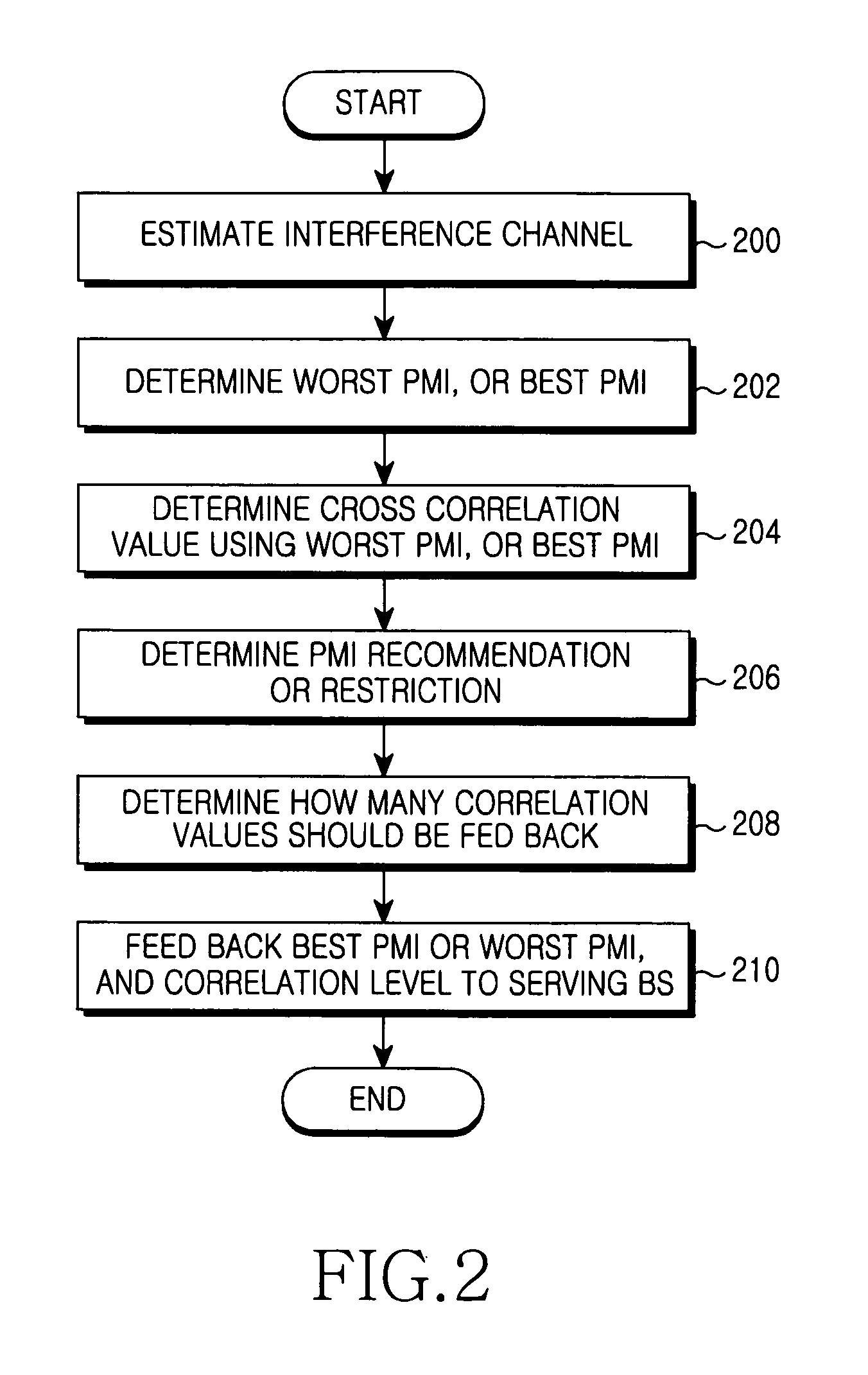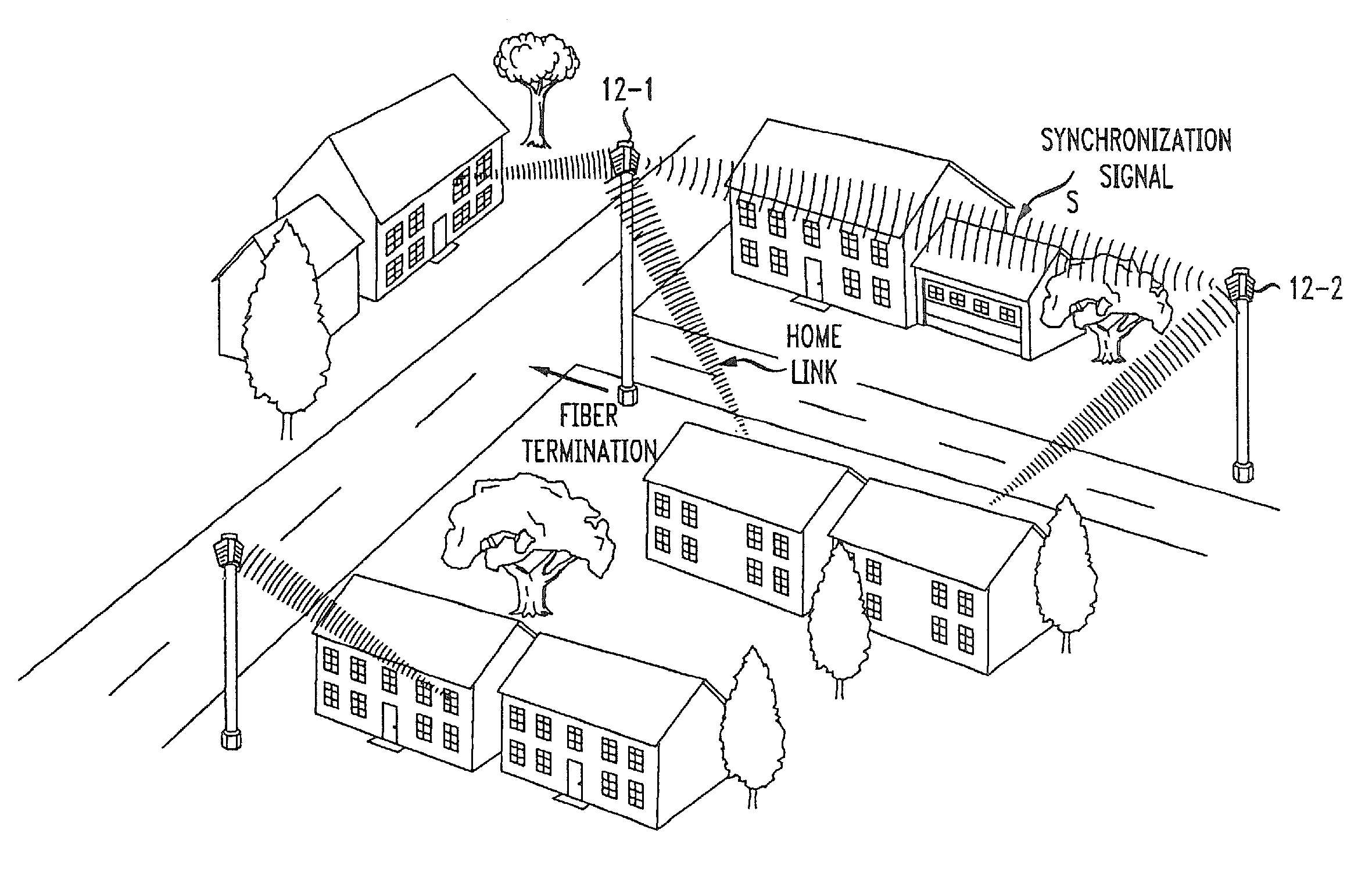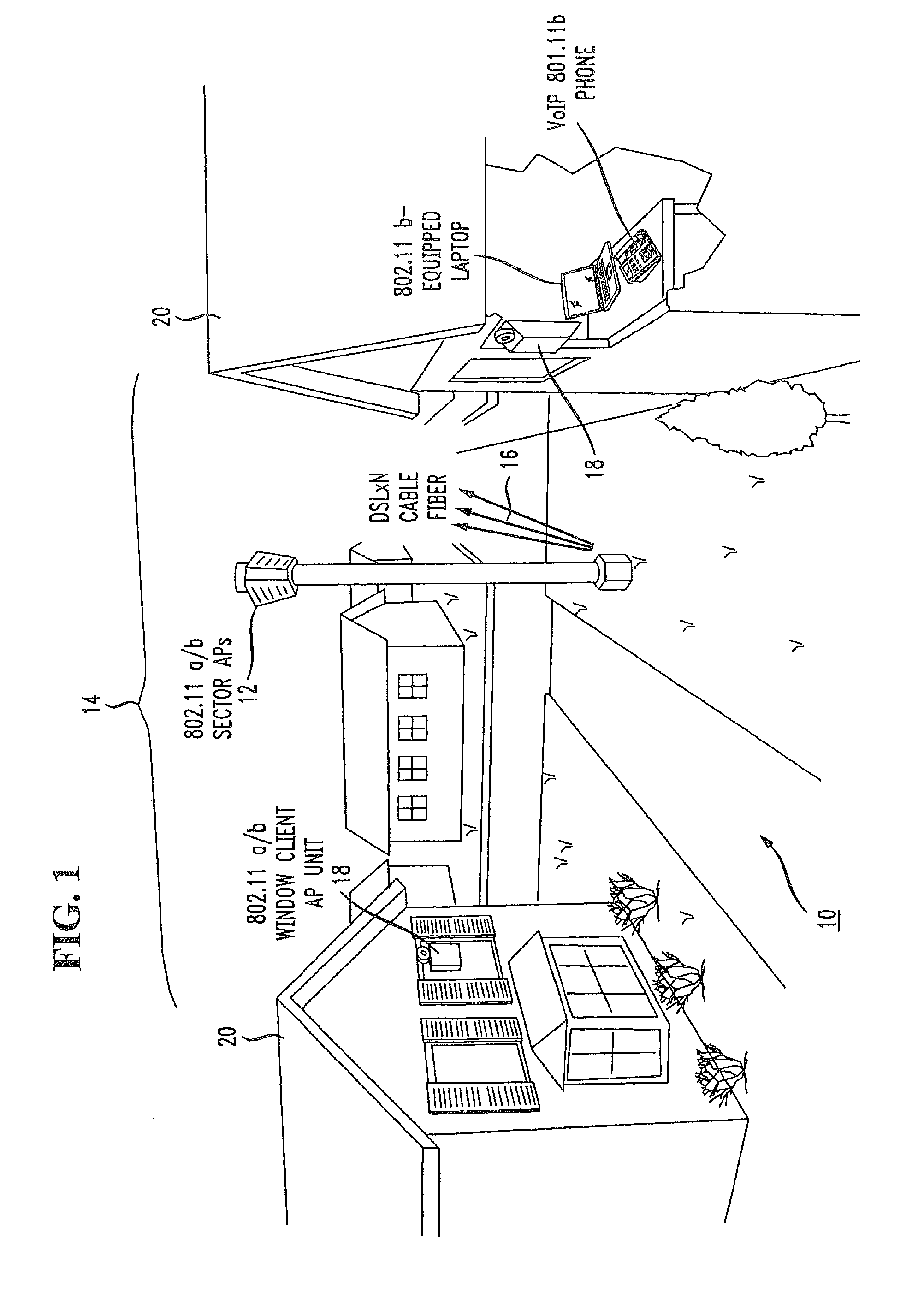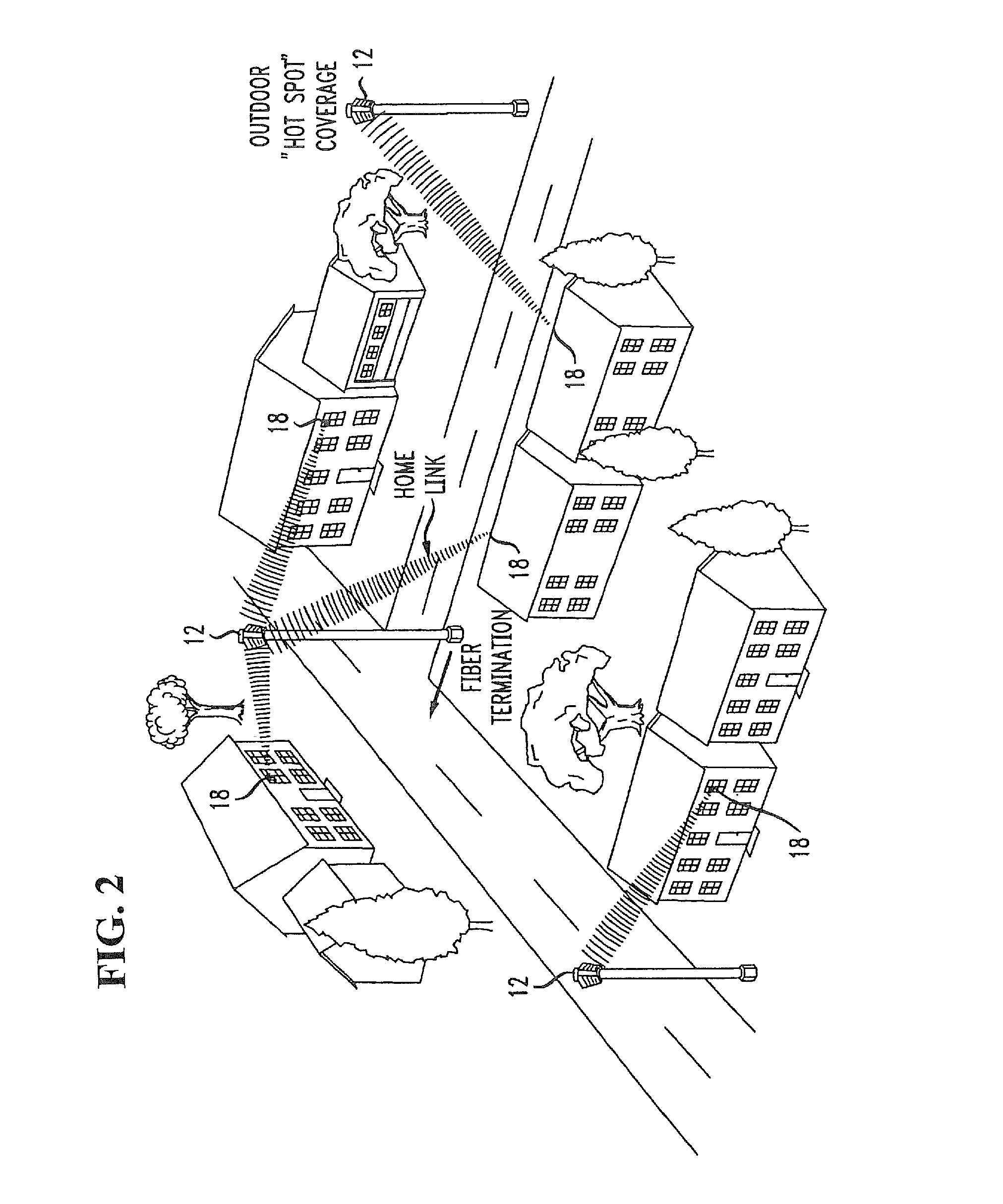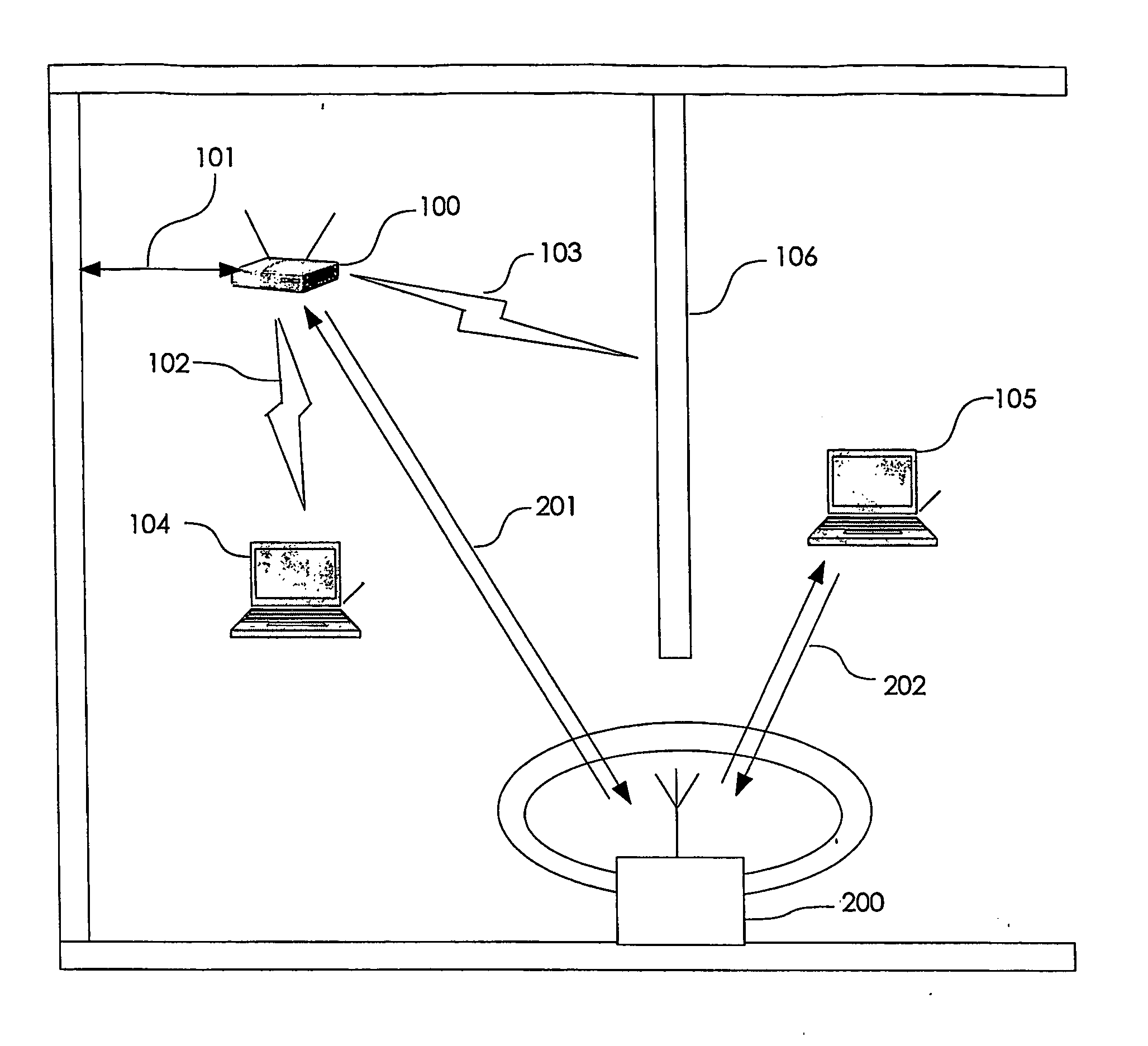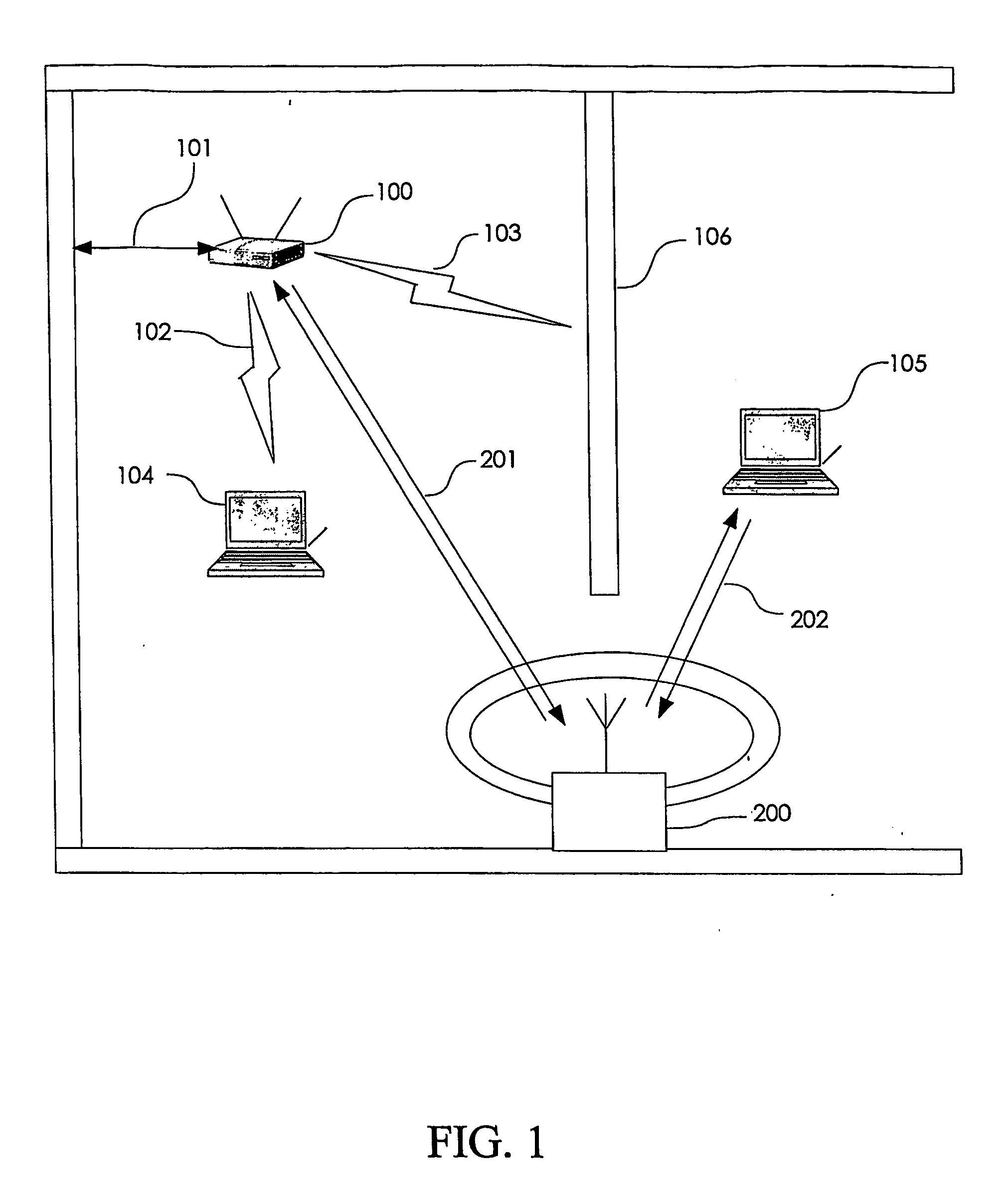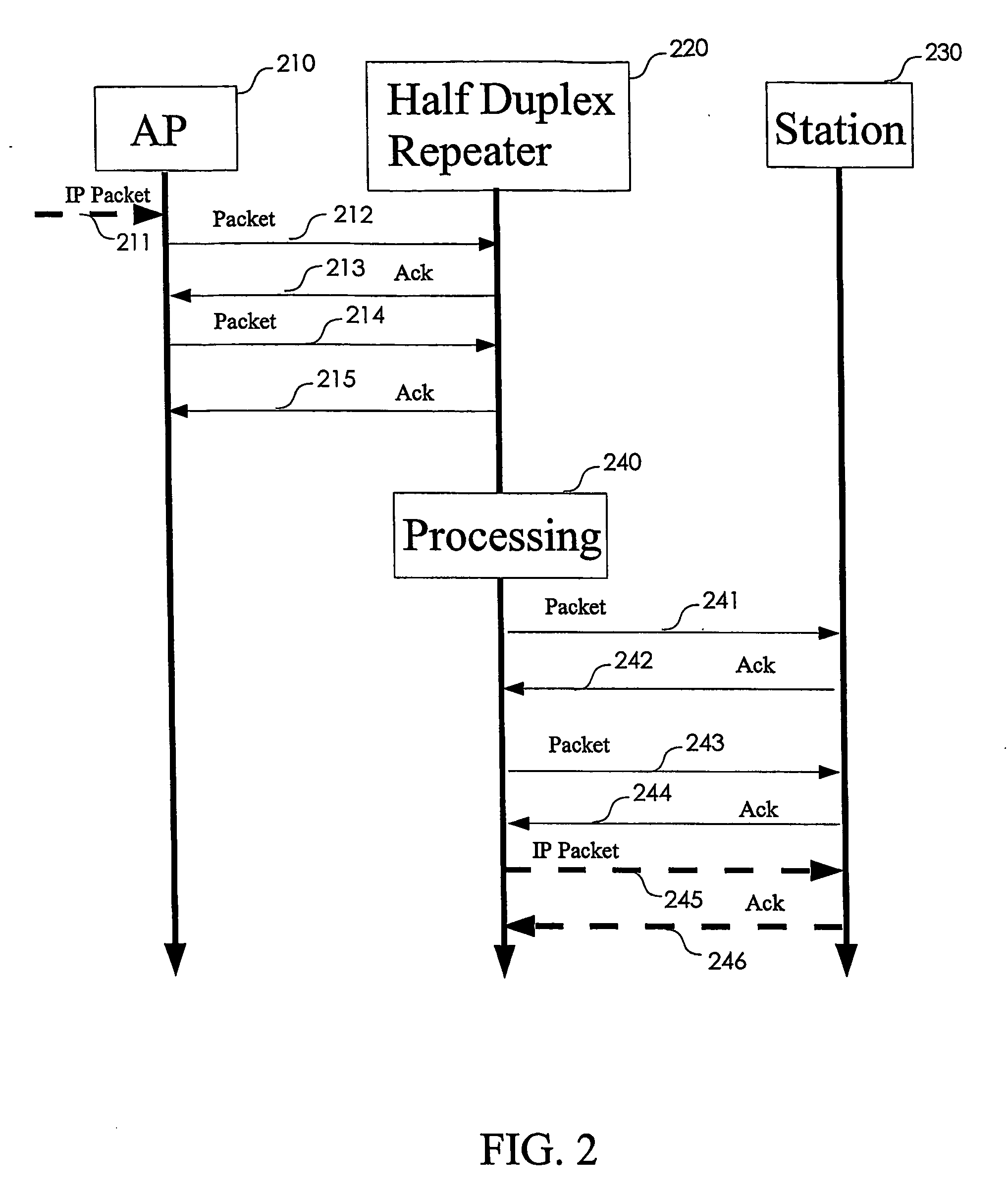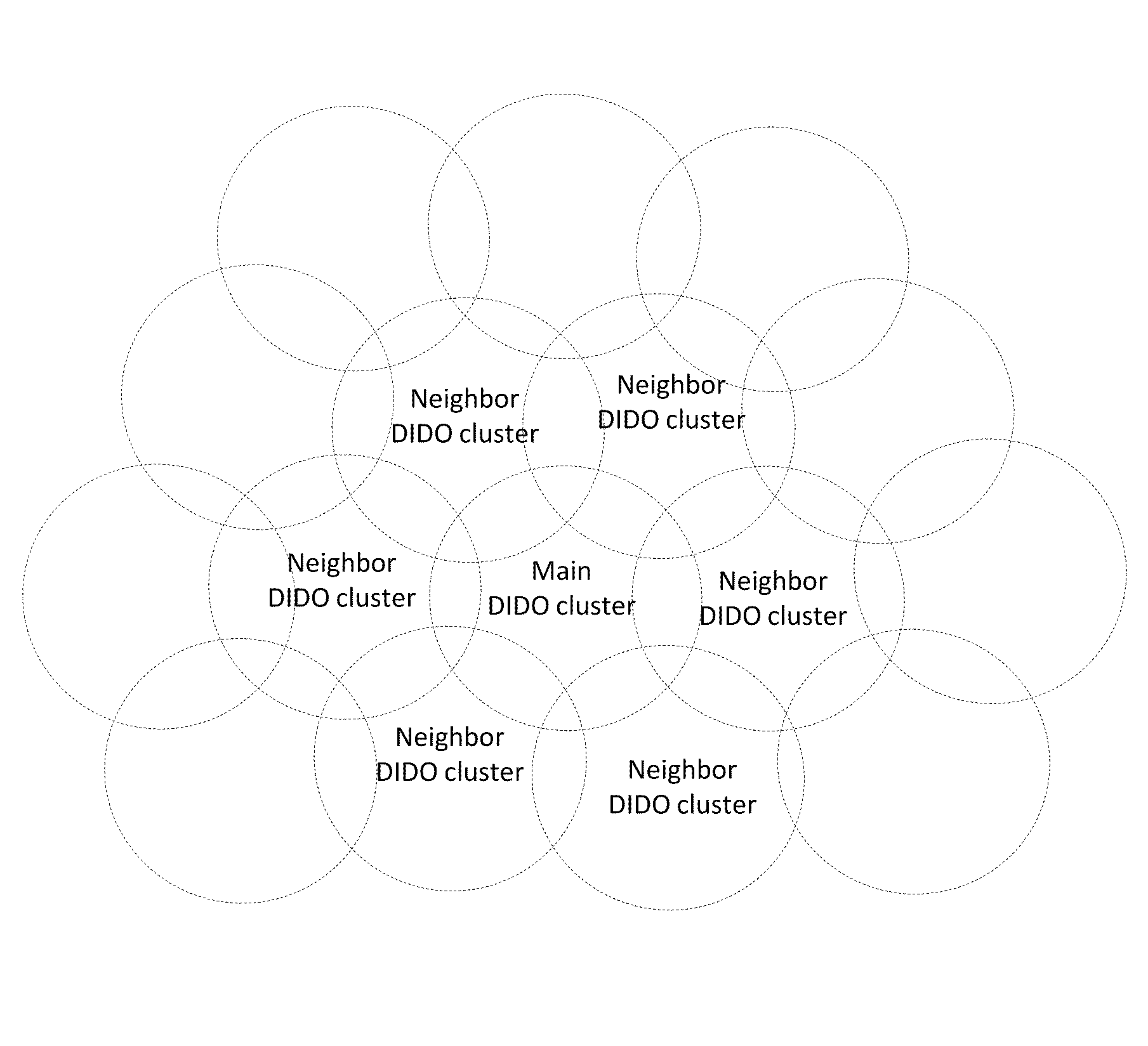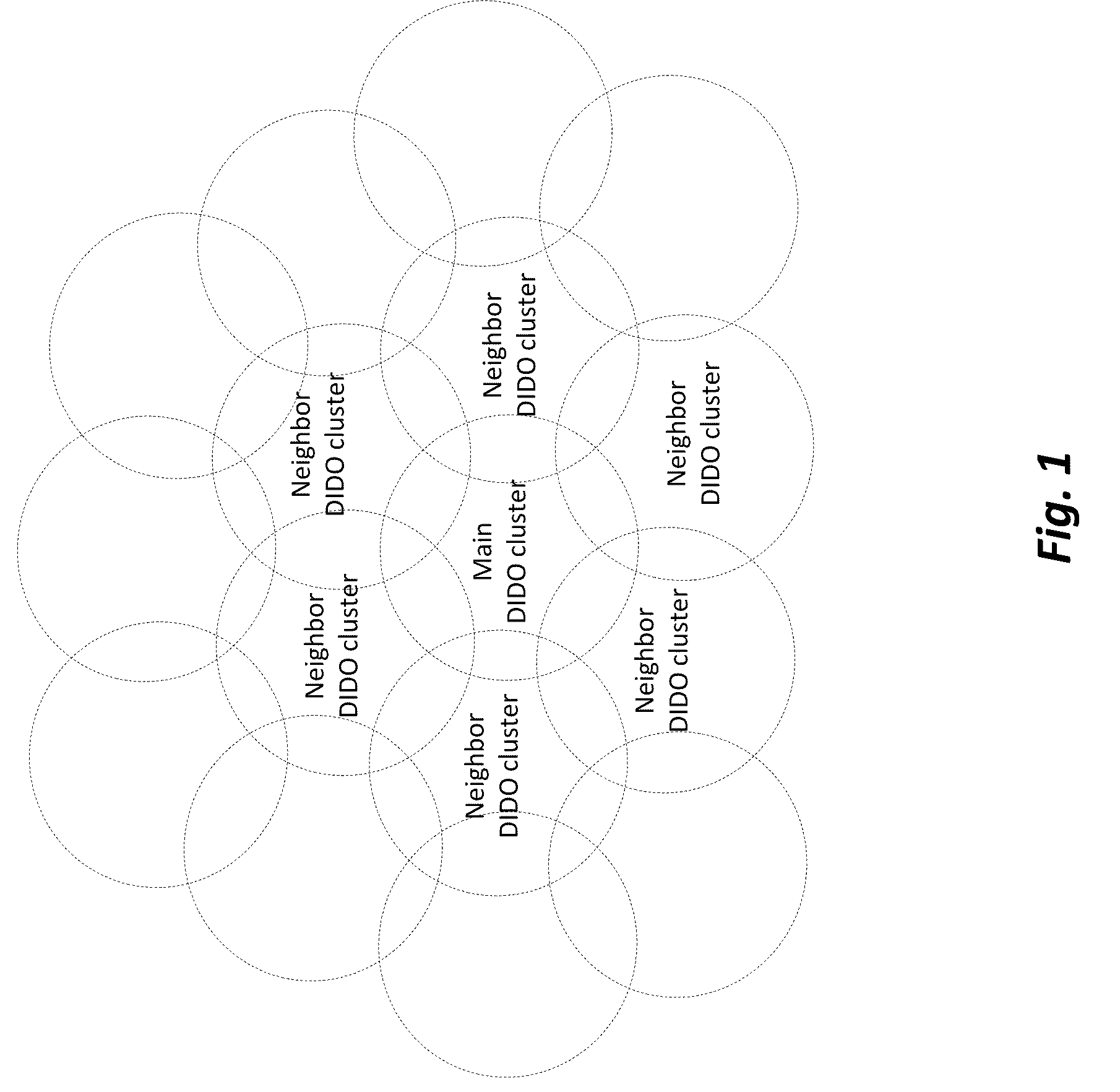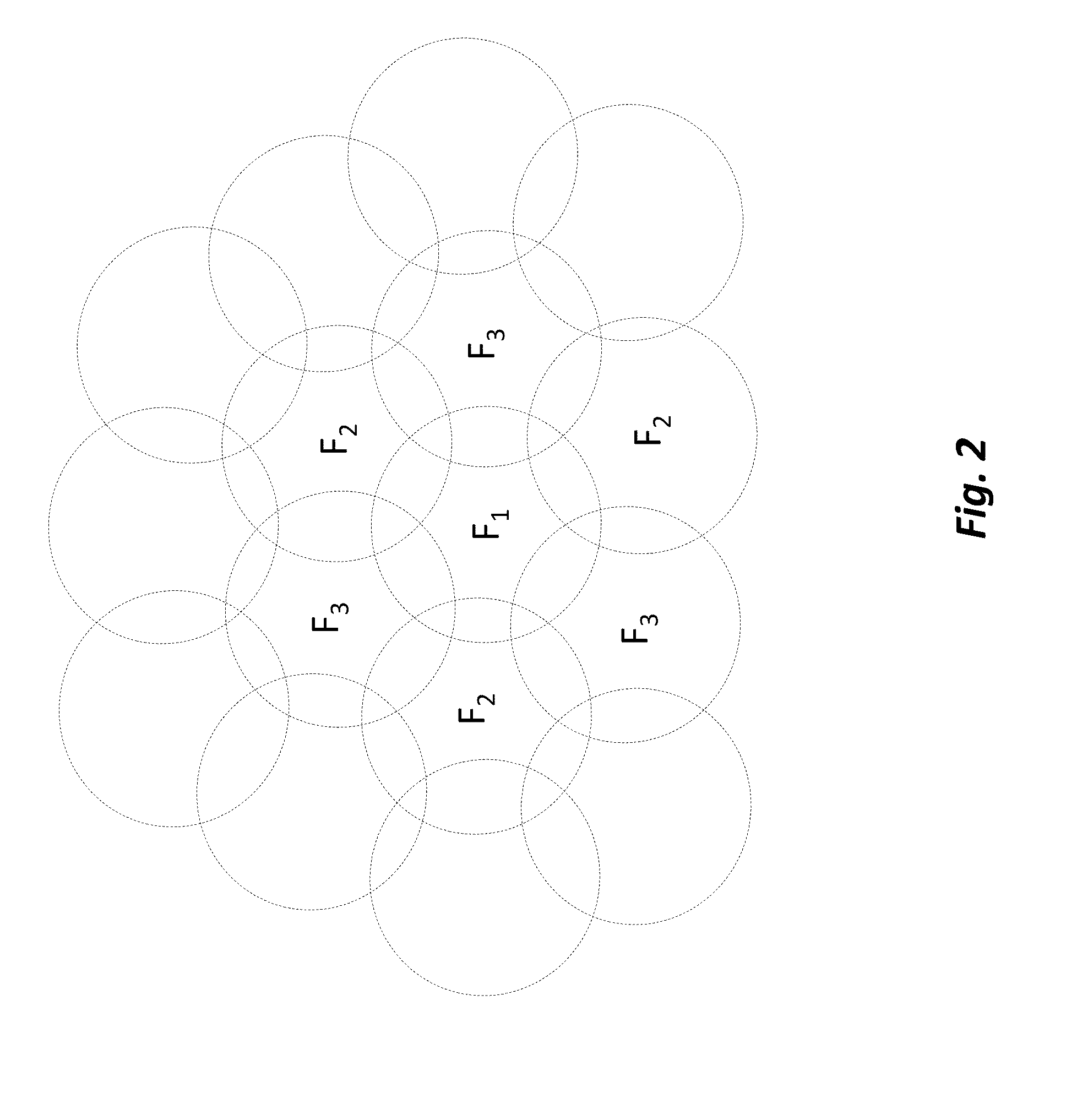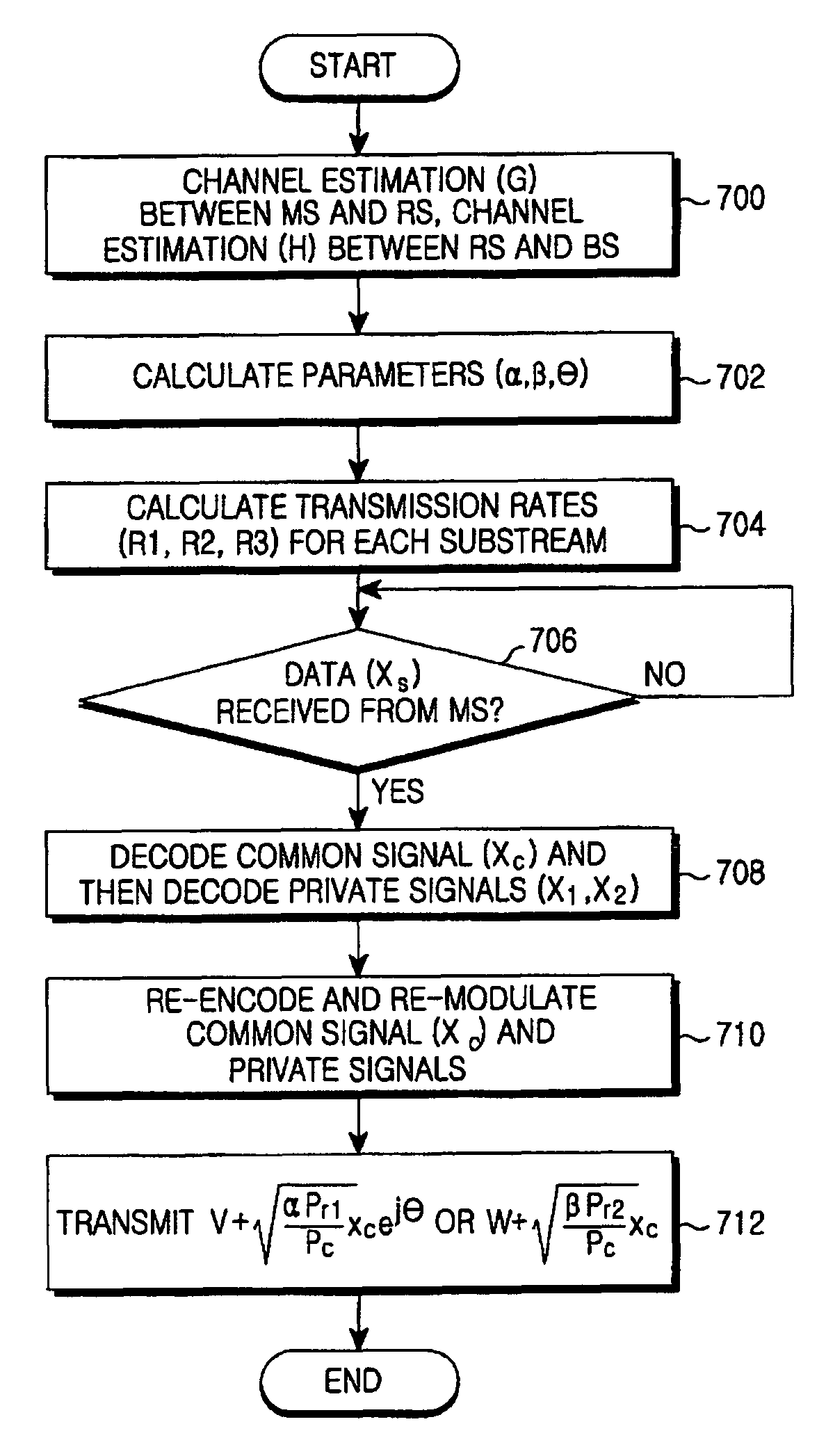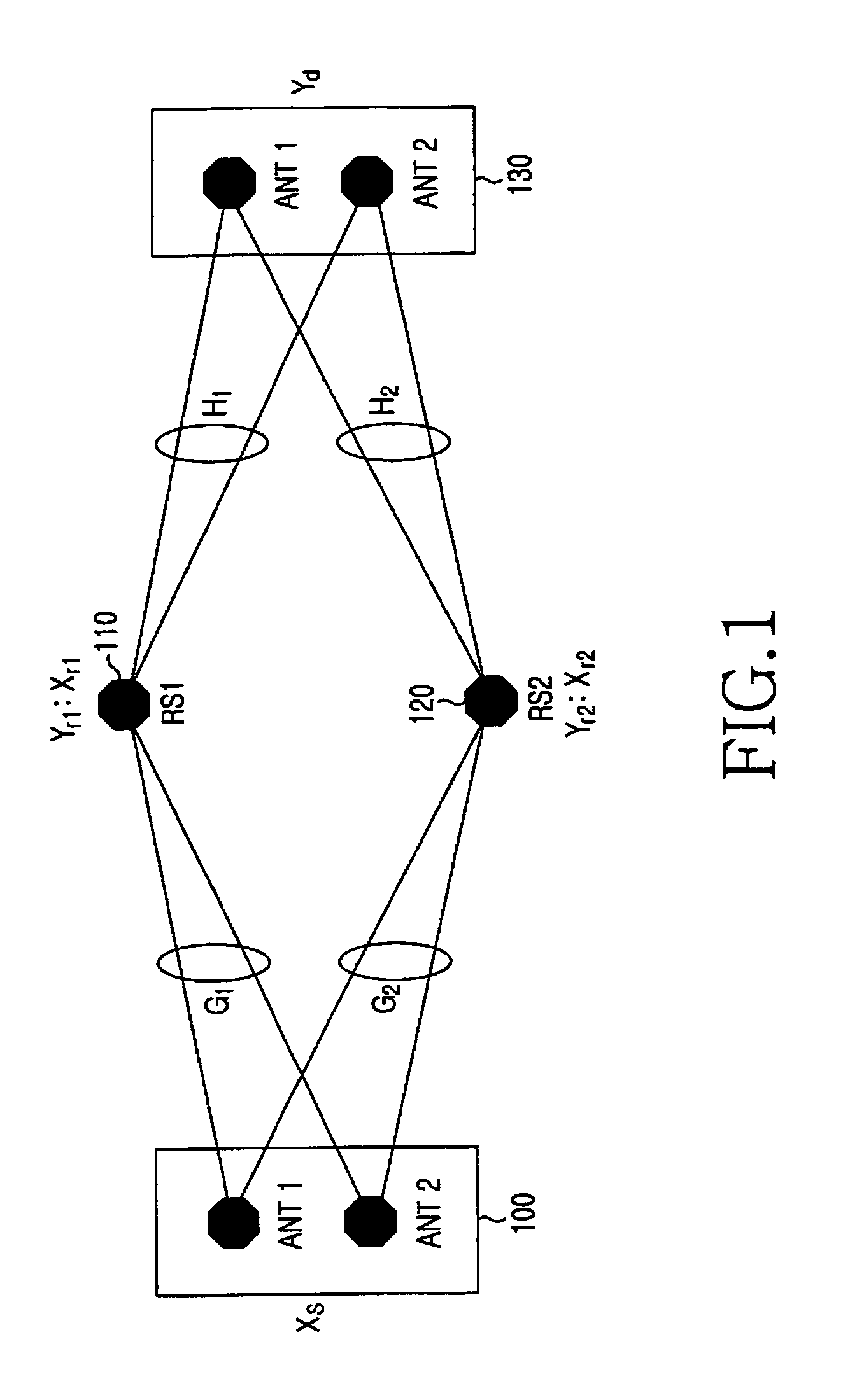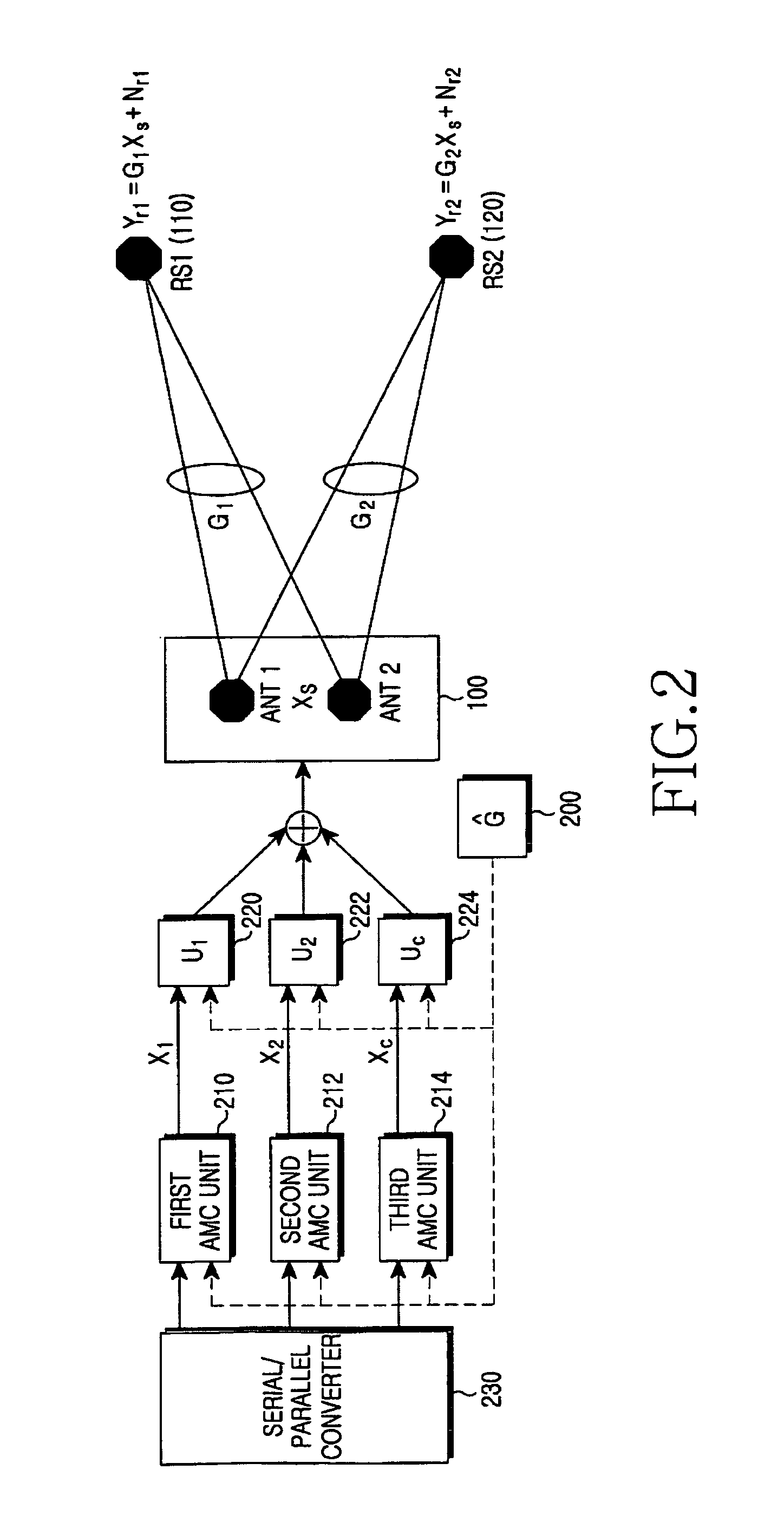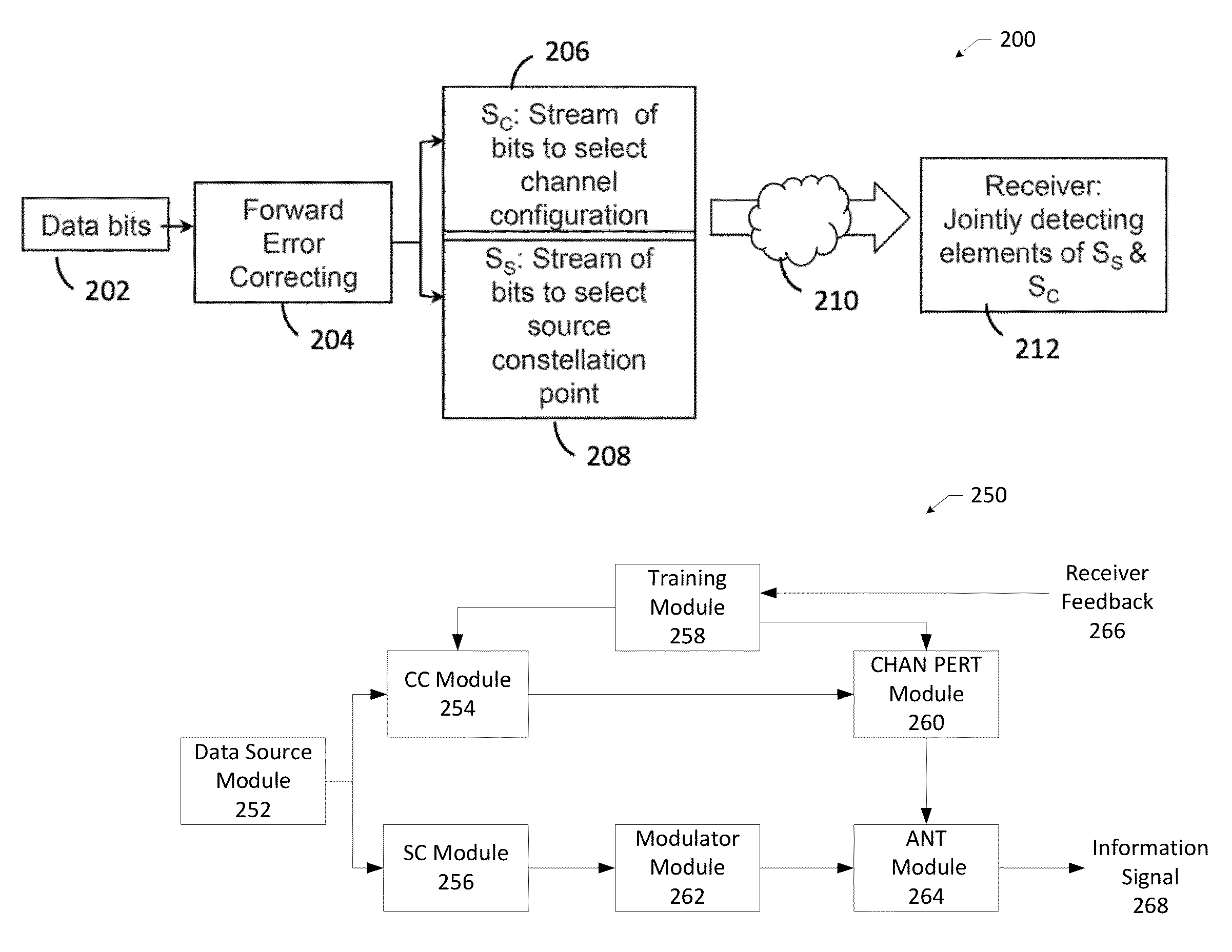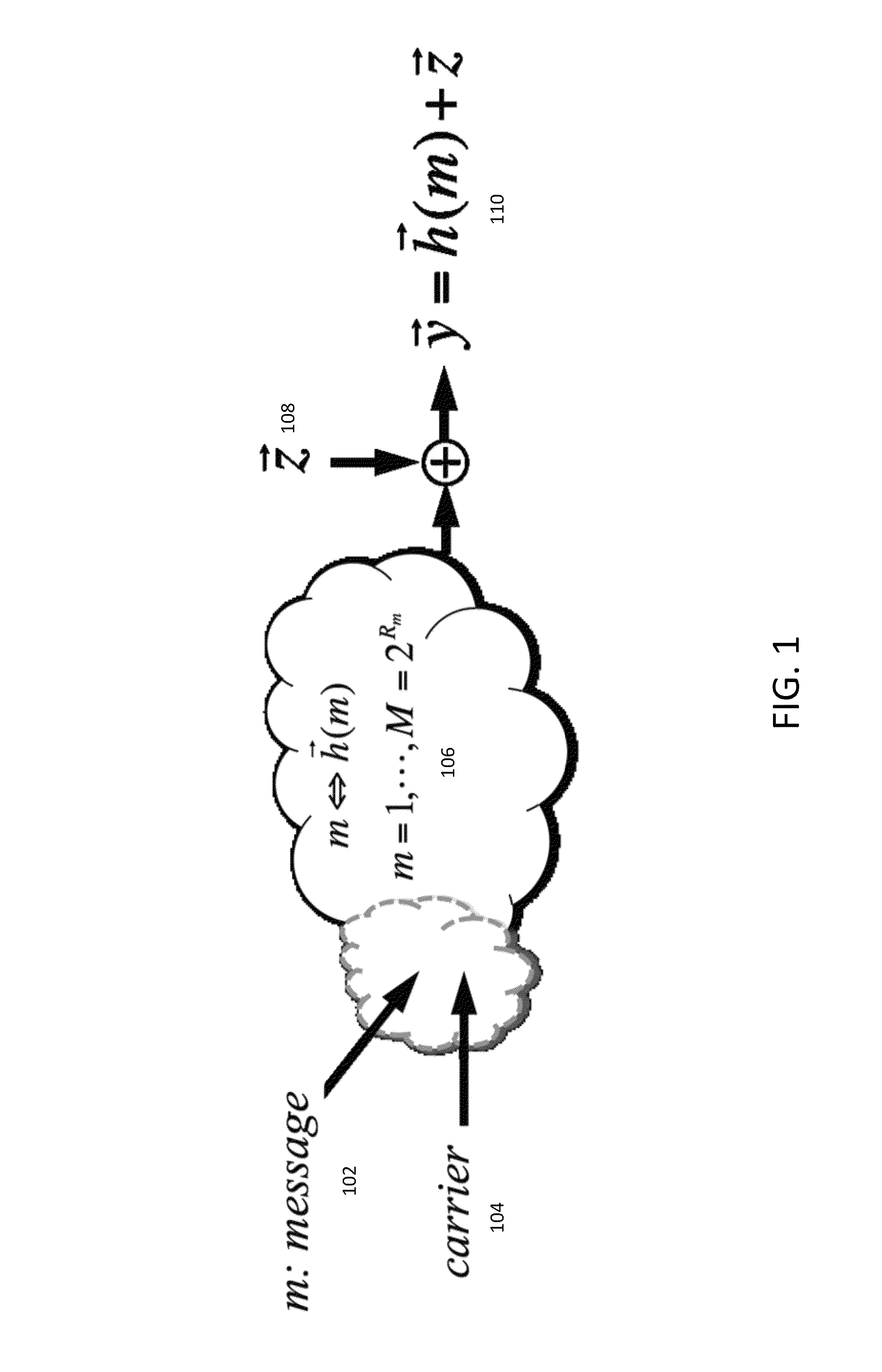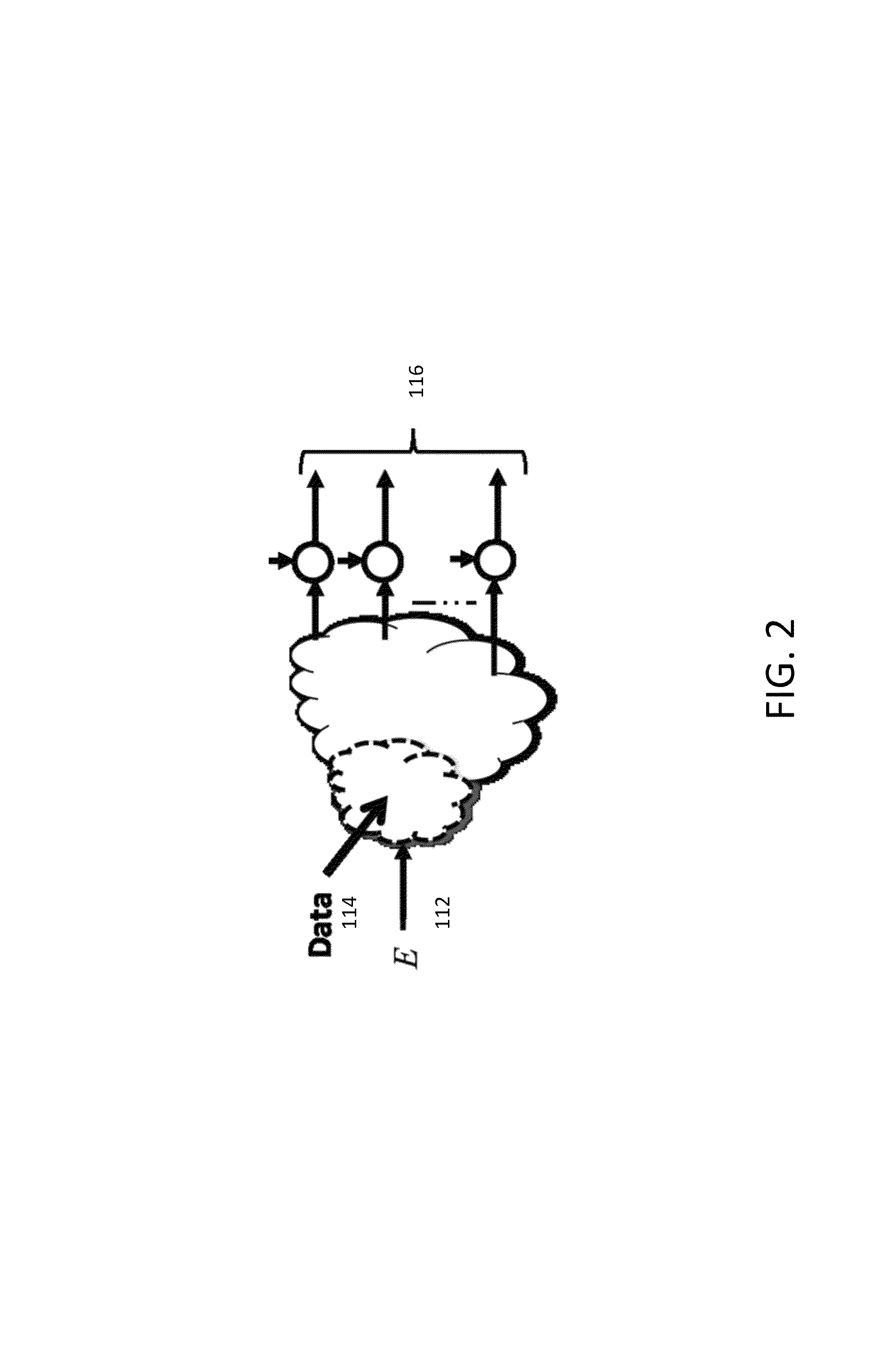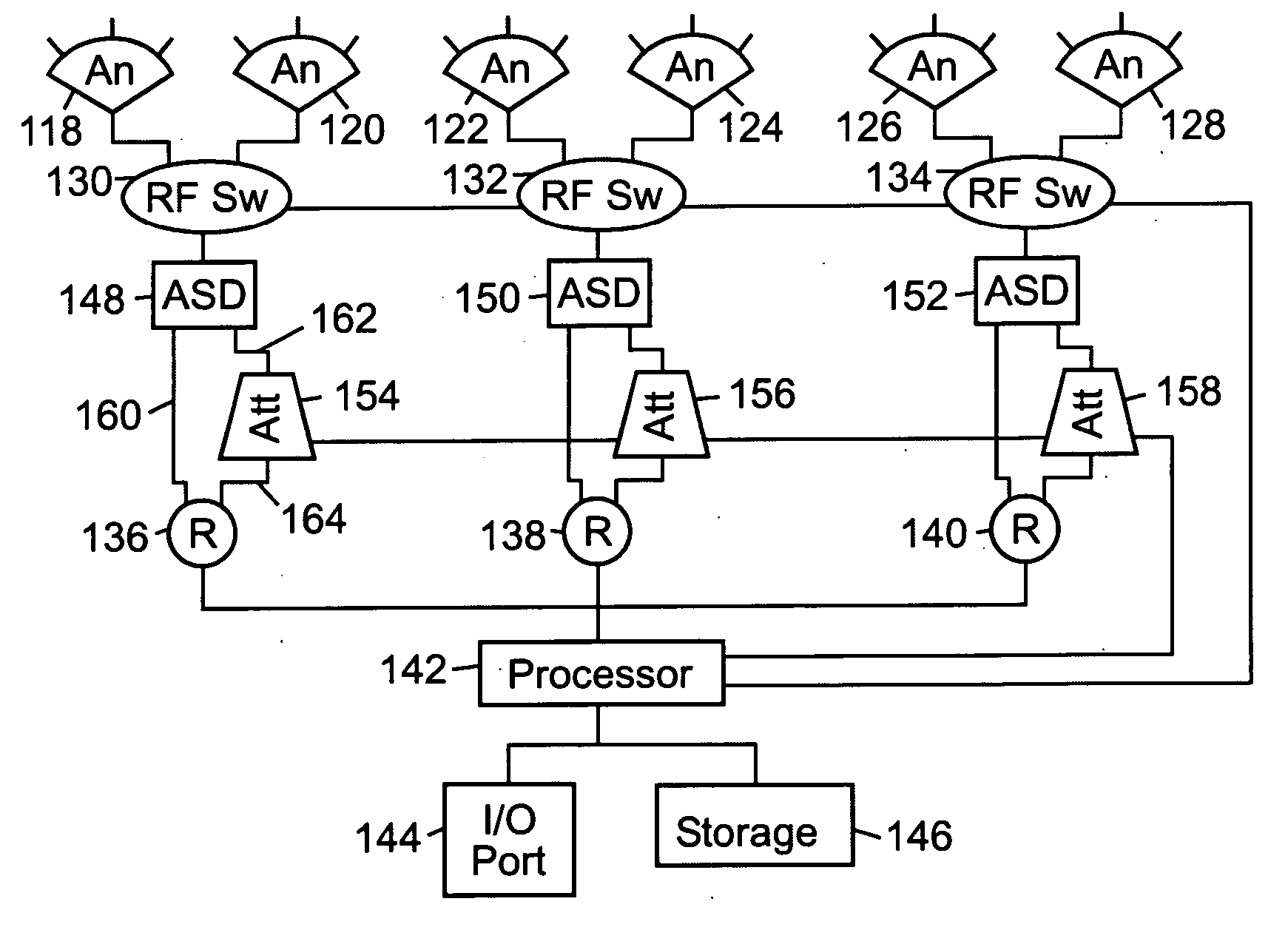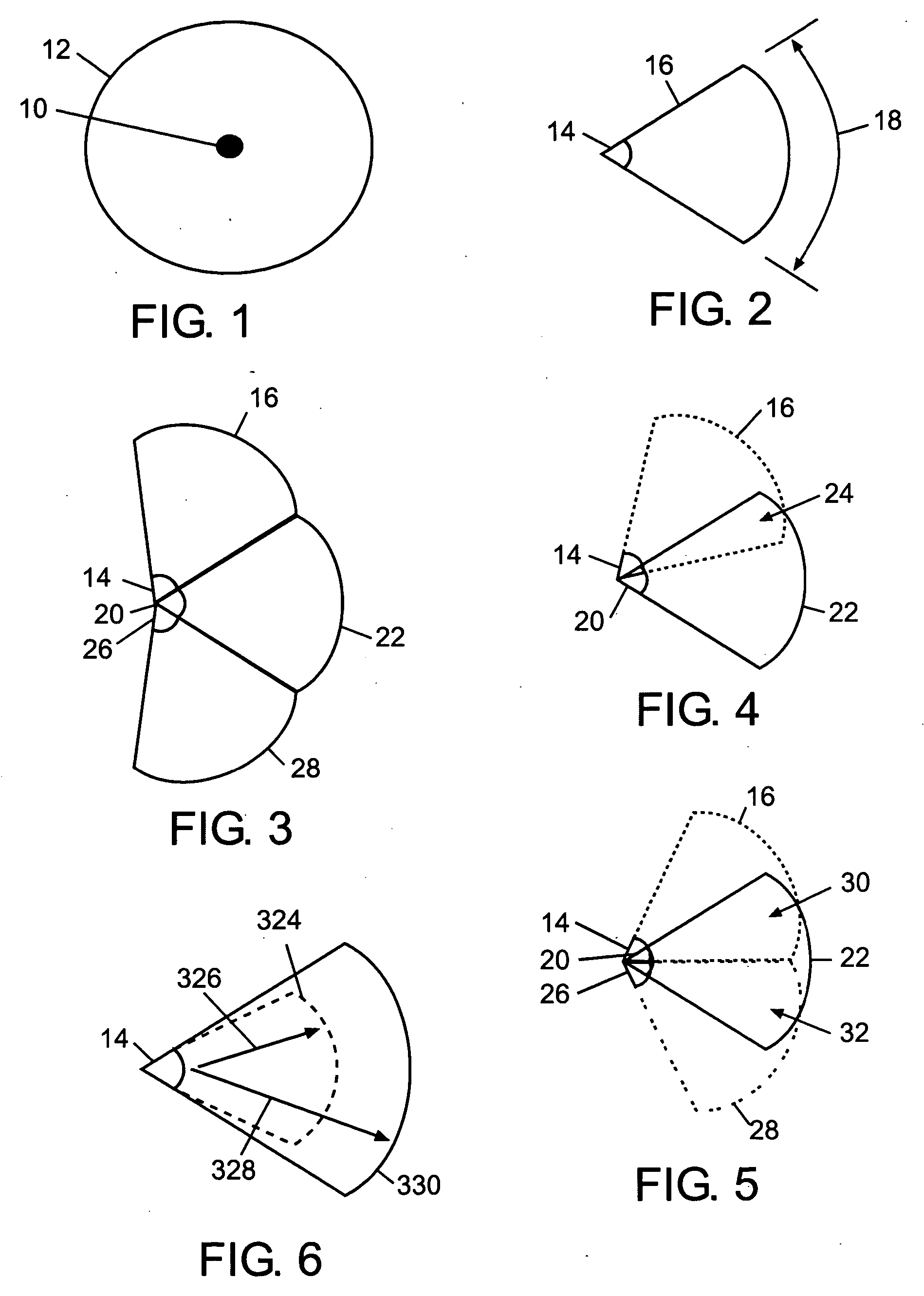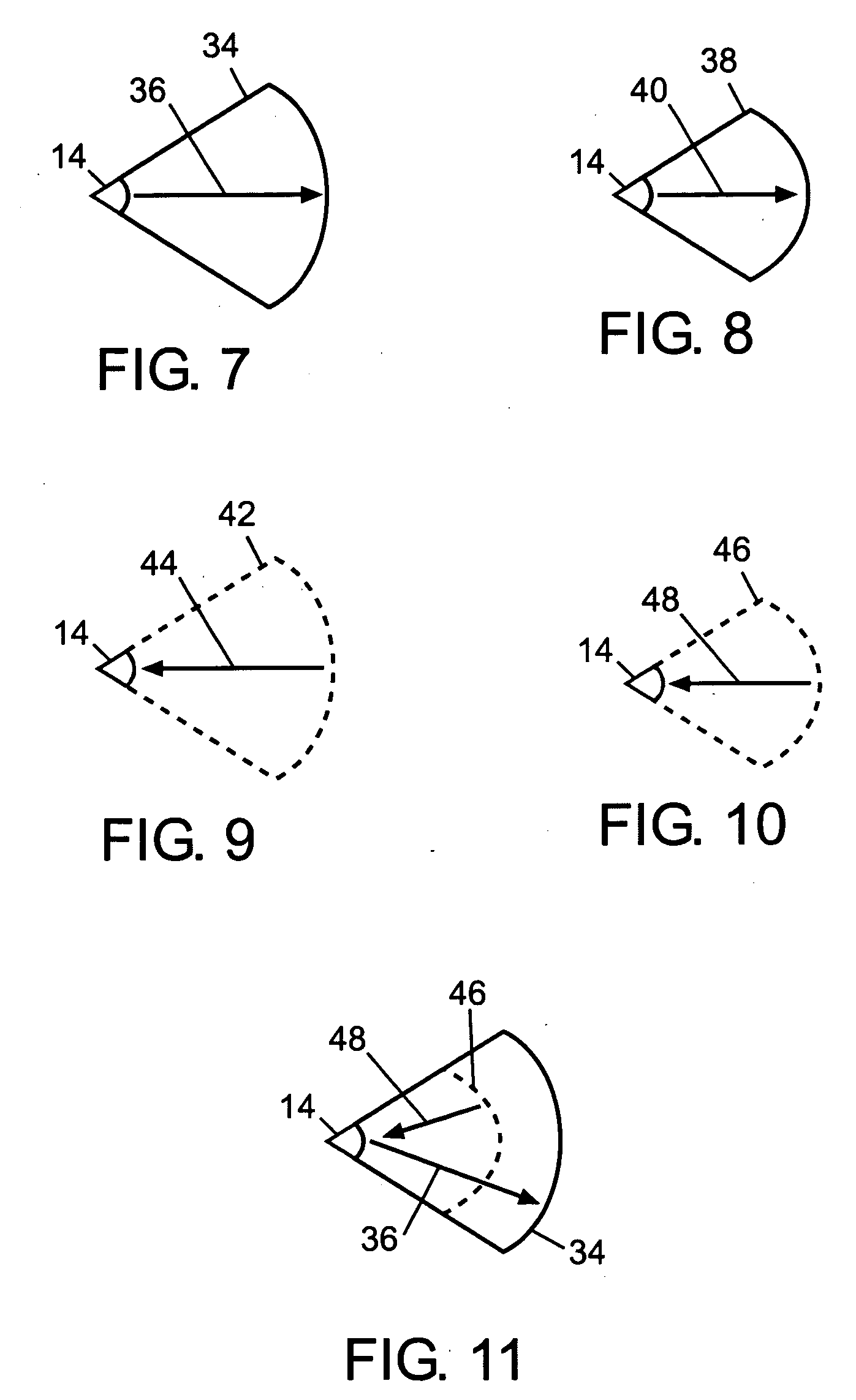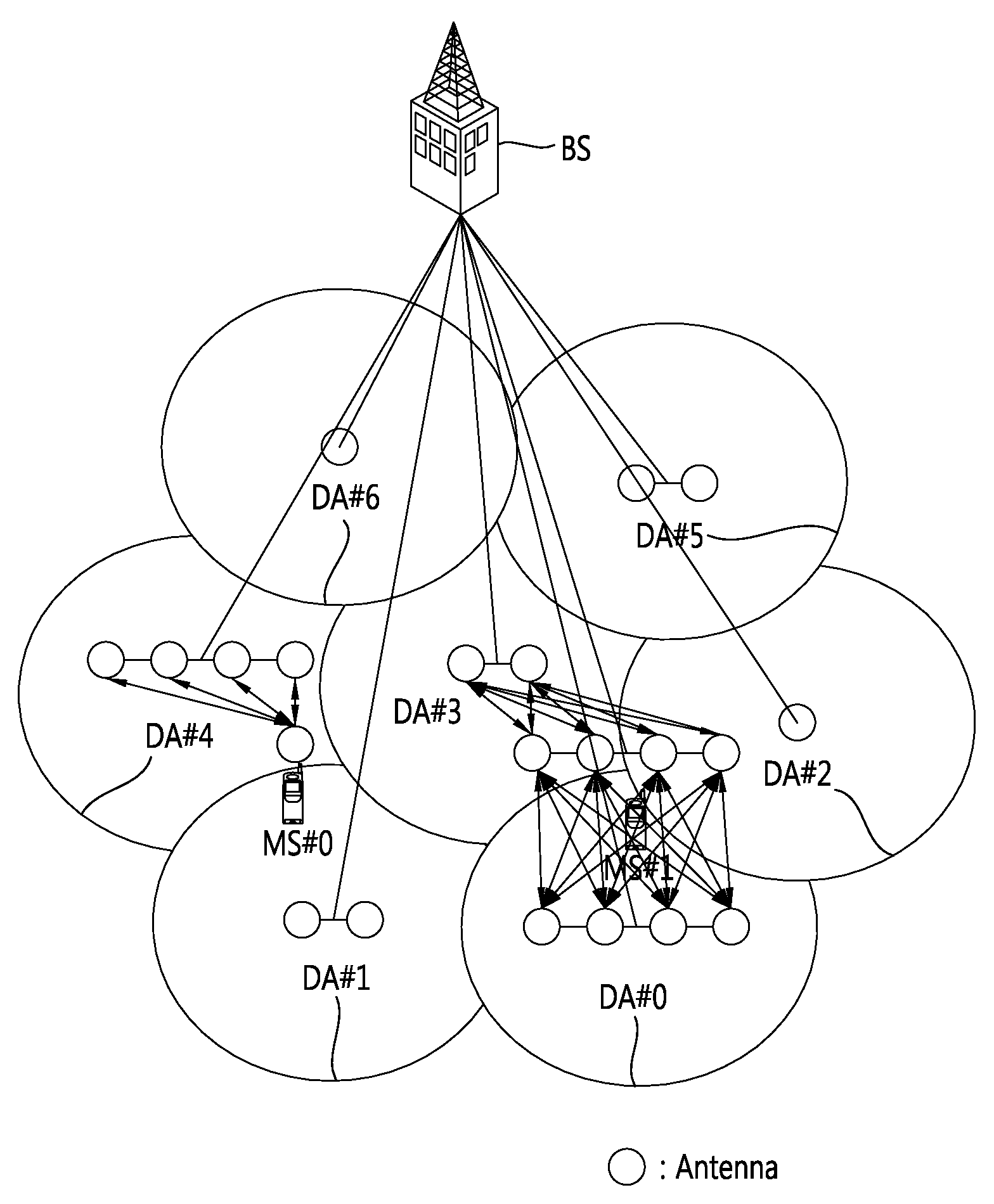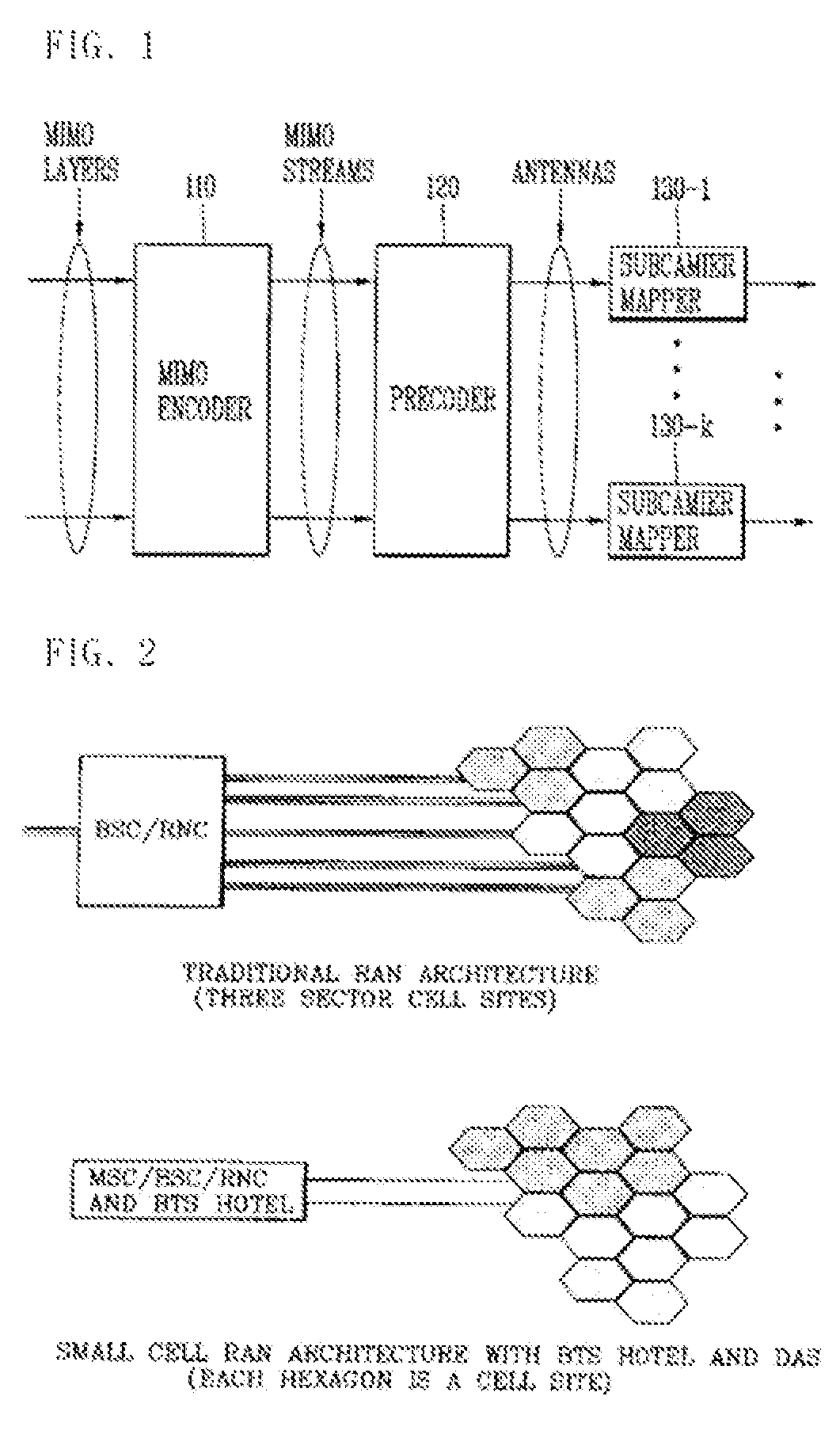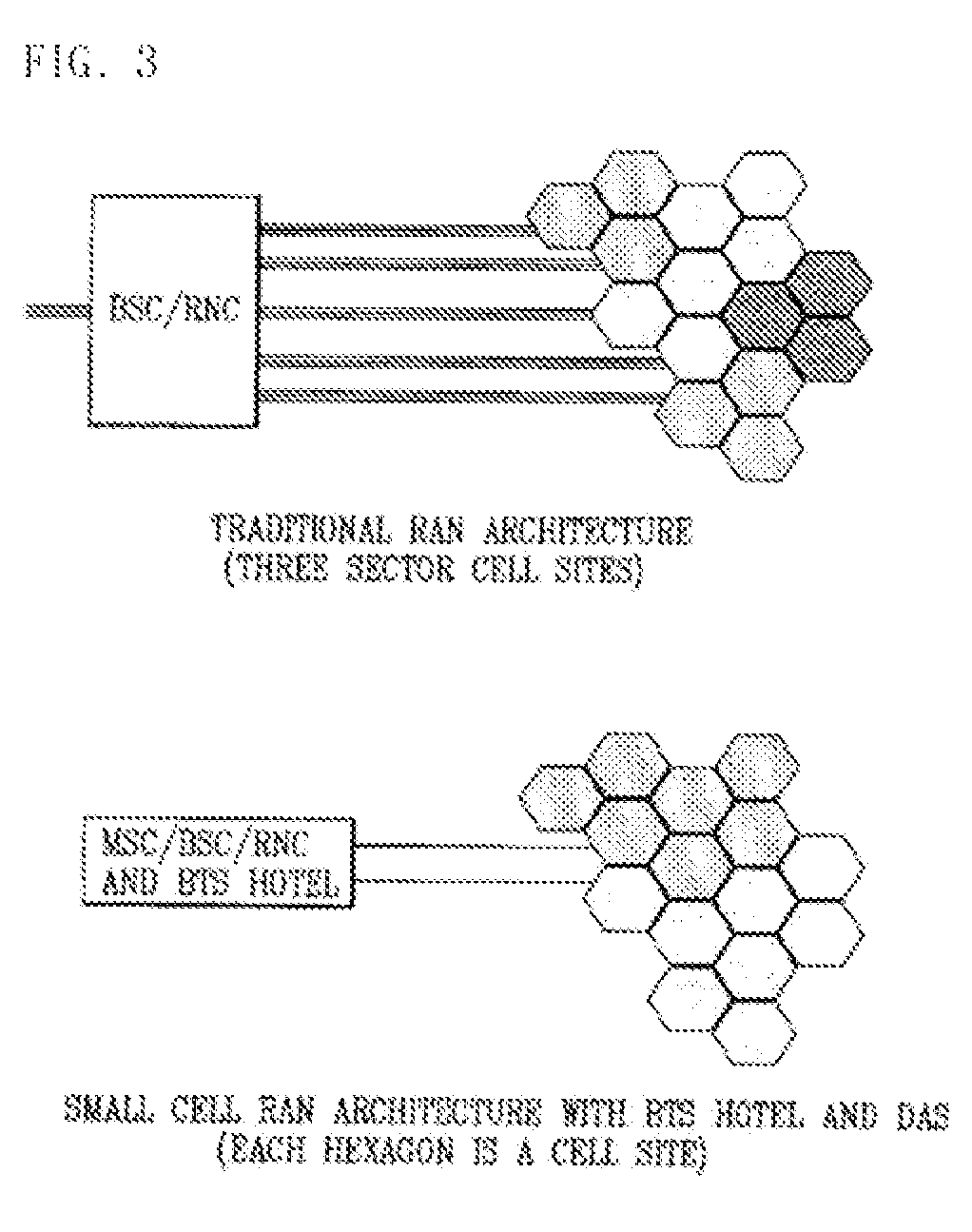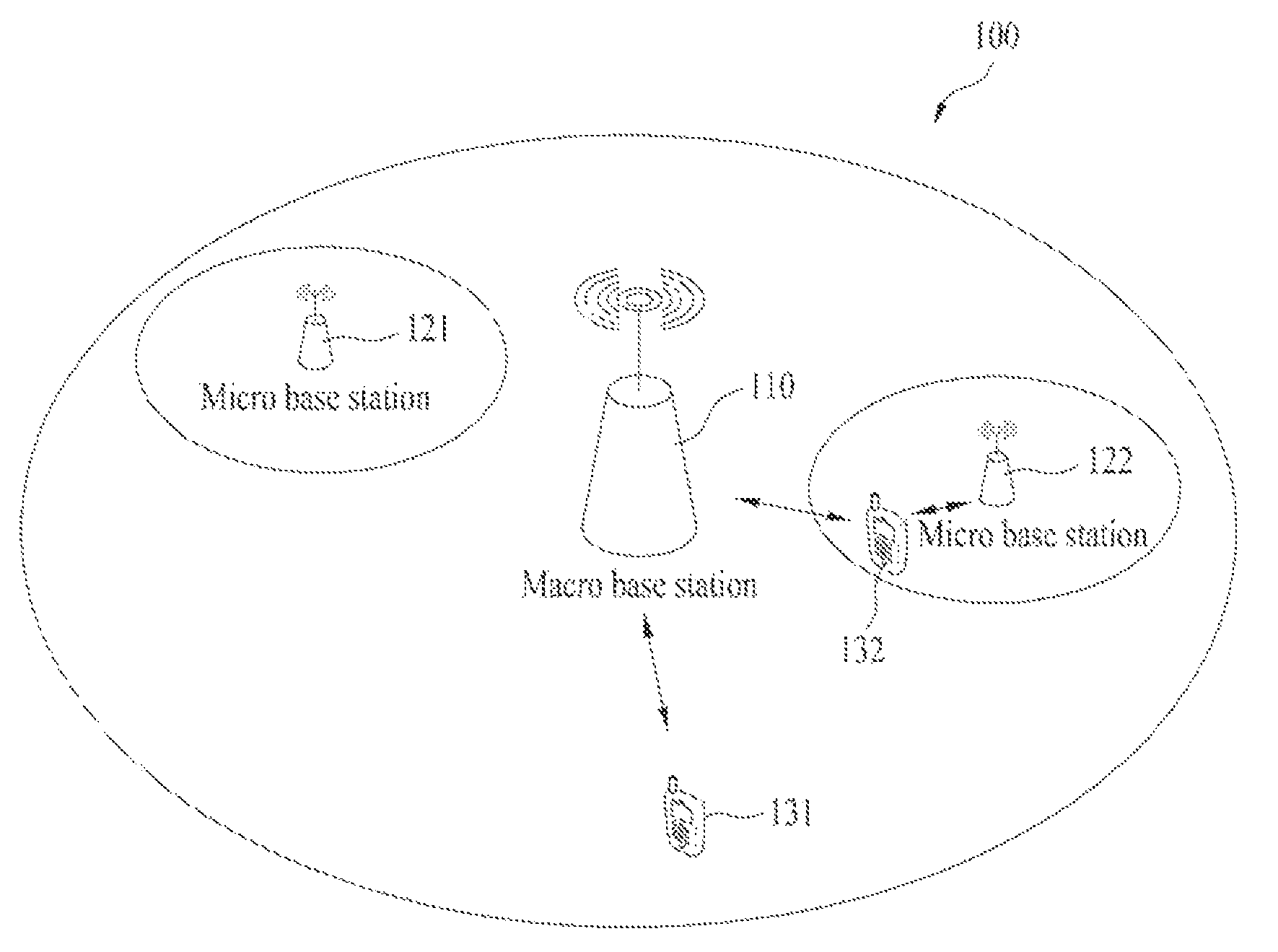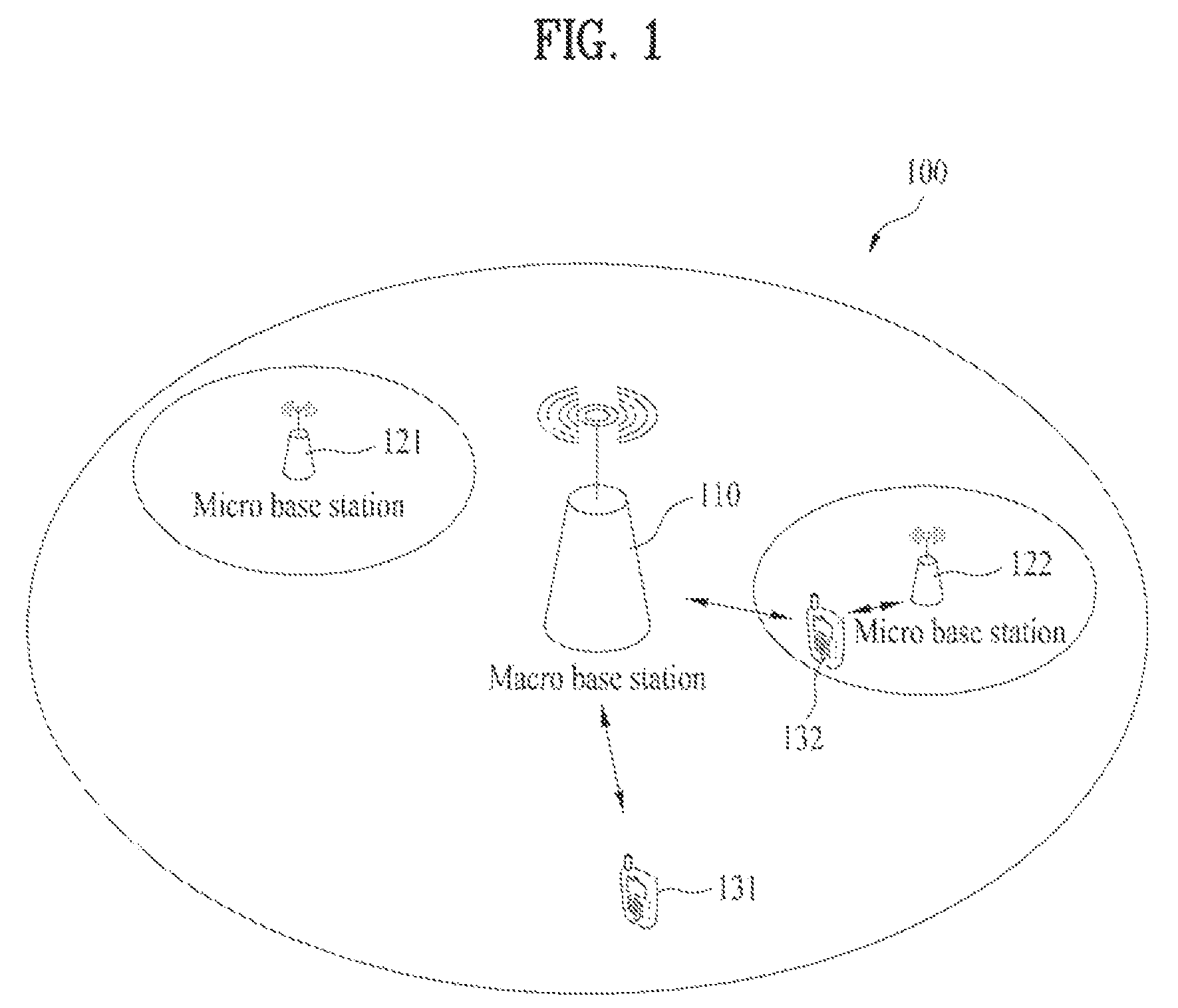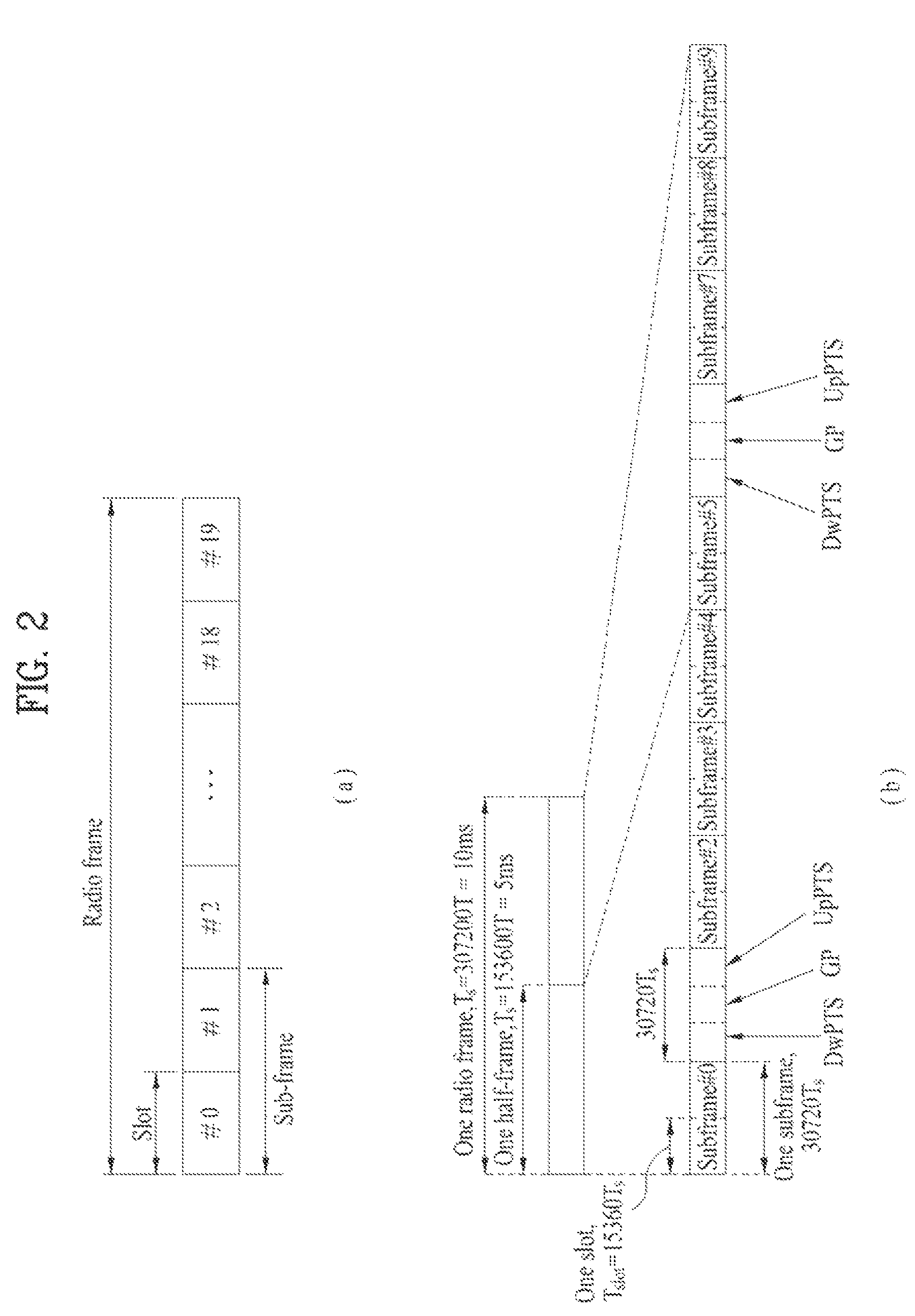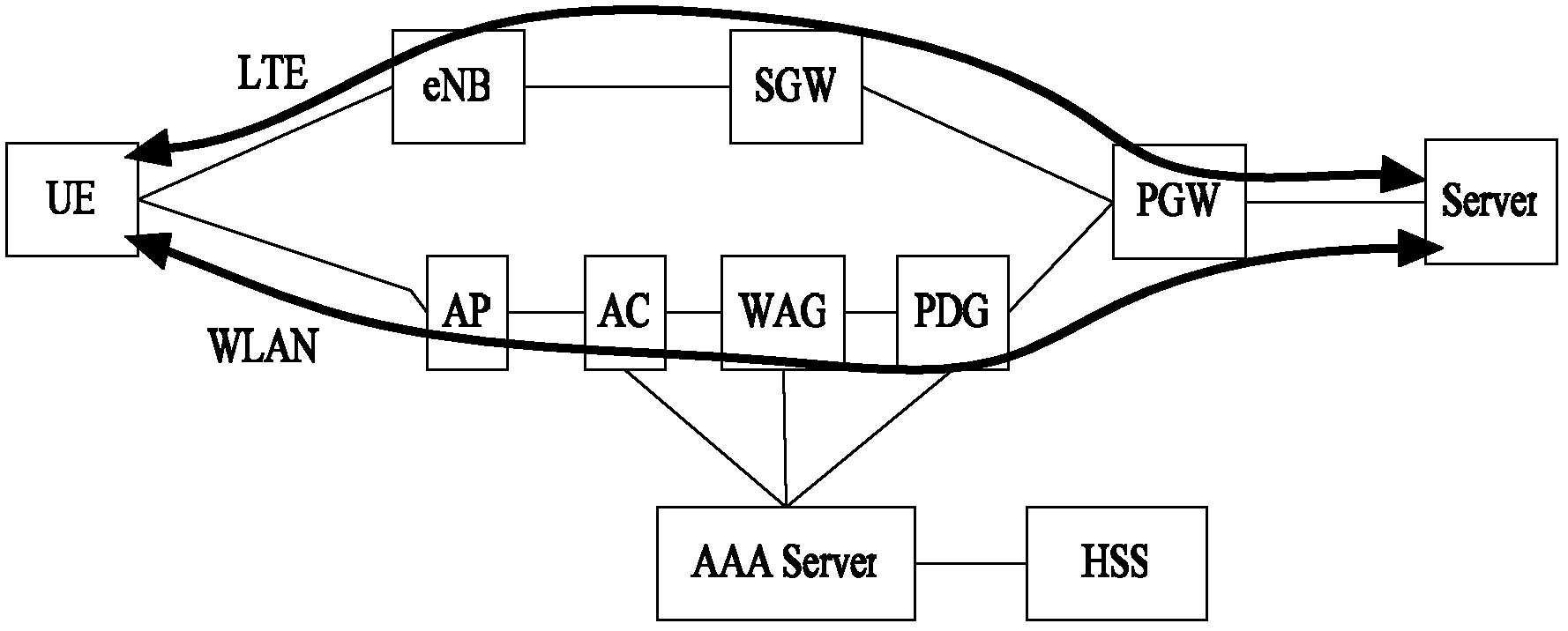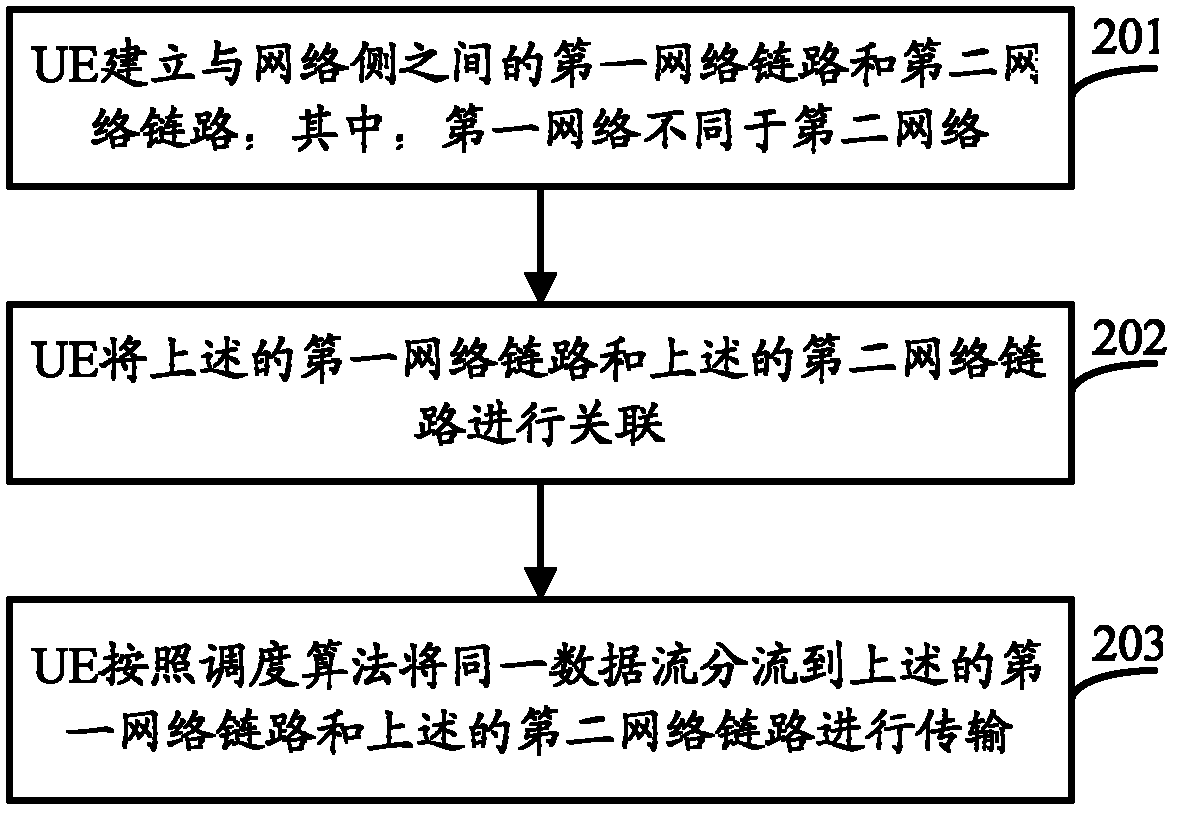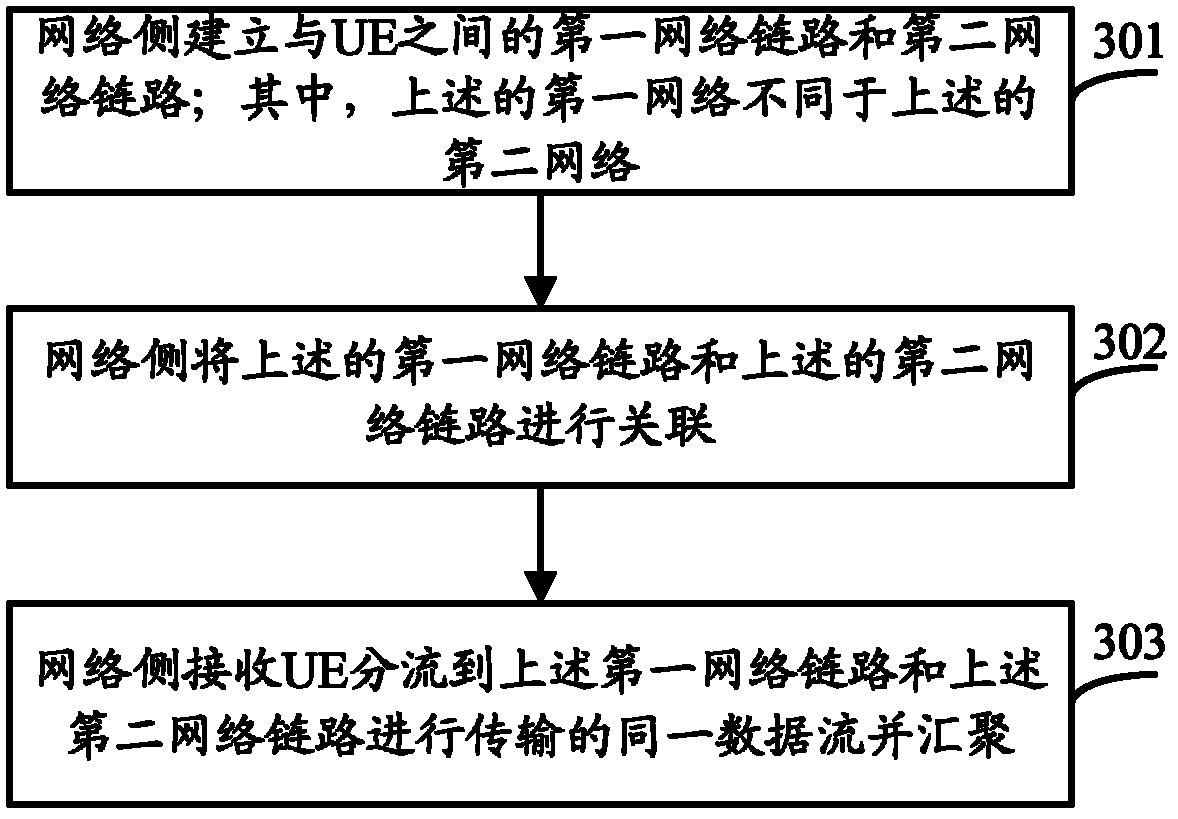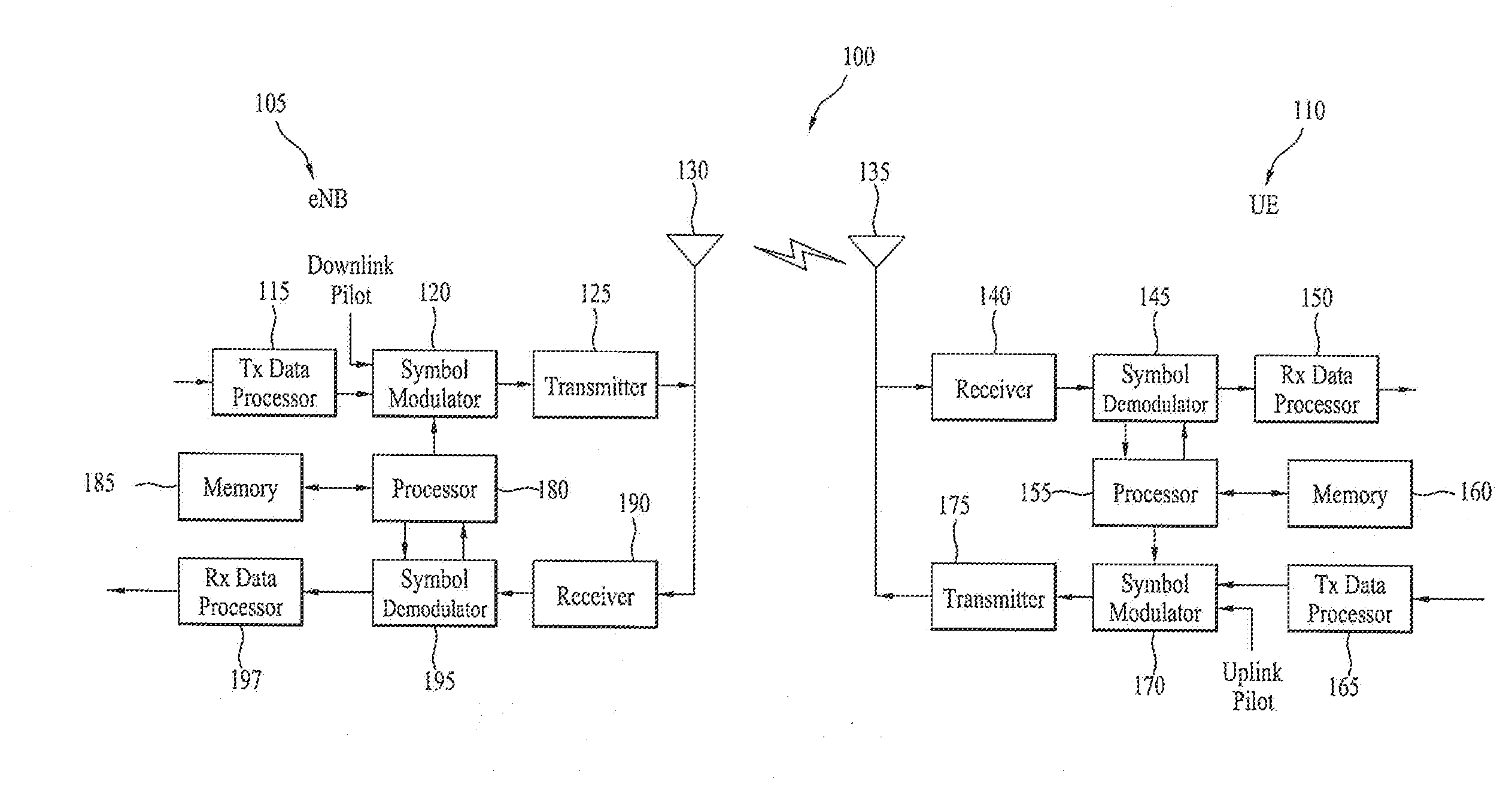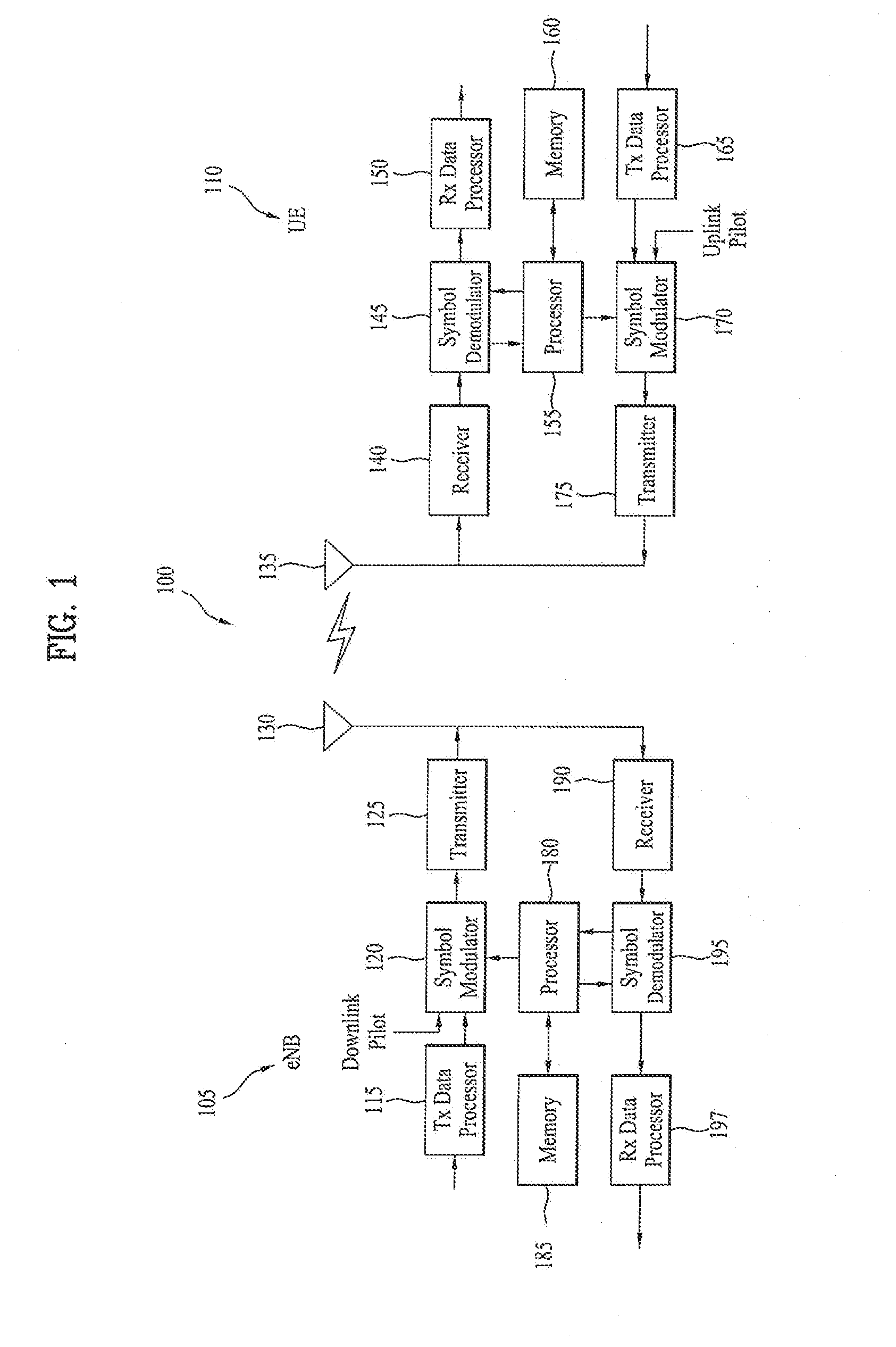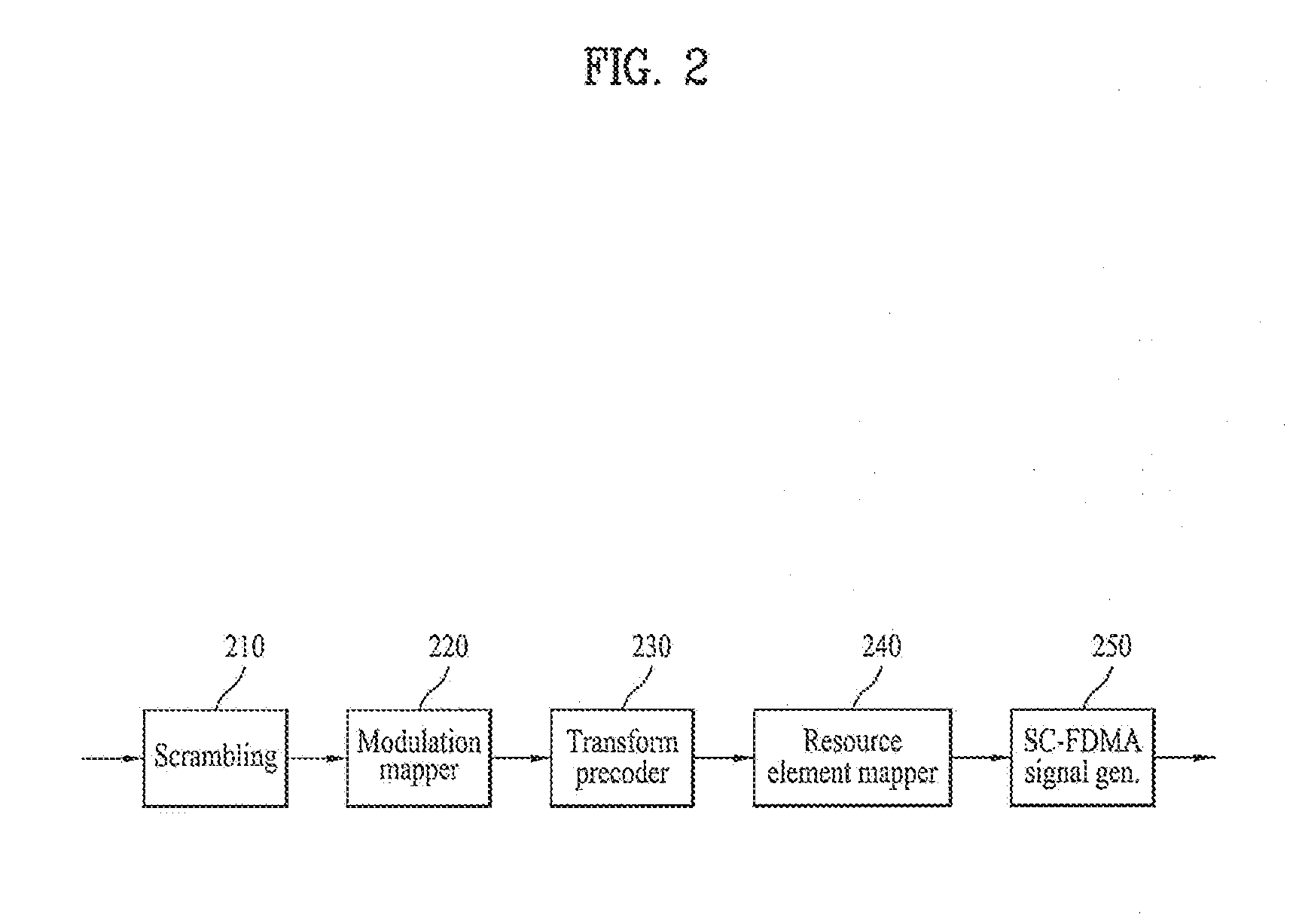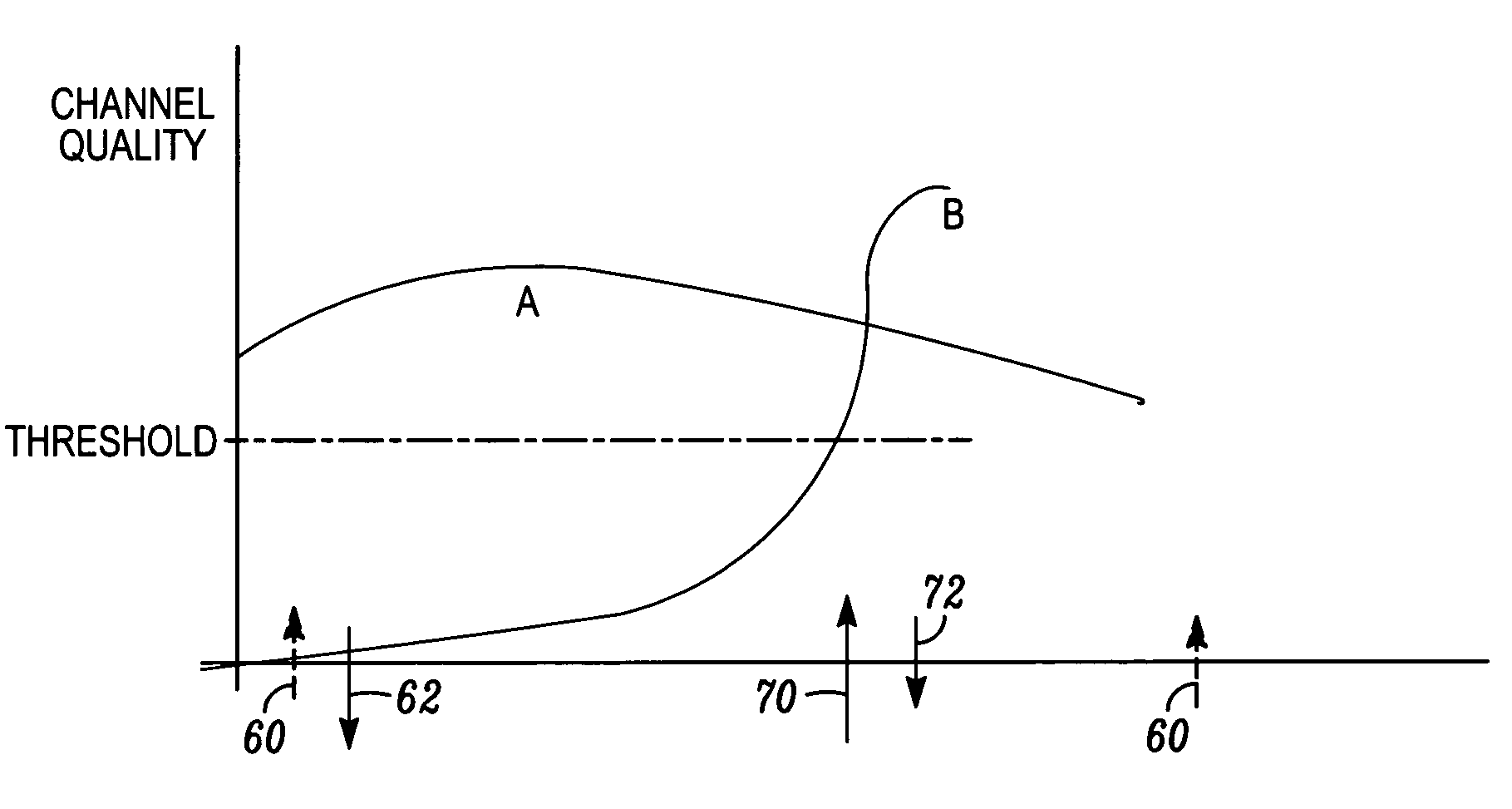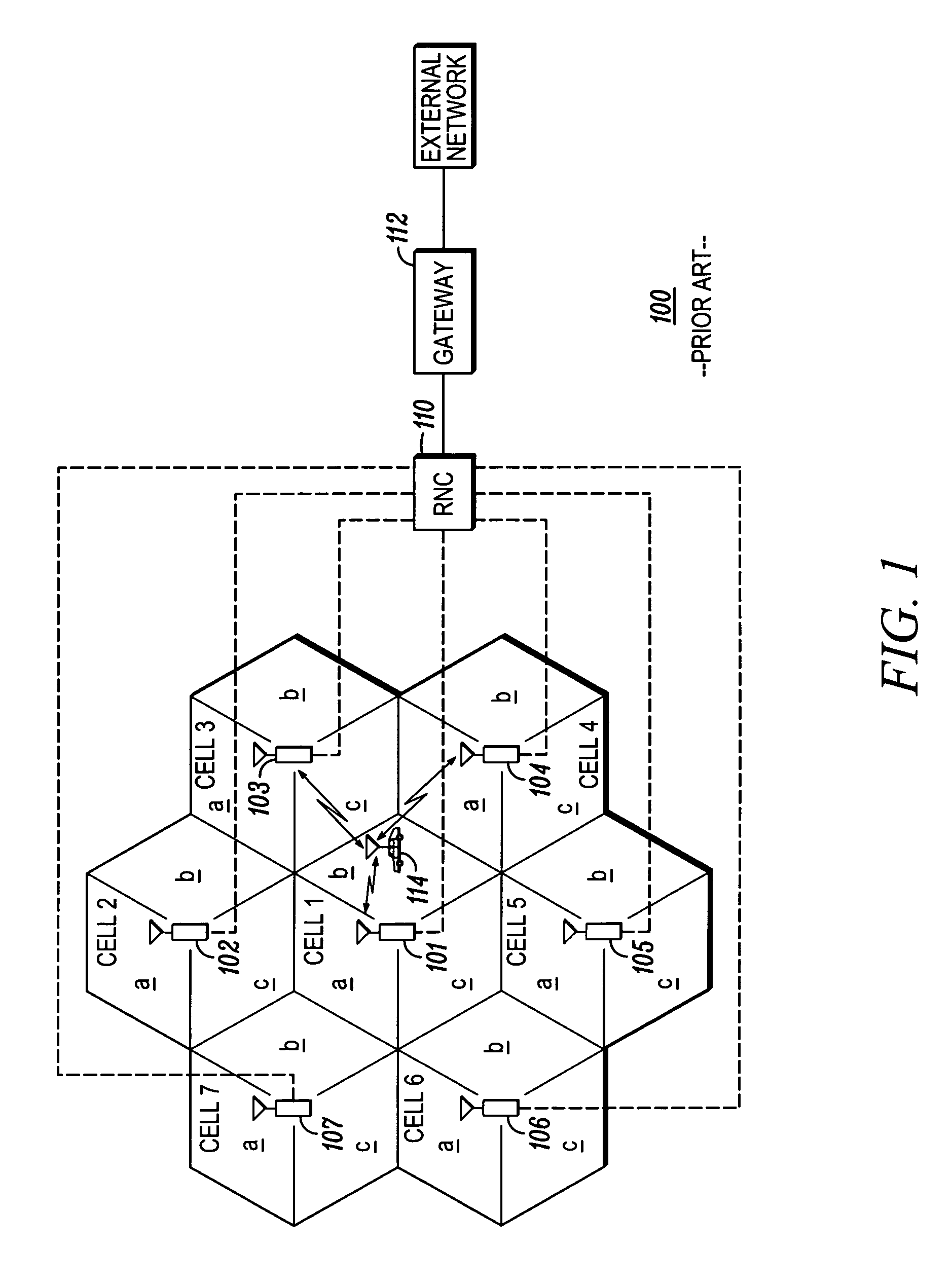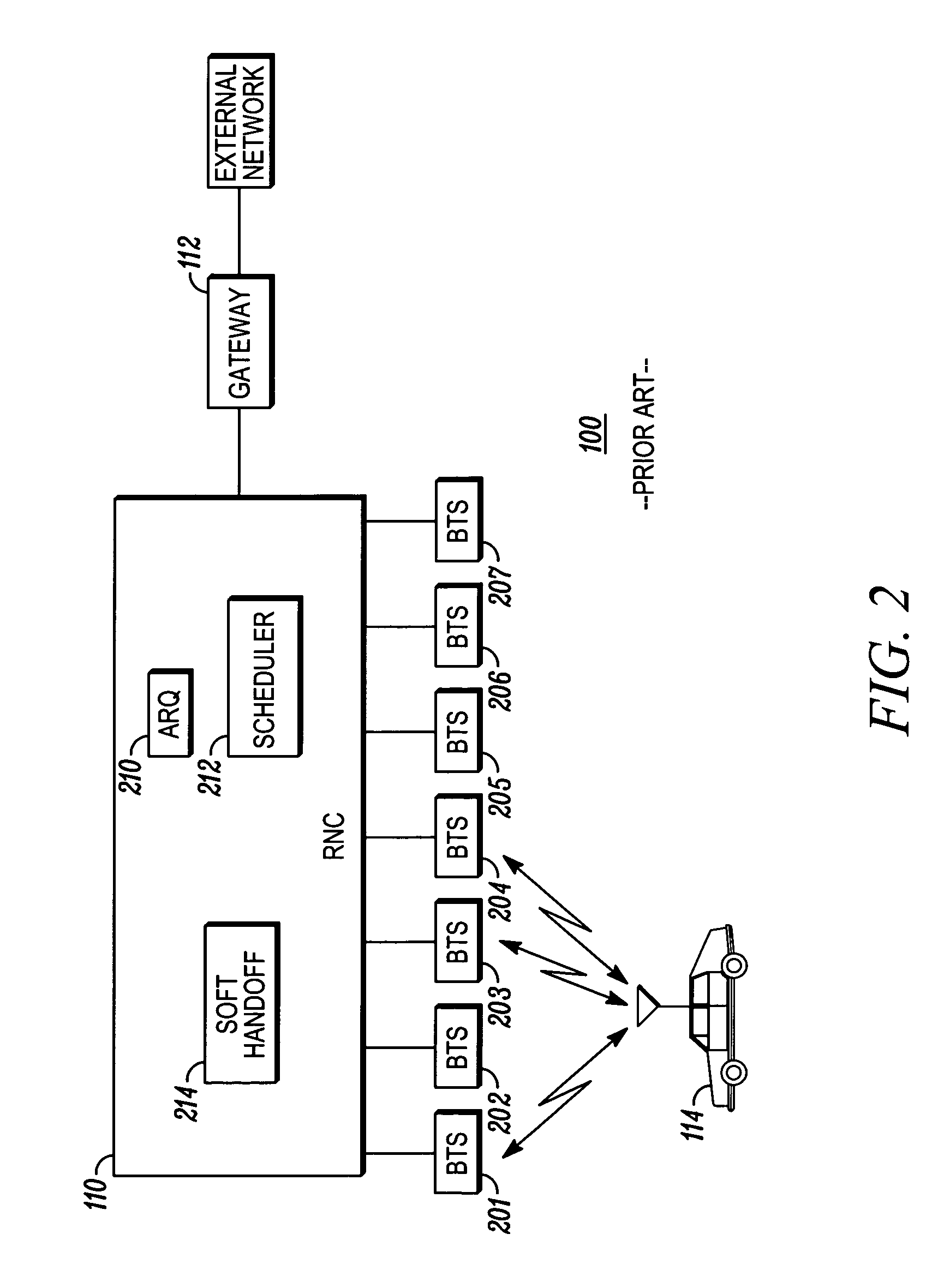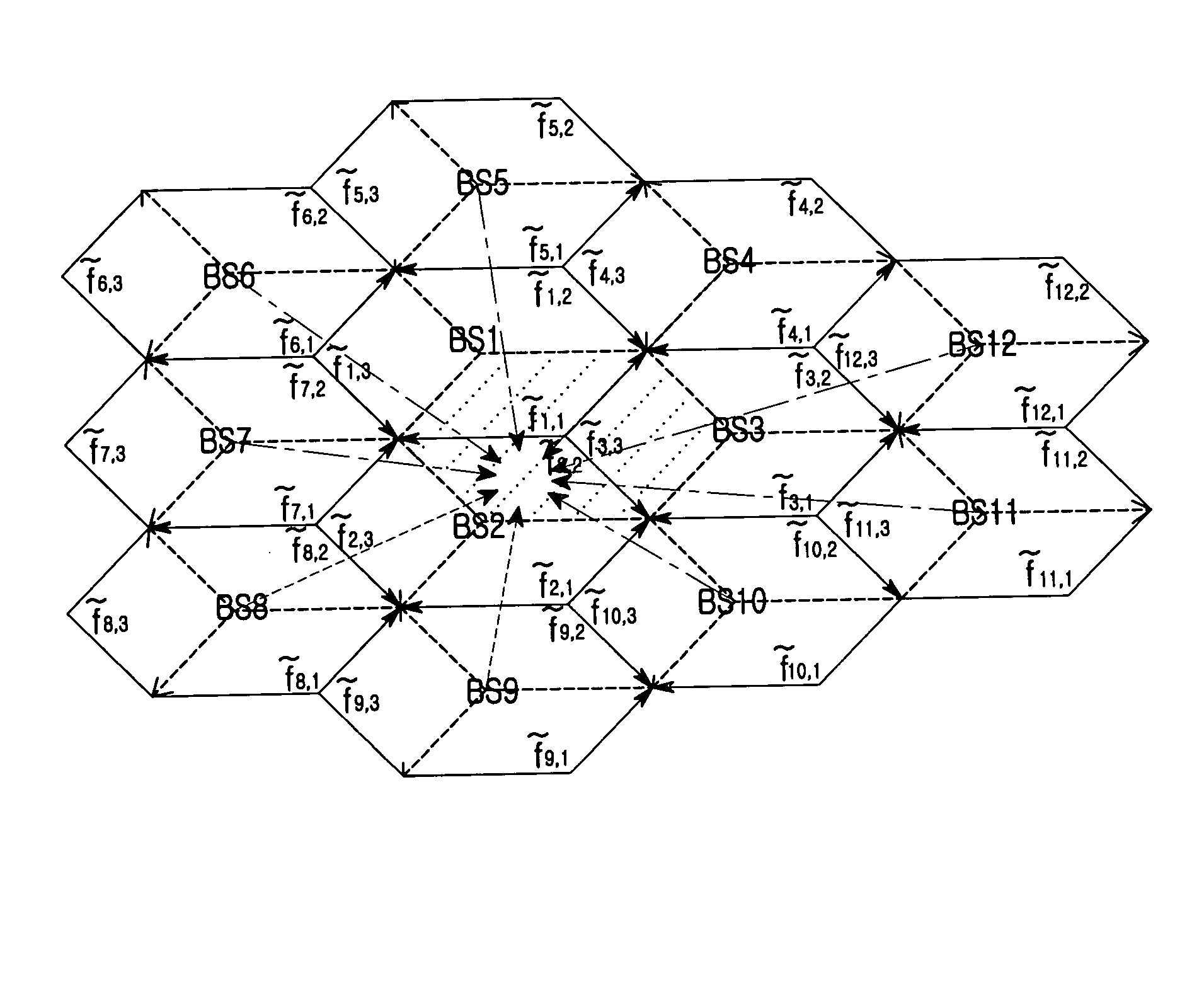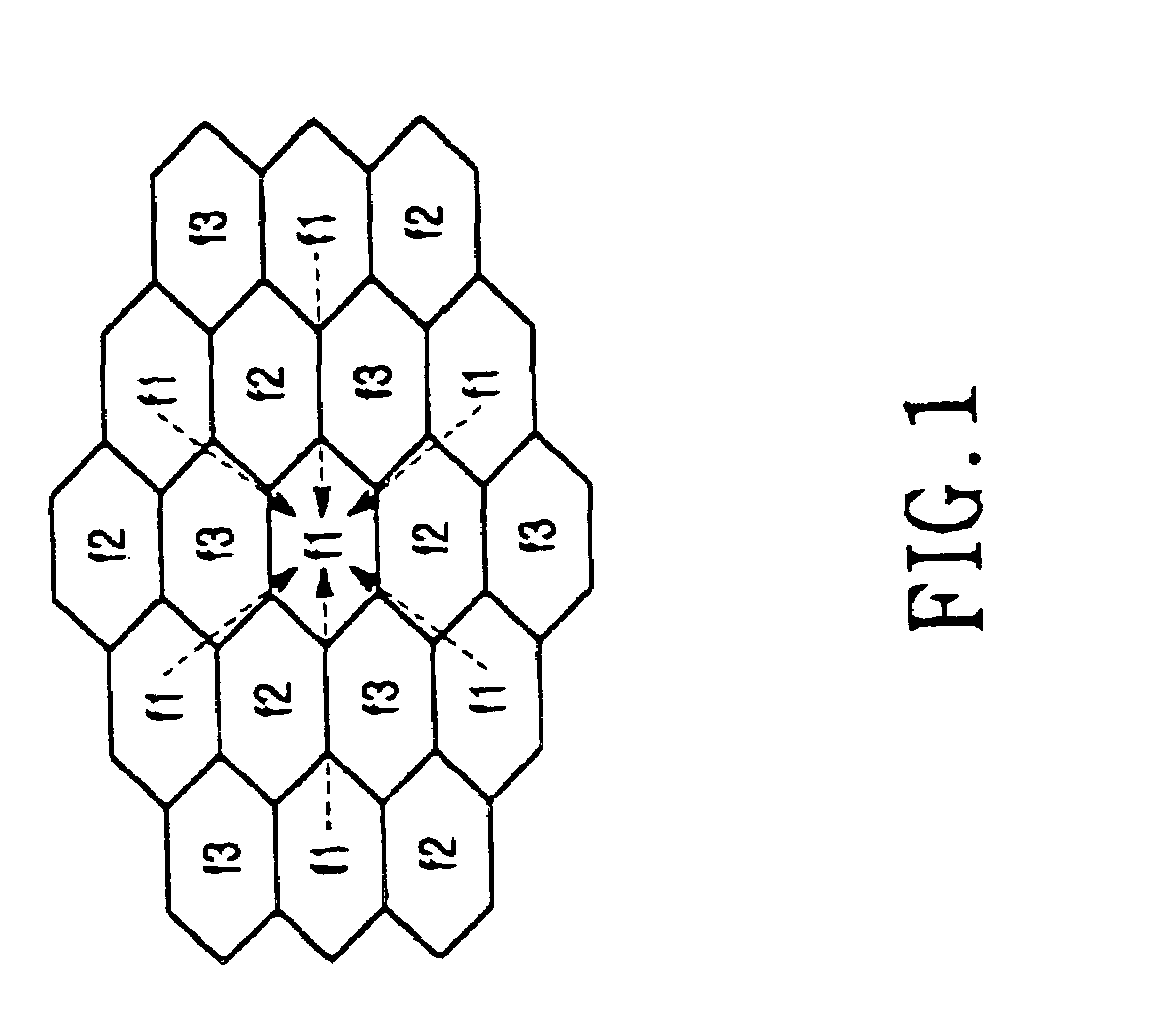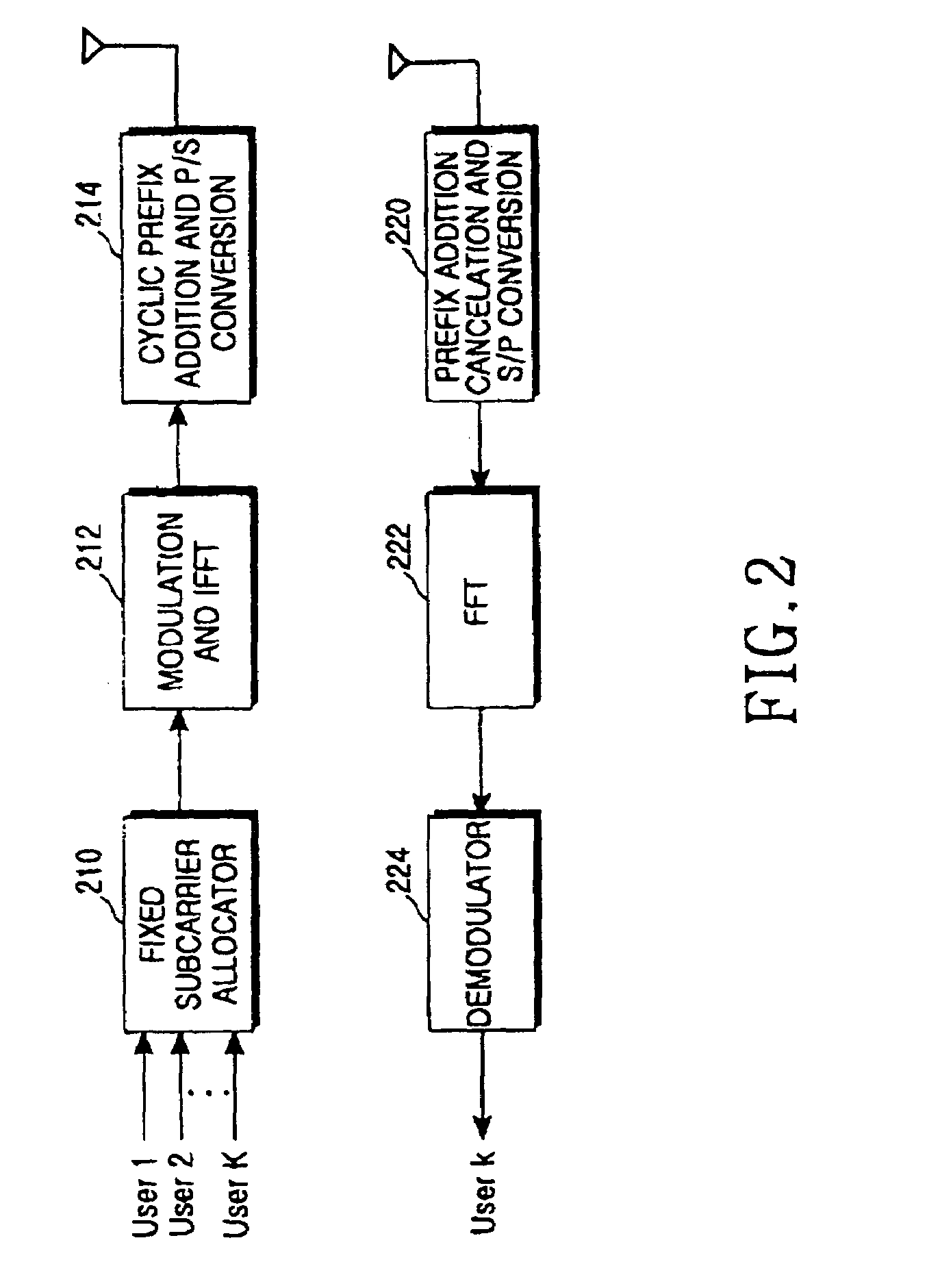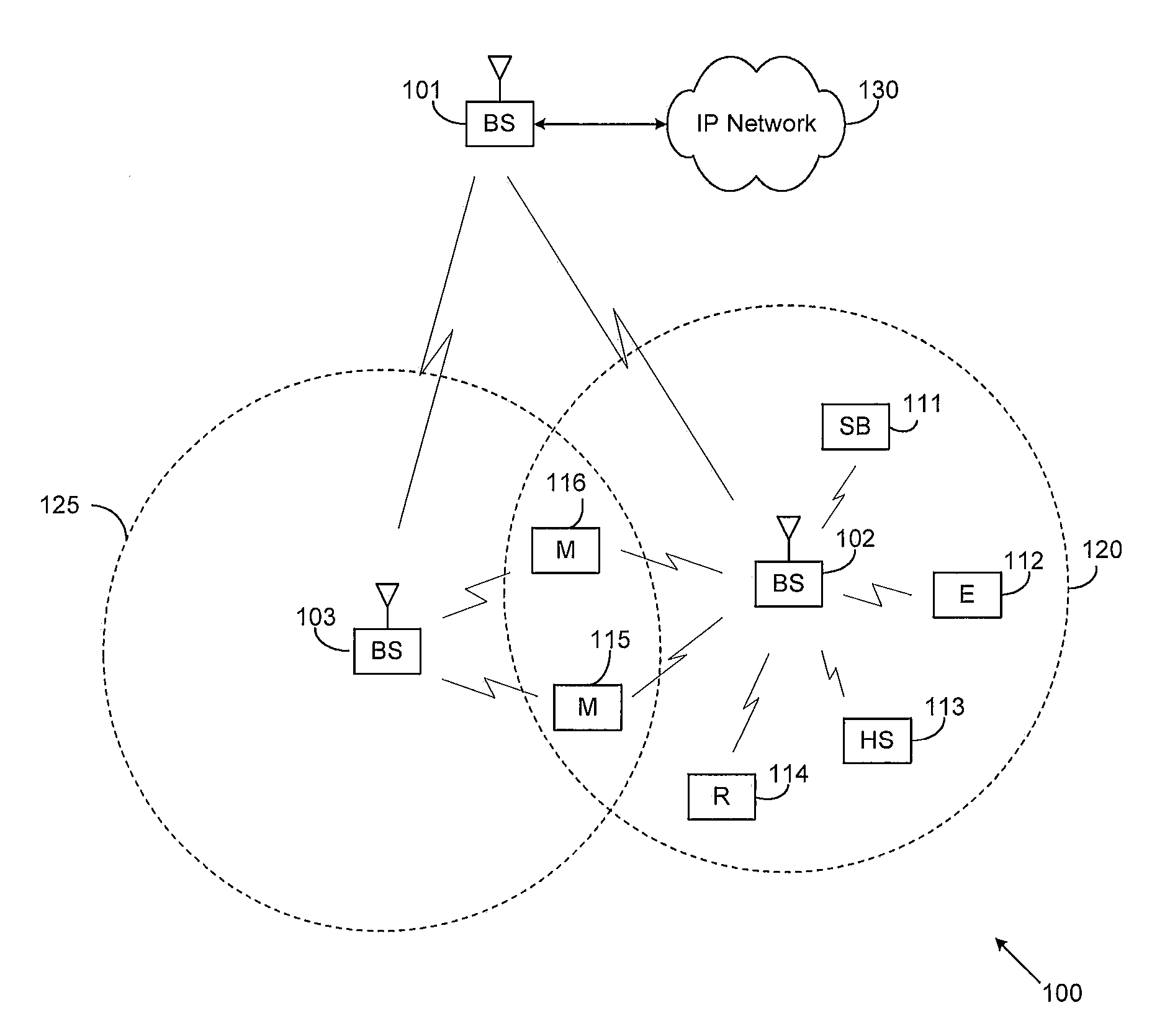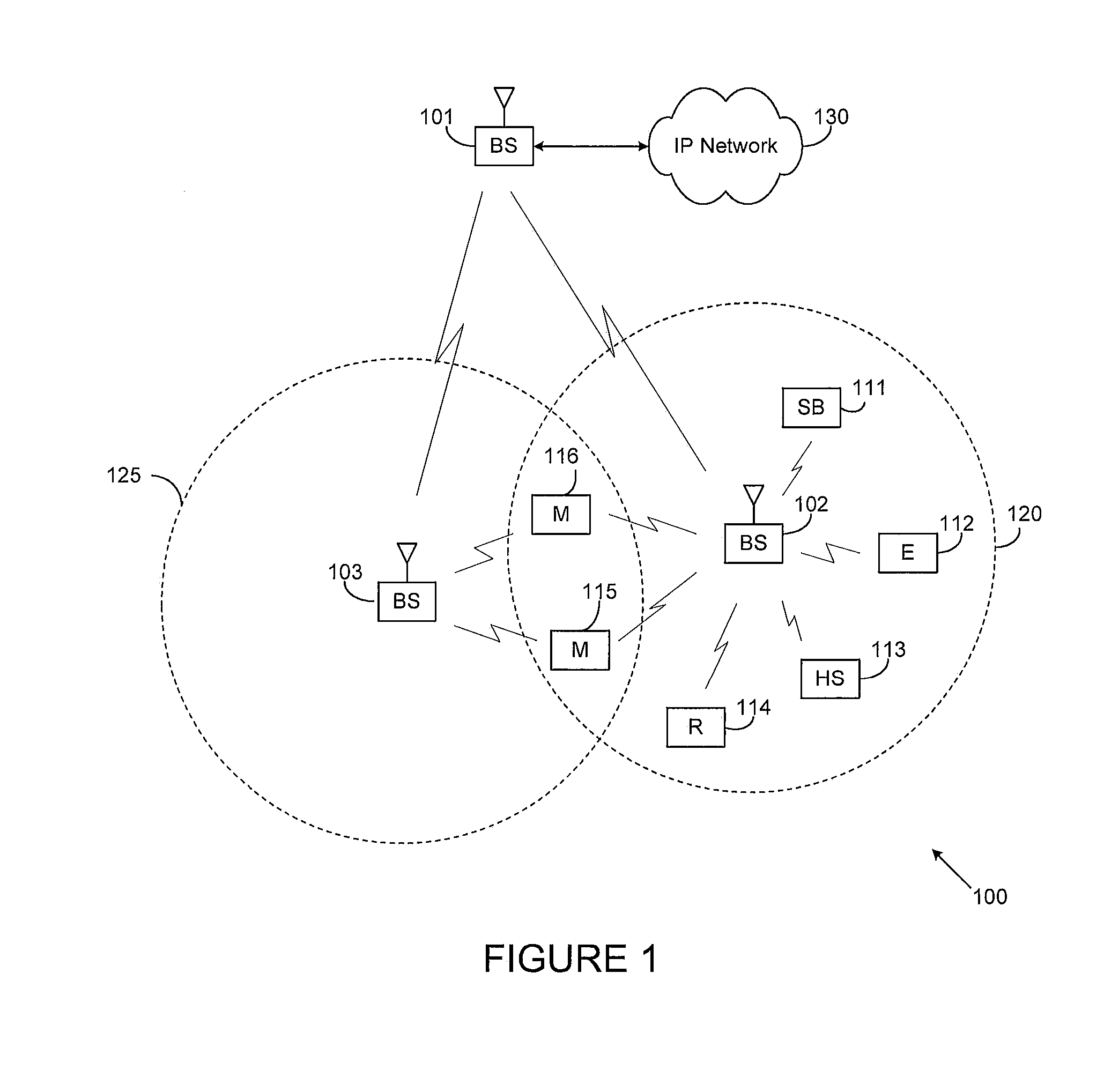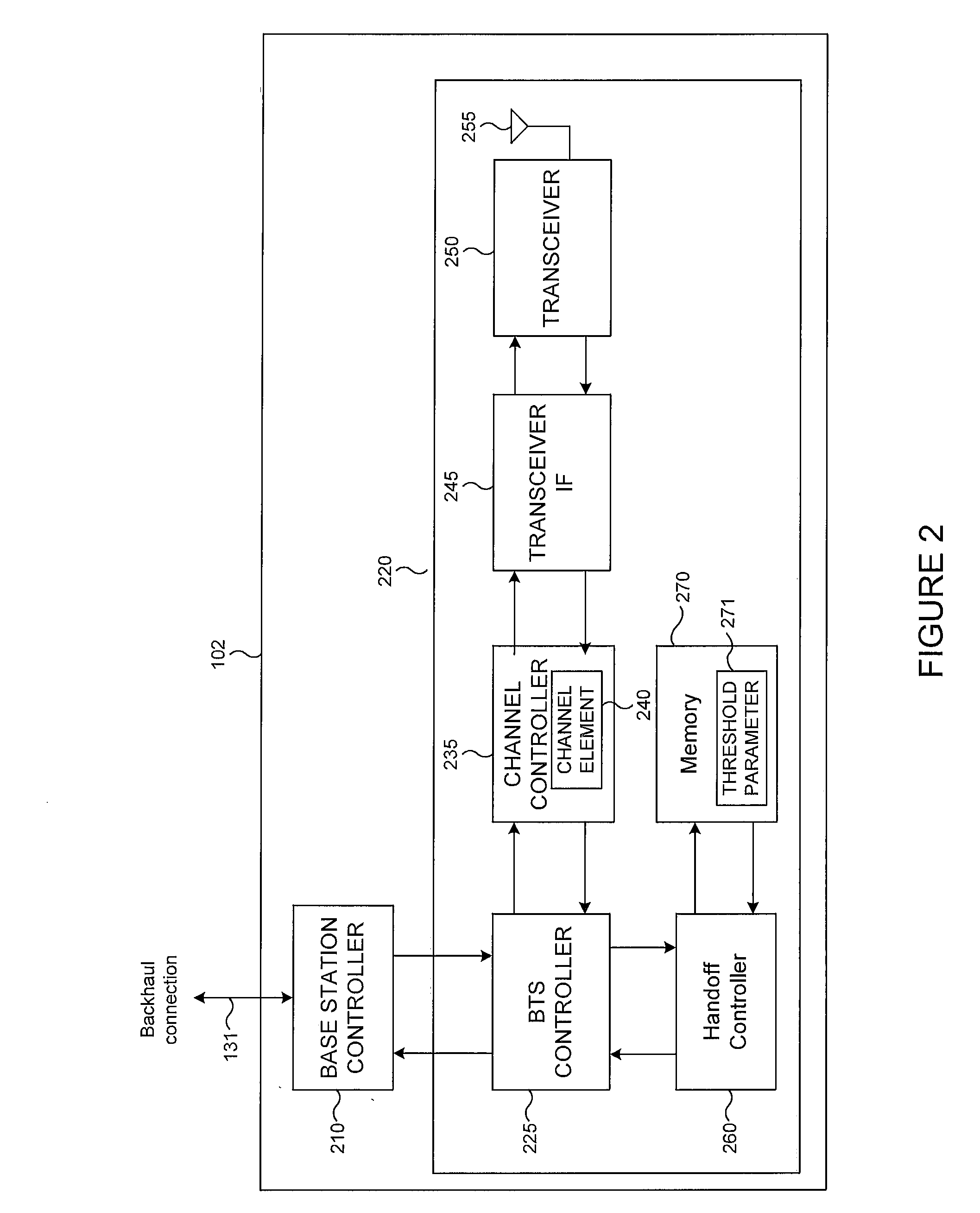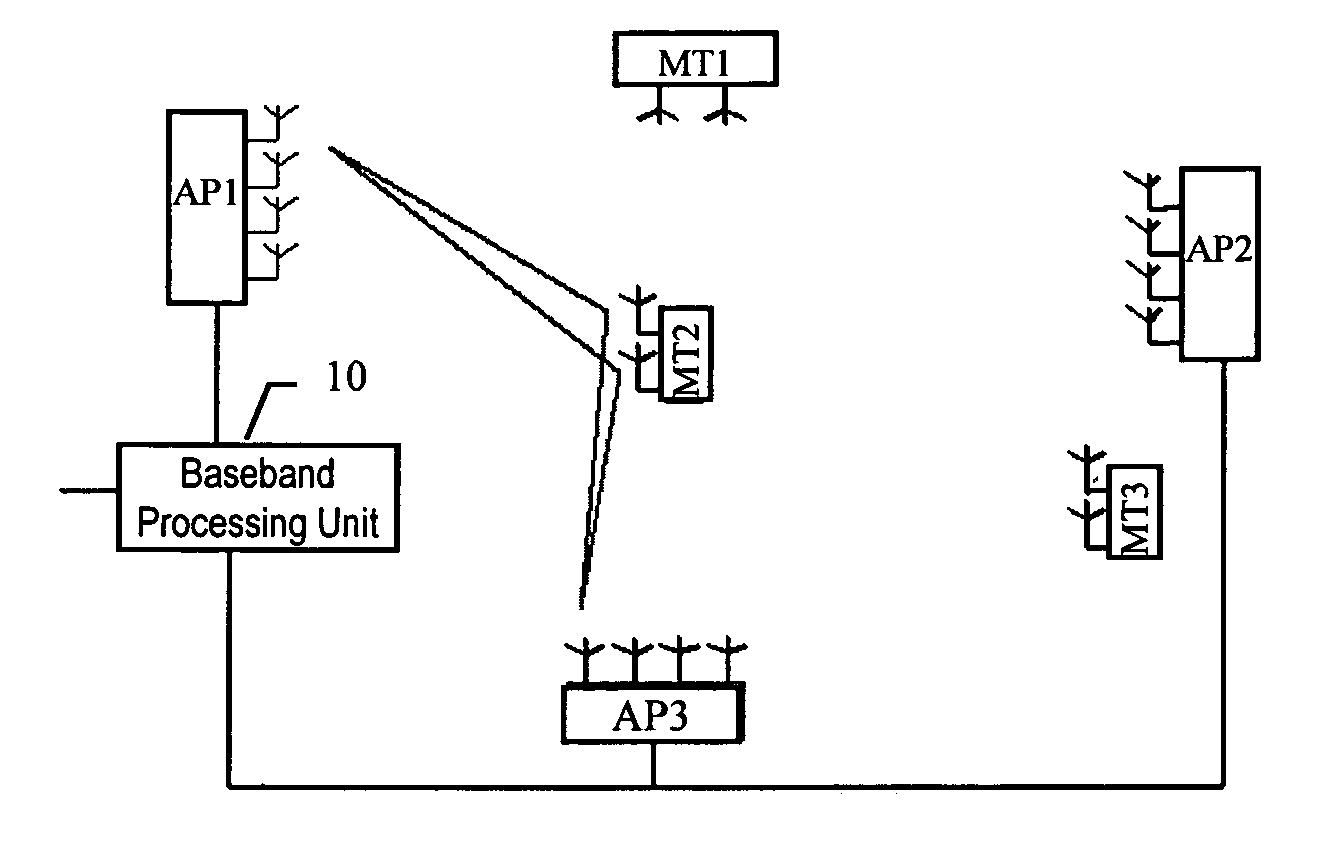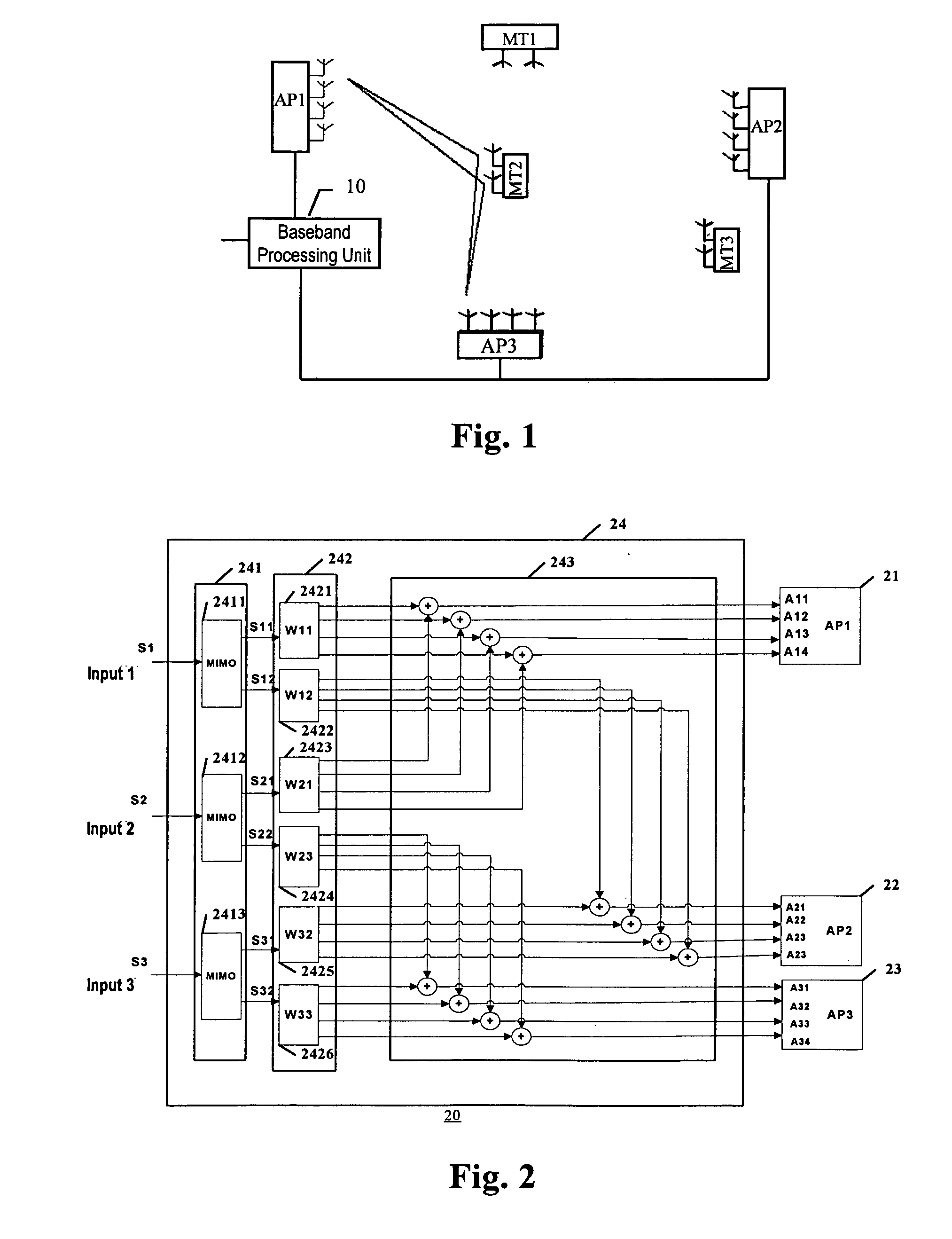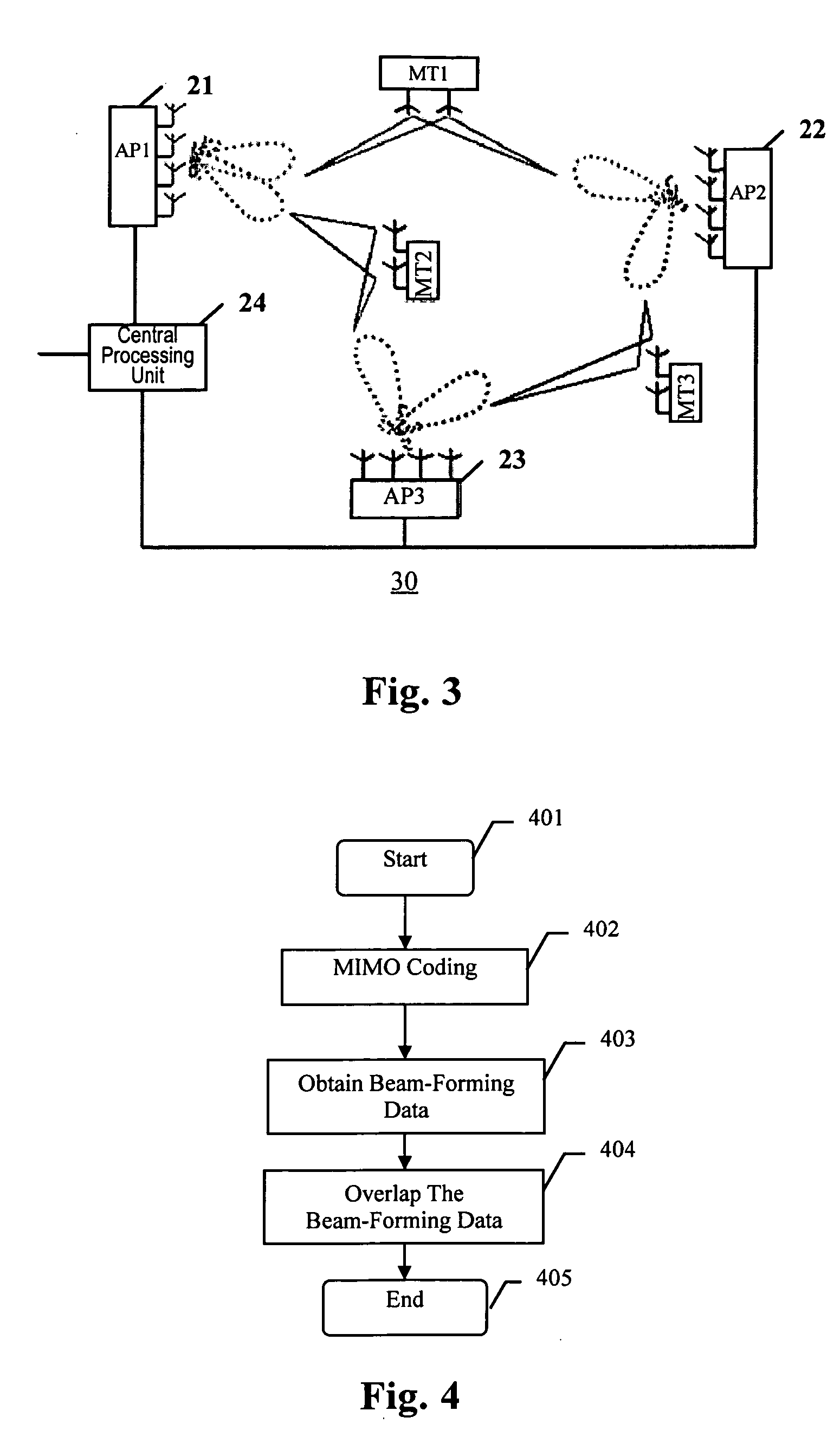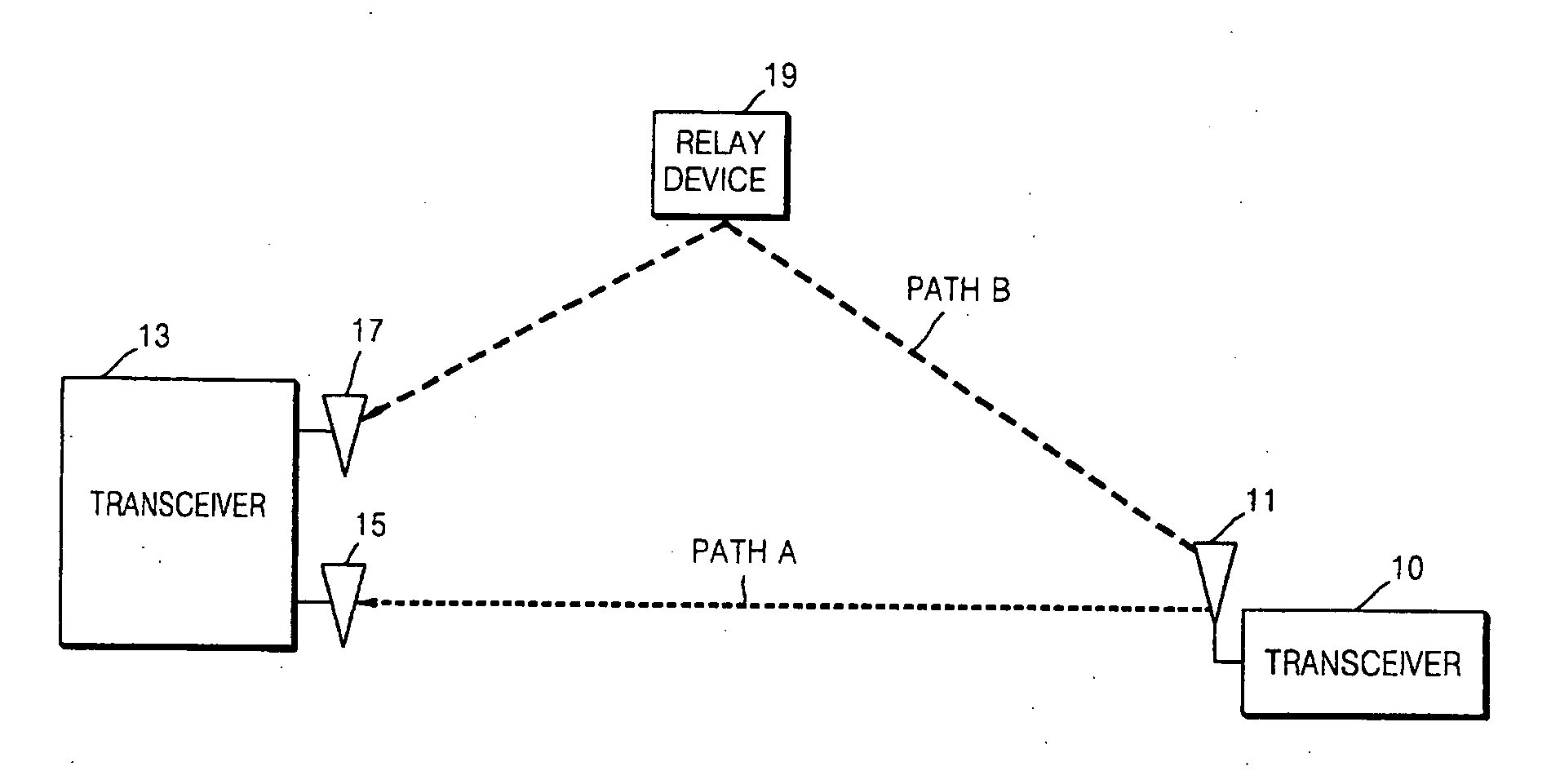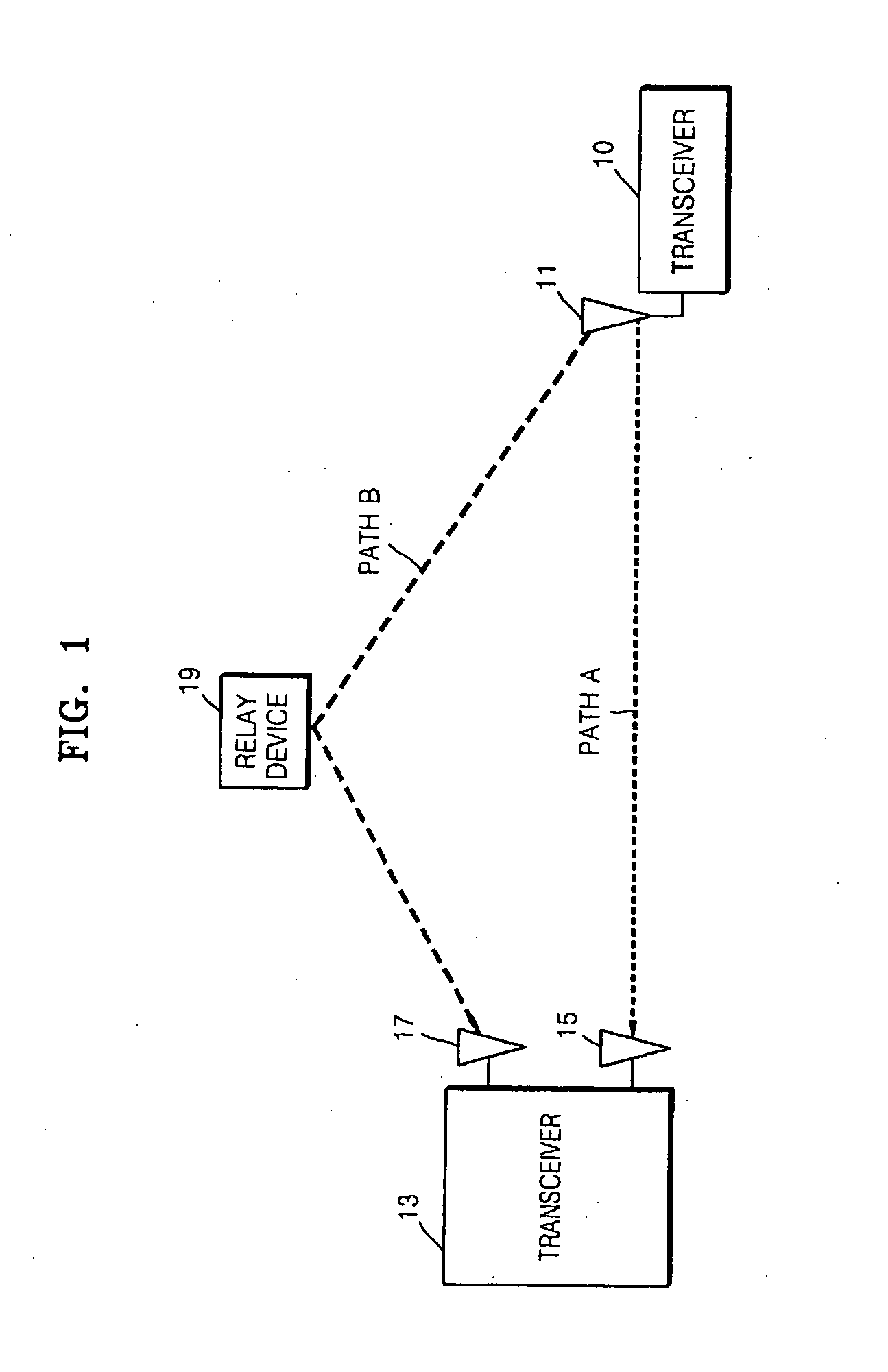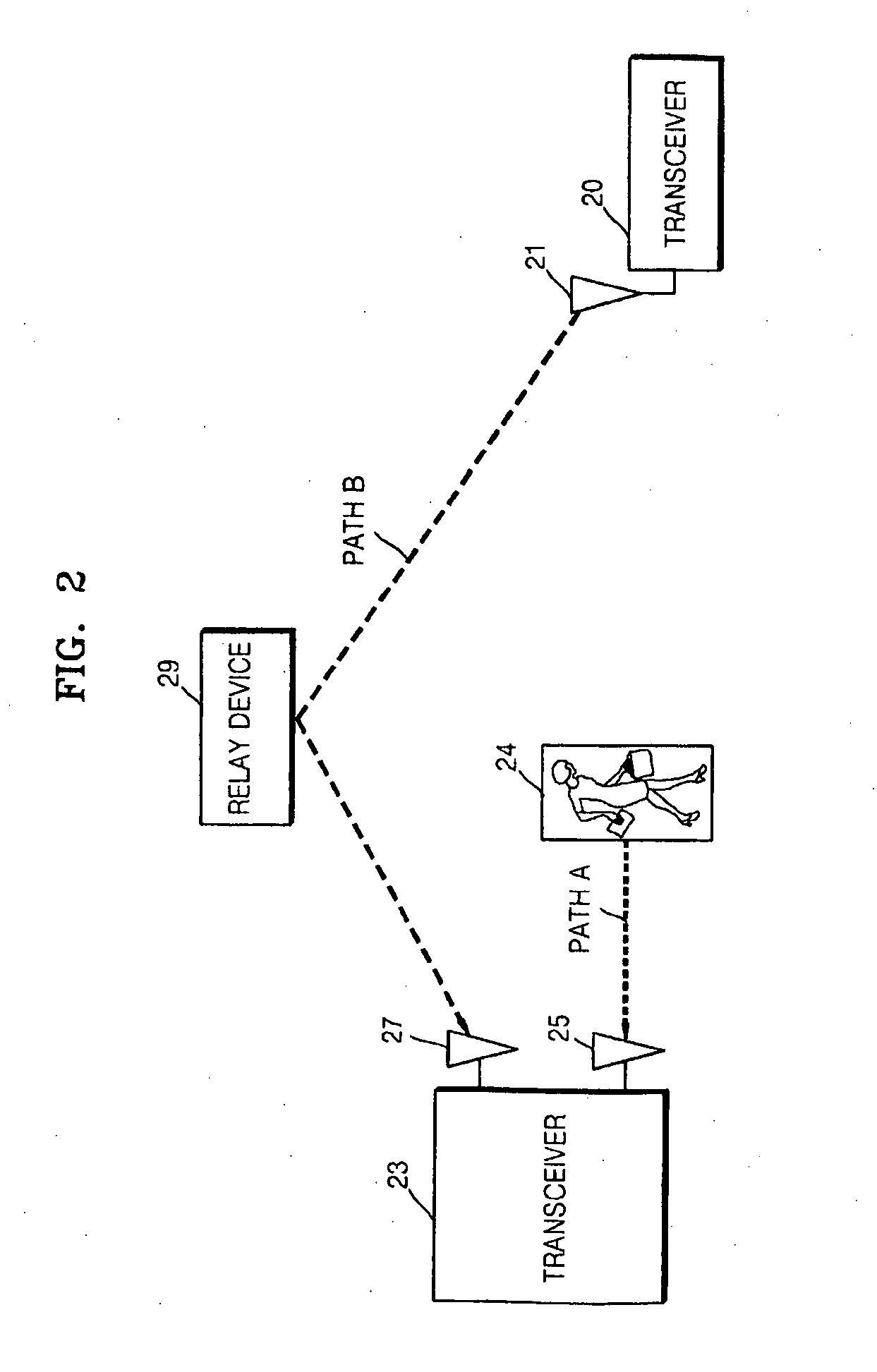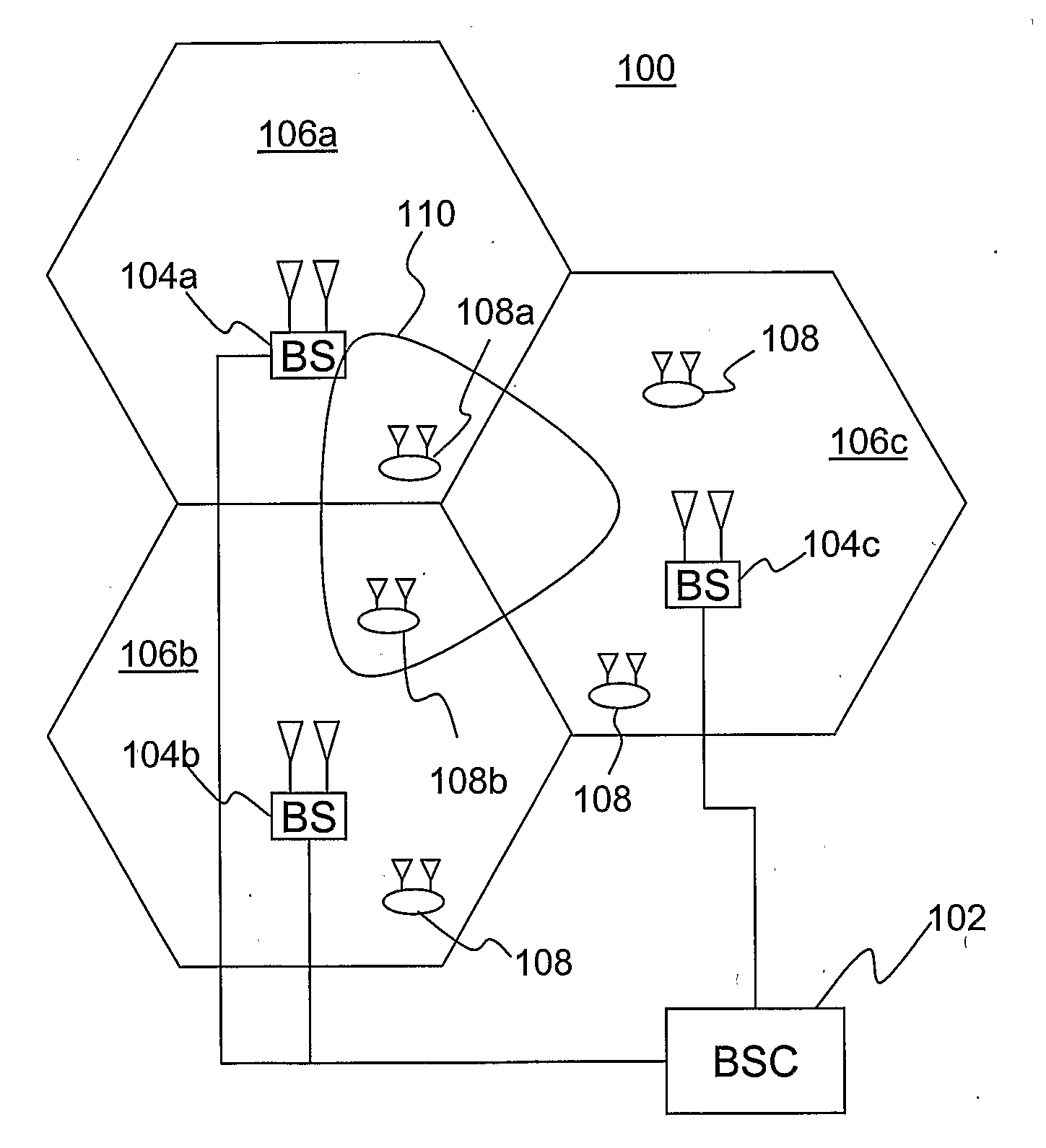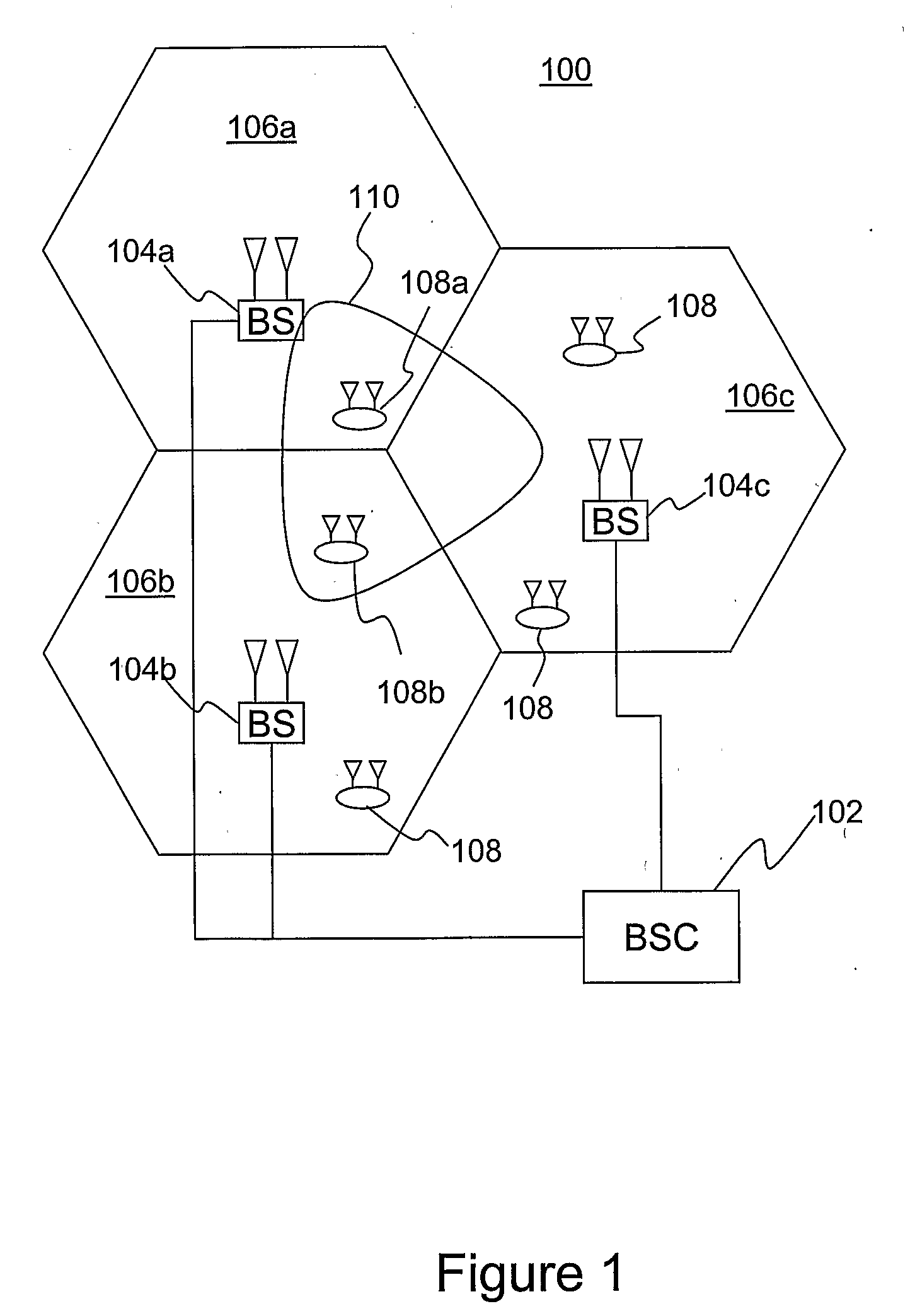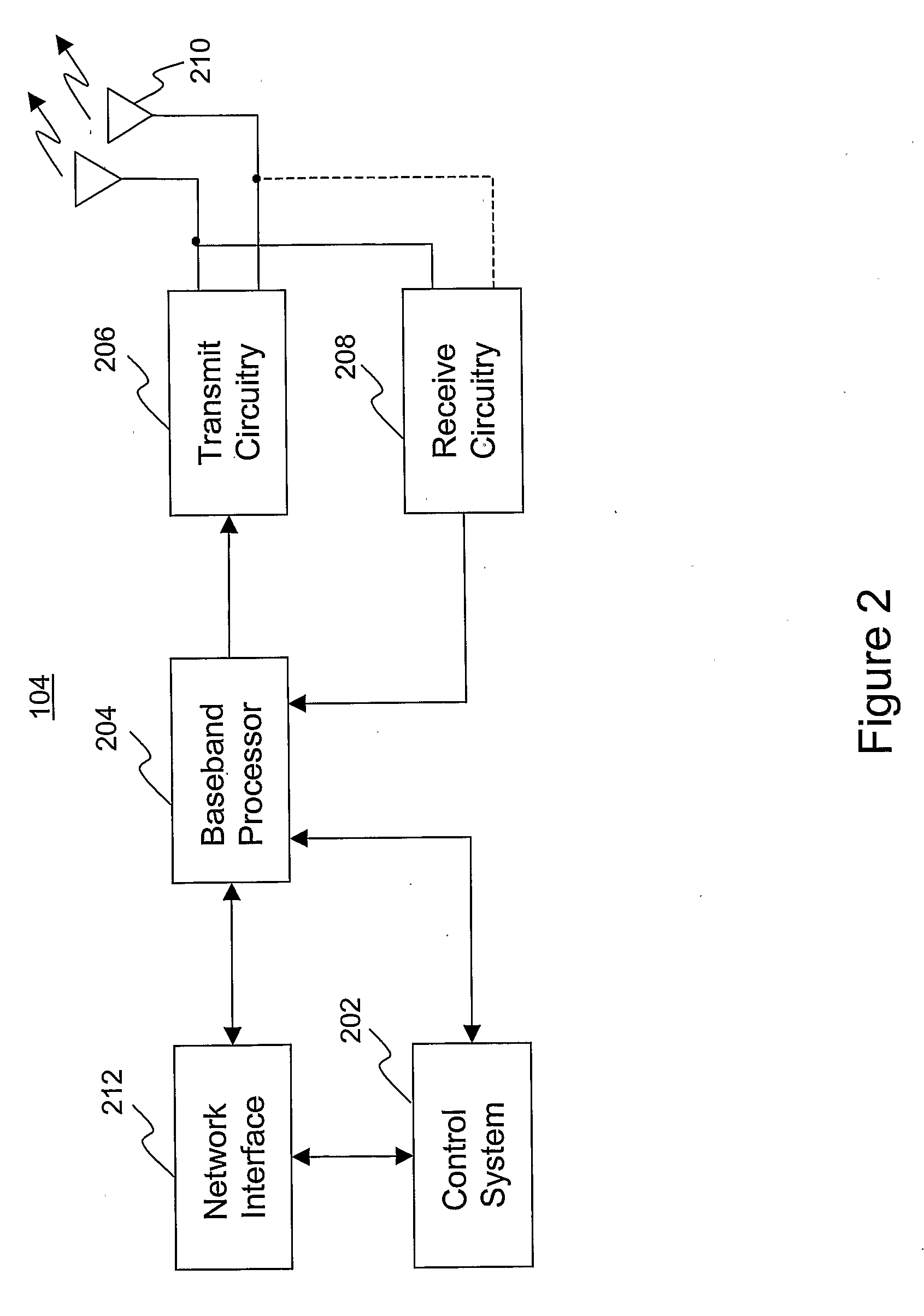Patents
Literature
4743results about "Site diversity" patented technology
Efficacy Topic
Property
Owner
Technical Advancement
Application Domain
Technology Topic
Technology Field Word
Patent Country/Region
Patent Type
Patent Status
Application Year
Inventor
System and method for DIDO precoding interpolation in multicarrier systems
ActiveUS20100316163A1Improve downlink throughputReduce distractionsSite diversityModulated-carrier systemsPrecodingTheoretical computer science
A system and machine-implemented method are described for performing precoding interpolation in a DIDO system which employs orthogonal frequency-division multiplexing (OFDM) and DIDO precoding to communicate with a plurality of distributed-input-distributed-output (DIDO) clients. For example, a system according to one embodiment of the invention comprises: selecting a first subset of ODFM tones to determine a first subset of precoding weights; deriving a second subset of precoding weights for a second subset of ODFM tones by interpolating between the first subset of precoding weights; and using a combination of the first subset of precoding weights and the second subset of precoding weights to precode a data stream prior to transmitting the data stream to a DIDO client.
Owner:REARDEN
Method and System for Dynamic Spectrum Access Using Specialty Detectors and Improved Networking
InactiveUS20100075704A1Reduce the valueReduce valueSite diversityTransmission monitoringTelecommunicationsFrequency spectrum
Methods and systems for dynamic spectrum access (DSA) in a wireless network are provided. A DSA-enabled device may sense spectrum use in a region and, based on the detected spectrum use, select one or more communication channels for use. The devices also may detect one or more other DSA-enabled devices with which they can form DSA networks. A DSA network may monitor spectrum use by cooperative and non-cooperative devices, to dynamically select one or more channels to use for communication while avoiding or reducing interference with other devices.
Owner:SHARED SPECTRUM
Multiple Rank CQI Feedback for Cellular Networks
Single user and multiuser MIMO transmission in a cellular network may be performed by a base station (eNB) transmitting either one, two, or more transmission layers. A user equipment (UE) receives a reference symbol from the base station. The UE processes the reference symbol with one or more of a plurality of precoding matrices to form a plurality of channel quality indices (CQI). The UE provides feedback to the eNB comprising one or more feedback CQI selected from the plurality of CQI and one or more precoding matrix indicators (PMI) identifying the one or more precoding matrices used to form each of the one or more feedback CQIs for two or more ranks.
Owner:TEXAS INSTR INC
Method and system for wireless communication networks using relaying
InactiveUS20050014464A1Easy to adjustCharacterization is accurate and reliableSite diversityTransmission path divisionRadio channelTransmitter
The present invention relates to wireless networks using relaying. In the method according to the present invention of performing communication in a two-hop wireless communication network, a transmitter 210, a receiver 220 and at least one relay station 215 are engaged in a communication session. The relay station 215 forwards signals from a first link between the transmitter 210 and the relay station 215 to a second link between the relay stations 215 and the receiver 220. The forwarding performed by the at least one relay station 215 is adapted as a response to estimated radio channel characteristics of at least the first link. Preferably the forwarding is adapted as a response to estimated radio channel characteristics of both the first and second link.
Owner:TELEFON AB LM ERICSSON (PUBL)
Distributed antenna system for MIMO signals
ActiveUS20110135308A1Site diversityWavelength-division multiplex systemsHybrid couplerDistributed antenna system
A distributed antenna system (DAS) includes a multiple-input and multiple-output (“MIMO”) base station configured to output at least a first and second signal, and a hybrid coupler coupled thereto, the coupler configured to receive the first and second signal from the MIMO base station on respective first and second ports and provide an output signal on at least one output port, the output signal including at least a portion of the first signal and at least a portion of the second signal. The DAS further includes a master unit communicating with the coupler and configured to receive at least the output signal, and at least one remote unit communicating with the master unit and configured to communicate the output signal to a device.
Owner:ANDREW WIRELSS SYST
Method of mobility management for mobile terminal in a heterogeneous network environment
InactiveUS20130021929A1Avoid interferenceImprove system performanceSite diversityError preventionTime informationOperation mode
A method for managing mobility of a terminal in a heterogeneous network environment is provided. According to an aspect, there is provided an operation method of a terminal receiving parameters for Coordinated Multi-point transmission / reception (CoMP) operation in a heterogeneous network environment, the operation method including, at the terminal, receiving at least one parameter among a CoMP operation mode parameter, a time information parameter regarding a time at which the CoMP operation starts, a point information parameter about points that participate in the CoMP operation, and a CoMP operation parameter, from a base station, through a layer-3 message. Therefore, it is possible to avoid an unnecessary ping-pong handover and efficiently provide service continuity.
Owner:ELECTRONICS & TELECOMM RES INST
Cooperative MIMO in multicell wireless networks
A method and system for cooperative multiple-input multiple output (MIMO) transmission operations in a multicell wireless network. Under the method, antenna elements from two or more base stations are used to from an augmented MIMO antenna array that is used to transmit and receive MIMO transmissions to and from one or more terminals. The cooperative MIMO transmission scheme supports higher dimension space-time-frequency processing for increased capacity and system performance.
Owner:ADAPTIX
Full Duplex Wireless Transmission with Self-Interference Cancellation
ActiveUS20130301487A1Error prevention/detection by using return channelSite diversitySelf interferenceWireless transmission
Two-way (full-duplex) wireless communications. Various embodiments measure interference channels and provide for interference cancellation in both analog and digital domains to mitigate self-interference. The system supports multiple clients wherein new clients can join the network asynchronously, and also supports Multiple-Input Multiple-Output (MIMO) antennas.
Owner:KHANDANI AMIR KEYVAN
Method and system for wireless communication networks using cooperative relaying
ActiveUS20070160014A1Easy to implementEliminate needSite diversityFrequency-division multiplex detailsCommunications systemControl signal
The present invention relates to relay supported wireless communication to enhance communication performance. In the wireless communication system according to the invention neighboring relay stations are arranged with substantially overlapping coverage. In the method according to the invention mobile stations makes soft association to relay stations. The mobile stations feed back the selection of relay stations and channel quality measures to the base station. The base station adapts the transmission to the relay stations based on each mobile stations reported soft associations and channel quality measures. In this way the control signaling to and from the relay stations can be very limited.
Owner:TELEFON AB LM ERICSSON (PUBL)
Soft handoff for OFDM
The present invention relates to soft handoffs in an OFDM system. Each mobile terminal measures pilot signal strengths of transmissions from adjacent base stations. If the pilot signal strength for a base station exceeds the defined threshold, that base station is added to an active set list. Each mobile terminal notifies the base stations of their active set lists. By providing the set list to the base station controller and the servicing base station, the mobile terminal identifies the sole servicing base station or triggers a soft handoff mode when multiple base stations appear on the active set list. The soft handoff mode uses a combination of scheduling and space-time coding to affect efficient and reliable handoffs.
Owner:MICROSOFT TECH LICENSING LLC
Configuring Power Distribution Within Cooperation Areas of Cellular Communication Networks
ActiveUS20140057618A1Reduce distractionsMore powerPower managementSite diversityTransmitted powerEngineering
There is provided a method for configuring a power distribution within a cellular network system. The cellular network system includes at least one cooperation area. The at least one cooperation area is defined by at least two base stations, each including at least one antenna, wherein each base station has at least one beam. The method includes configuring the base stations to transmit at a first transmit power level for providing a first receiving power level for a user equipment at a center region of the cooperation area, and configuring the base stations to transmit at a second transmit power level for providing a second receiving power level at a border region of the cooperation area, wherein the second receiving power level is lower than the first receiving power level.
Owner:NOKIA SOLUTIONS & NETWORKS OY
System And Method Of Wireless Communication Using Large-Scale Antenna Networks
A communication method uses a distributed cell-free network of spatially independent service antennas. According to the method, pilot sequences are allocated to a user population of access terminals by an allocation procedure that imposes local relative orthogonality of pilot sequences. Channel coefficients for access terminals arc determined by measuring allocated pilot sequences as received by each of the service antennas. In embodiments of the invention, the determination of channel coefficients is performed independently and the resulting channel coefficients are locally stored at the respective service antennas. At each service antenna, a processor independently uses locally stored channel coefficients to precode forward link signals or to at least partially decode reverse link signals.
Owner:RPX CORP
Distributed antenna system for MIMO communications
ActiveUS20110201368A1Site diversityPolarisation/directional diversityDistributed antenna systemAir interface
A method of deploying a distributed antenna system (DAS) is provided. The method comprises outputting first and second signals from a multiple-input and multiple-output base station (MIMO BTS) and coupling a master unit to the MIMO BTS. The method further comprises coupling first and second remote units to the master unit, the first remote unit communicating the first signal over a first air interface located within the environment at a first location, the second remote unit communicating the second signal over a second air interface within the environment at a second location. The first and second remote units are arranged at the first and second locations within the environment and configured to provide signal coverage of both the first signal and the second signal at a third location in the environment to provide the capacity for MIMO communications through the system at the third location.
Owner:ANDREW WIRELESS SYST GMBH
Method and apparatus for transmitting control information for interference mitigation in multiple antenna system
ActiveUS20100232539A1Guaranteed normal transmissionReduce overheadSite diversityOrthogonal multiplexMobile stationPrecoding matrix
A multiple antenna system including a mobile station and a base station are operable to perform a method for transmitting control information for interference mitigation. A Mobile Station (MS) can transmit control information for interference mitigation. The MS determines a first Precoding Matrix Index (PMI) and a second PMI for interference from an adjacent Base Station (BS). Based on a correlation level from correlation values between one of the first PMI and second PMI and the remaining PMIs in the codebook, the MS determines a level of a subset of PMIs, and feeds back information indicating the correlation level.
Owner:SAMSUNG ELECTRONICS CO LTD
Two-tier wireless broadband access network
ActiveUS8625547B1Quality improvementEasy to installSite diversityNetwork topologiesAccess networkWireless mesh network
A wireless access network is based on a two-tier access point (AP) structure to provide effective and efficient wireless communication into an individual home / office building. A first tier of the network utilizes “neighborhood” APs, relatively low power, and utilized to provide wireless communication with a “nanocell” boundary (e.g., 300-1000 feet). A second tier of the network utilizes a set of “network concatenation devices” (window bridge), with a separate network concatenation device at each permanent facility in the nanocell that houses wireless devices. The network concatenation device is attached to a window, for example, of a home in communication with the neighborhood AP. The network concatenation device functions as a bridge to couple to each of the wireless devices within the home. This communication is then relayed in an efficient manner between the network concatenation device and the neighborhood AP. By using a number of neighborhood APs, rather extensive wireless coverage can be obtained.
Owner:AMERICAN TELEPHONE & TELEGRAPH CO
Wireless network repeater
InactiveUS20060098592A1OptimizationQuickly reconfiguredSite diversityFrequency-division multiplex detailsCommunications systemRepeater
A frequency translating repeater (250) for use in a time division duplex radio protocol communications system includes a processor (260), a bus (261), a memory (262), an RF section (264), and an integrated station device (264). An access point (210) is detected based on information transmitted frequency channels using a protocol. Detection is initiated automatically during a power-on sequence or by activating an input device such as a button. Frequency channels are scanned for a beacon signal and an access point chosen as a preferred access point based on a metric such as power level.
Owner:QUALCOMM INC
Systems and methods to coordinate transmissions in distributed wireless systems via user clustering
ActiveUS20110044193A1Improve downlink throughputReduce distractionsSite diversityError preventionChannel state informationTransceiver
Systems and methods are described for coordinating transmissions in distributed wireless systems via user clustering. For example, a method according to one embodiment of the invention comprises: measuring link quality between a target user and a plurality of distributed-input distributed-output (DIDO) distributed antennas of base transceiver stations (BTSs); using the link quality measurements to define a user cluster; measuring channel state information (CSI) between each user and each DIDO antenna within a defined user cluster; and precoding data transmissions between each DIDO antenna and each user within the user cluster based on the measured CSI.
Owner:REARDEN
Apparatus and method for cooperative relay in a wireless communication system based on relay stations
ActiveUS8019288B2Improve signal transmission reliabilityMaximize throughputSite diversityModulated-carrier systemsCommunications systemSelf adaptive
An apparatus and method for cooperative relay in a multiple-antenna wireless communication system based on relay stations (RSs) are provided. The apparatus includes a serial / parallel converter for dividing data into N number of streams, a channel estimator for calculating a first transmission rate at which a RS performing the cooperative relay can perform decoding and a second transmission rate at which all relay stations performing the cooperative relay can commonly perform decoding, and determining transmission rates for each of the N-number streams, and an adaptive modulation and coding (AMC) unit for encoding and modulating the N-number streams according to their respective transmission rates.
Owner:SAMSUNG ELECTRONICS CO LTD +1
Wireless transmission with channel state perturbation
ActiveUS9008208B2Error prevention/detection by using return channelSite diversityWireless transmissionEngineering
Generating a channel codebook by identifying a subset of antenna configurations from a plurality of antenna configurations of an antenna associated with a transmitter by: transmitting a sequence of symbols from the transmitter to a receiver using the plurality of antenna configurations, wherein each antenna configuration provides a unique transmission characteristic to the receiver; receiving feedback from the receiver that identifies the subset of antenna configurations; and, generating channel codebook entries corresponding to the subset of antenna configurations; and, transmitting data from the transmitter to the receiver using the channel codebook.
Owner:KHANDANI AMIR KEYVAN
Method and apparatus for high throughput multiple radio sectorized wireless cell
InactiveUS20050003865A1Minimize interferenceImprove throughputSite diversitySpatial transmit diversityDirectional antennaLoad management
Methods and apparatus for high throughput wireless cells, capable of functioning as access points, are described. The wireless cells may be equipped with multiple radios to increase the amount of throughput available through a single wireless cell. Multiple antennas attached to the radios through RF switches may enable the wireless cell to service multiple clients simultaneously. The physical sectors of the antennas may overlapped to form virtual sectors that provide greater flexibility in client load management and in simultaneously servicing multiple clients. Attenuators may reduce interference from foreign wireless cells or clients. Systems and methods for assigning minimally interfering channels to either physical sectors or to radios to reduce interference between adjacent sectors and overlapping sectors are also disclosed. An antenna horn may also allow any antenna to be used as a directional antenna and may enable the antenna's angle of coverage to be adjusted. The use of multiple antennas on a client to reduce interferences is also described.
Owner:ROTANI
Method and apparatus for controlling uplink transmission power
InactiveUS8918135B2Accurate powerReduce calculationPower managementSite diversityUplink transmissionControl channel
The present description relates to a method for controlling uplink power in a distributed multi-node system, comprising the following steps: receiving reference signals from a plurality of antenna nodes containing at least one antenna; estimating average propagation loss on the basis of the receiving power of the reference signals received from the plurality of antenna nodes; receiving, via a downlink control channel, noise and interference (NI) information from a base station which contains the plurality of antenna nodes; and determining uplink transmission power using the estimated average propagation loss and the received noise and interference information.
Owner:LG ELECTRONICS INC
Method and apparatus for inter-cell interference coordination for transmission point group
The present invention relates to a wireless communication system, and more specifically to a method and an apparatus for inter-cell interference coordination for a transmission point group. The method for carrying out an interference coordination in a wireless communication system according to one embodiment of the present invention comprises a step for exchanging interference coordination messages between transmission point groups, wherein one transmission group comprises a plurality of transmission points, and the interference coordination message can comprises interference coordination information about each individual transmission point unit within the one transmission point group, and interference coordination information about the overall transmission point unit within the one transmission point group.
Owner:LG ELECTRONICS INC
Data flow transmission method and related equipment and system
InactiveCN102215530AFlexible distributionImprove service qualitySite diversityError preventionQuality of serviceData stream
The embodiment of the invention relates to the field of communication technology and discloses a data flow transmission method and a related equipment and a system, wherein the data flow transmission method comprises the following steps: a first network link and a second network link are established between a network side and user equipment; the first network is different from the second network; the user equipment associates the first network link to the second network link; and according to a scheduling algorithm, the user equipment distributes the same data flow into the first network link and the second network link for transmitting. The embodiment of the invention can realize mixed transmission with the same data flow in different networks. Compared with the existing schemes, the embodiment of the invention can carry out distributary more flexibly and improve the service quality.
Owner:SHANGHAI HUAWEI TECH CO LTD
Apparatus and method for controlling inter-cell interference
InactiveUS20160065335A1Facilitate communicationImprove throughputSite diversityCriteria allocationCommunications systemUser equipment
An apparatus and method for controlling inter-cell interference is disclosed. The user equipment for controlling inter-cell interference in a wireless communication system includes an interference level measuring module configured to measure interference levels of neighboring cells using at least one of information about the number of antennas among antennas deployed in the neighboring cells, information about indexes of the effective antennas, and information about reference signal of the neighboring cells, an interference restriction request determination module configured to compare the interference levels of the neighboring cells with a predetermined threshold and to determine whether or not UE requests an interference restriction to the neighboring cells, and a transmitter configured to transmit information about one or more neighboring cells, to which the interference restriction request will be transmitted, to a serving base station.
Owner:LG ELECTRONICS INC
Buffer occupancy used in uplink scheduling for a communication device
InactiveUS6993342B2Site diversityData switching by path configurationUplink schedulingDistributed computing
A method for using buffer occupancy in uplink scheduling for a communication device includes a first step of sending buffer occupancy information and a time stamp indicating a last transmission opportunity provided to the communication device to an active set base stations. A next step includes utilizing the buffer occupancy information and time stamp to adjust a scheduling fairness setting for the communication device. A next step includes receiving scheduling information from a scheduler in accordance with the scheduling fairness setting. A next step includes transmitting on an uplink channel in accordance with the scheduling information.
Owner:GOOGLE TECH HLDG LLC
Apparatus and method for allocating resources of a virtual cell in an OFDM mobile communication system
ActiveUS7069009B2Improve efficiencyIncrease powerEnergy efficient ICTSite diversityCommunications systemVirtual cell
A virtual cell management apparatus and method using sectors in an orthogonal frequency division multiplexing mobile communication system including a cell structure having cells each comprised of a plurality of sectors, the cells performing data communication with mobile terminals within a corresponding cell through at least one subchannel having orthogonality. The method comprises forming a virtual cell with a particular one of sectors constituting a particular cell and sectors of two other cells neighboring the particular sector; transmitting, by three base stations forming the virtual cell, an interference measurement value and a channel parameter estimation value from a mobile terminal located in the virtual cell to a base station controller that controls the virtual cell, thereby allocating wireless resource including frequency bandwidth, initial bits, subcarriers and refined bits in the virtual cell; transmitting the allocated wireless resource to the three base stations so that the base stations allocate a same subchannel to each mobile terminal located in the virtual cell; and transmitting same data over the allocated subchannel.
Owner:SAMSUNG ELECTRONICS CO LTD
COORDINATED MULTIPOINT (CoMP) JOINT TRANSMISSION USING CHANNEL INFORMATION FEEDBACK AND HIGHER RANK DEDICATED BEAM-FORMING
A subscriber station is provided. The subscriber station comprises a receiver configured to listen for downlink control information for coordinated multipoint (CoMP) joint transmission only from an anchor cell, and to receive the downlink control information for CoMP joint transmission from the anchor cell.
Owner:SAMSUNG ELECTRONICS CO LTD
Distributed base station, communication system, and signal transmission method thereof
ActiveUS20070093273A1Reduce distractionsIncrease system capacitySite diversityMultiplex communicationCommunications systemWeight coefficient
The present invention discloses a distributed base station serving mobile stations, which comprises multiple antenna-RF processing units and a central processing unit remotely connected with said multiple antenna-RF processing units. Each of the antenna-RF processing units has an antenna array formed by multiple antennas. Said central processing unit comprises: an MIMO coding unit for MIMO coding of data of each of the mobile stations so that data of each of the mobile stations generates multi-path data symbols; a beam-forming unit for multiplying each path data symbol of the multi-path data symbols of each of the mobile stations by a weighted coefficient vector corresponding to this path data symbol, to obtain beam-forming data of each path data symbol of each of the mobile stations; and an overlapping unit for, with respect to each antenna in said antenna-RF processing units, overlapping beam-forming data of the respective mobile stations for this antenna and feeding the overlapped beam-forming data to this antenna for transmission. The present invention further discloses a communication system having the above distributed base station and the corresponding signal transmission method.
Owner:ALCATEL LUCENT SAS
Apparatus and method of data transmission and reception using multi-path
Provided are a method and apparatus for transmitting / receiving data by using a multi-path. The multi-path is established between two transceivers, data is transmitted via each path at a predetermined time, a data receipt acknowledge control signal ACK of each path is received, and a path by which the data receipt acknowledge control signal ACK is not received is determined. Therefore, the path by which the data receipt acknowledge control signal ACK is not received is not used any further but data is transmitted via a path by which the data is previously transmitted, so that the data can be transmitted even if a line of sight (LOS) of the two transceivers comprising a directional antenna is blocked by a person or an obstacle.
Owner:ELECTRONICS & TELECOMM RES INST
Soft handoff in Ofdma system
ActiveUS20090129334A1Increase frequency diversityBroaden the use of channelsSite diversitySpatial transmit diversityCarrier signalSoft handover
The soft handoff in an OFDMA system. If the pilot signal strength for a base station exceeds the defined threshold, the base station is added to an active set list. Subcarriers in a plurality of orthogonal frequency division multiplexing (OFDM) symbols are divided and allocated into subchannels. The OFDM symbols are divided and multiplexed. A soft handoff zone with a first dimension of the subchannels and a second dimension of the divided and multiplexed OFDM symbols is defined. The soft handoff zone have subcarriers with a subchannel definition, for example, an identical permutation.
Owner:APPLE INC
Popular searches
Features
- R&D
- Intellectual Property
- Life Sciences
- Materials
- Tech Scout
Why Patsnap Eureka
- Unparalleled Data Quality
- Higher Quality Content
- 60% Fewer Hallucinations
Social media
Patsnap Eureka Blog
Learn More Browse by: Latest US Patents, China's latest patents, Technical Efficacy Thesaurus, Application Domain, Technology Topic, Popular Technical Reports.
© 2025 PatSnap. All rights reserved.Legal|Privacy policy|Modern Slavery Act Transparency Statement|Sitemap|About US| Contact US: help@patsnap.com
